Feb 27
Mar 17
Apr 2

Home > About > News & Announcements

On May 5, 2025, the Trump Administration ended a pause on involuntary collections of federal student loans that are in default. This pause was put into place during the COVID-19 pandemic. Residents with loans in default could have federal income tax refunds taken, a portion of their wages garnished, or their Social Security benefits reduced.
The Office of the Massachusetts Attorney General (AGO) has resources and information available to guide borrowers on managing their loans. Crucial information from this page is highlighted and linked below.
Massachusetts residents with student loans should check to ensure their loans are not in default or delinquent.
What if I am at risk of defaulting on my student loans?
Borrowers at risk of default should act immediately by contacting your loan service provider. A new company may be servicing your loans, as many loans changed servicers during the pandemic. Your studentaid.gov account will identify your servicer’s name and contact information.
Your loan servicer’s role is to recover payment, and you must advocate for options that meet your own needs.
What if I have questions or concerns about my loan servicer’s conduct or tactics?
If you live in Massachusetts and have a complaint against a student loan servicer, you can file a Student Loan Help Request with the Attorney General’s Ombudsman’s Student Loan Assistance Unit.
What if I have already defaulted on my student loans?
If you have already defaulted on your student loans, your two options are rehabilitation or consolidation. Learn more about these options here.
Beware of Scams
Look out for companies asking you to pay “enrollment,” “subscription,” or “maintenance” fees to enroll you in a federal repayment plan or forgiveness program. Borrowers do not have to pay to receive help with loan services, including consolidating federal student loans or applying for an income-driven repayment plan. Your student loan servicer can help you with this for free.
Never give your personal information (like your FSA ID and password, social security number, bank account information) or money to unidentified callers, or to a link provided via text or email. If you are suspicious of a company contacting you, contact your current servicer. More tips on spotting scammers can be found on the Consumer Financial Protection Bureau’s fraud and scams page.
Resources
In addition to the resources listed on the AGO’s website, The Institute of Student Loan Advisors Corporation (TISLA) offers free student loan advice.
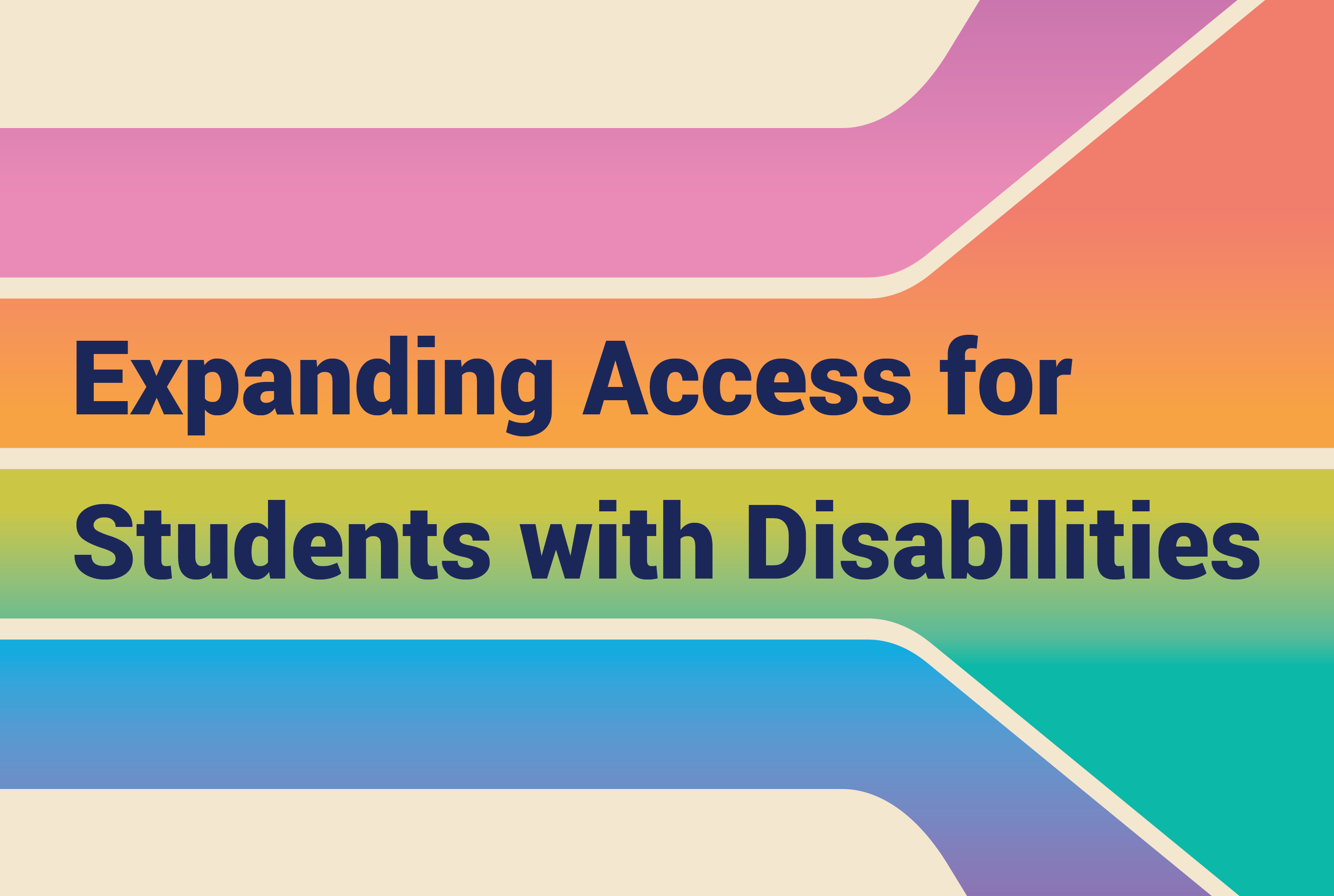
The proposed regulations establish a comprehensive model of services, titled Massachusetts Inclusive Postsecondary Education Initiative (MAIPSE), to continue support for individuals age 18 to 22 with severe disabilities and expand programming to individuals 22 and over. These regulations define expectations for MAIPSE programs at public colleges and universities and for individuals’ plans for successful participation in college. They also include reporting requirements for campuses
“Students of all abilities deserve opportunities to broaden their horizons and expand their skillset,” said Governor Maura Healey. “I’m proud that we are one major step closer to opening doors for more residents of Massachusetts to have lifechanging experiences on our public campuses.”
“These proposed regulations will lift barriers for students who were previously unable to access the college experience,” said Lieutenant Governor Kim Driscoll. “I’m grateful to the state leaders, advocates, and members of our education community for their work exploring how to ensure the success of these expanded inclusive opportunities.”
Today’s proposed regulations were informed by a diverse task force, co-chaired by the Department of Higher Education (DHE) and Department of Developmental Services (DDS), that has been meeting over the past two years. This group includes individuals representing public higher education institutions; the Department of Elementary and Secondary Education; MassAbility and other state agencies serving adults with disabilities; representatives from K-12 school districts; and several advocacy groups. The legislatively mandated task force evaluated needs related to student housing, transportation, socialization, costs, and funding.
“Inclusive postsecondary education opportunities have been transformational for students,” said Secretary of Education Dr. Patrick Tutwiler. “I want to thank DHE, DDS and the entire task force for their important work to see that today’s proposed regulations are deeply informed by those with first-hand experiences serving students with severe disabilities.”
“I want to thank those who dedicated their time and knowledge to this work, including our public campuses who have been instrumental in paving the way for more inclusive opportunities,” said Commissioner of Higher Education Noe Ortega. “These inclusive postsecondary education opportunities allow more students to experience the personal, academic, career, and social growth that our public institutions of higher education offer.”
“DDS was thrilled to partner with the Board for Higher Education and the Healey-Driscoll Administration on updates to these important regulations,” said Acting Commissioner of Developmental Services Sarah Peterson. “Offering opportunities for individuals with disabilities to be meaningfully engaged in their communities in ways that reflect their interests, goals, and capabilities, including pursuing higher education, is core to the work and mission of DDS. We thank the many stakeholders who informed these regulatory changes and look forward to supporting our public colleges and universities in these important efforts moving forward.”
The task force and proposed regulations stem from the state’s fiscal year 2023 budget that required all Massachusetts public undergraduate colleges and universities be prepared to offer opportunities for students 18 and over with severe disabilities who are otherwise not able to achieve the underlying competency determinations needed to secure a high school diploma. Under the 2023 law and these implementing regulations, such students can participate in courses as non-matriculating students with their nondisabled peers and engage in other aspects of campus life. Prior to 2022, these opportunities were limited to students ages 18-22.
“Our public higher education institutions have a long history of being places of opportunity for those who previously lacked access to college,” said BHE Chair Chris Gabrieli. “I’m proud that by advancing these regulations on inclusive postsecondary opportunities, our Board, the Commonwealth and our campuses are once again lifting barriers for more students to access college experiences.”
The public comment period begins on January 31, and the MAIPSE regulations, along with information about how to provide feedback, will be available at https://www.mass.edu/bhe/review.asp. After the conclusion of the public comment period, BHE will hold a final vote on the draft regulations at an upcoming board meeting.

August 14, 2024—Commissioner of Higher Education Noe Ortega addressed fellow state higher education leaders at the August 2024 convening of the State Higher Education Executive Officers Association (SHEEO). The annual policy conference highlights issues critical to strengthening state systems of public higher education across the country.
Commissioner Ortega joined other experts to discuss the value of a college education, socio-economic upward mobility, and several consumer protection initiatives, including protecting students from precipitous closures and from institutions that deliver a high cost and low-quality education experience. He drew on Massachusetts’ strength in higher education access and quality to share views on three panel discussions:
Commissioner Ortega highlighted the Commonwealth’s historic new investments in state financial aid programs, including MassReconnect, MassEducate and MASSGrant Plus. Massachusetts now offers residents free tuition and fees at community colleges regardless of age or income level, and free tuition and fees at all of its public four-year universities for low-income students. And Massachusetts has reduced costs at four-year public universities for middle-income students as well.
Commissioner Ortega also highlighted Massachusetts’ landmark Financial Assessment and Risk Monitoring (FARM) law, a model that has received national interest from counterparts looking to protect students from sudden college closures. The FARM law allows the state to play a consumer protection role when colleges close or merge, in part through monitoring finances and requiring contingency plans so that students can transfer with minimal loss of time and credits. The process is meant to avoid precipitous closures and ensure multiple options for students when a closure does occur amid a shifting higher education landscape.
“Learning from the experiences of colleagues nationally is essential to our work in Massachusetts, and we are also among the leading states in areas like free community college and increases in state financial aid, as well as consumer protection,” said Ortega. “As Massachusetts builds on last year’s historic financial aid investments, we have momentum toward creating an equitable system of higher education that can ensure success for all students.”
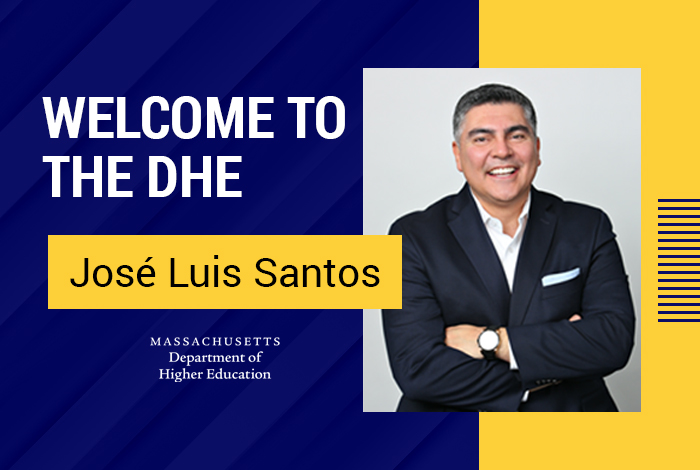
Dr. Santos comes to the Department as an accomplished higher education equity-centered professional with extensive experience leading innovative projects and teams across the education technology, public policy, nonprofit, and academic sectors. He has held positions at a number of prestigious higher education institutions, including the University of Texas, Austin, Pepperdine University, UCLA, and the University of Arizona.
Dr. Santos most recently held an appointment as a Visiting Scholar, Educational Leadership and Policy, The University of Texas at Austin. Previously, Dr. Santos was the Vice President & Team Lead, Program Strategy at edX, whose parent company is 2U, Inc., a publicly traded global platform company, where he provided global executive leadership for all online/hybrid degree programs and alternative credentials – leading the team that provided academic strategy and educational innovation consulting services to help universities and corporations advance digital transformation strategies to meet learners’ needs.
Prior to his work at edX, Dr. Santos led the higher education portfolio for a public policy advocacy organization in Washington, DC as the VP of Higher Education Policy and Practice at The Education Trust – where he worked at the highest policy levels. He oversaw all aspects of the organization’s higher education work, was the public face and spokesperson for higher education matters where he fielded numerous interviews in English and Spanish with major national and international (Univision) media outlets, writing press statements, commenting on proposed legislation and proposed budgets from the White House and Congress, and provided intellectual leadership in setting state and federal policy priorities strategy – advancing an equity agenda to improve access, affordability, completion, and post-enrollment success for low-income students and students of color. He provided Capitol Hill Briefings, worked with Congressional staffers on both sides of the aisle – providing technical assistance on legislative language for bills.
Dr. Santos served as associate professor in the Learning Technologies and Organizational Leadership programs in the Graduate School of Education & Psychology at Pepperdine University where he also taught in various learning modalities. Before that, he was an assistant professor (tenure-track) in the Higher Education & Organizational Change division at UCLA’s School of Education & Information Studies, where he was an affiliated scholar of the Higher Education Research Institute and an affiliated faculty member of the Chicano Studies Research Center. Prior to joining the faculty at UCLA, he served as founding executive director of the Latina/o Policy Research Initiative, assistant director of the Office of Institutional Equity, and senior institutional researcher of University Analytics & Institutional Research at the University of Arizona.
His work and op-ed pieces have been featured in top circulation publications such as USA Today, The New York Times, The Huffington Post, The Chronicle of Higher Education, Diverse Issues in Higher Education, Education Week, and The Hechinger Report. His scholarly work has been published in top-tiered education journals such as Educational Policy, The Journal of Higher Education, The Review of Higher Education, and Research in Comparative and International Education. His work on college access and affirmative action was filed in the brief of the Law School Admission Council as amicus curiae in support of the University of Austin, et. al., in the US Supreme Court case, Abigail Noel Fisher v. University of Austin, et. al.
Dr. Santos is a first-generation post-traditional college student who is the son of migrant farmworkers who immigrated to the US from México. He is also a Veteran who served honorably in the U.S. Marine Corps as a Corporal and Naval Midshipman 1st Class (Marine Corps Option) while in college. He served aboard the USS Comstock (LSD) where he participated in Operation Fiery Vigil – a humanitarian effort to relieve the devastation of the eruption of Mt. Pinatubo in the Philippines. He also served during Operation Desert Shield/Desert Storm.
Dr. Santos earned his B.A. in Mexican American Studies, M.A. in Educational Psychology: Measurement & Research Methodology, and Ph.D. in Higher Education Economics and Finance Policy: Econometrics and Measurement & Research Methodology at the University of Arizona.
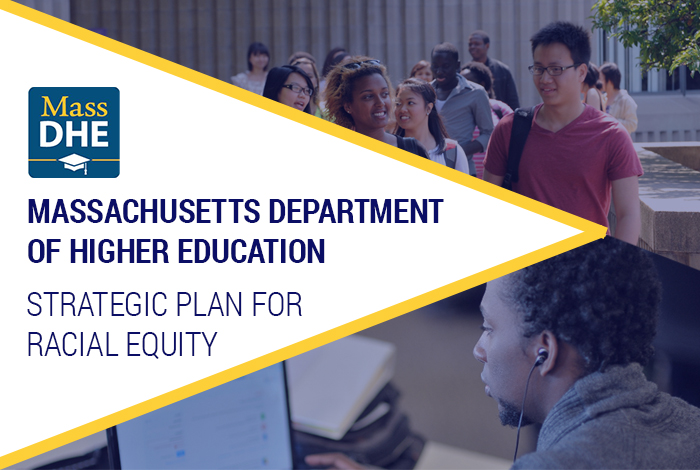
The Plan is focused on acknowledging the barriers that have hindered the success of Students of Color and rectifying and repairing harm. As a Commonwealth, we must critically review and evaluate our institutional policies, practices, pedagogies, and services to ensure they are rooted in racial equity. Success will be reached when racial disparities are eliminated from the public higher education system in Massachusetts.
In Fall 2022, DHE staff formed working groups to support implementation of the Plan.The purpose of these working groups is to plan and execute DHE activities associated with the Plan, stay informed on campus engagement, and identify resources for campuses.
The priorities of this work are to improve access to higher education for Students of Color, build a civically engaged educational experience for students of color, and prepare these students to thrive in their career and future beyond their time in higher education. DHE staff working on these efforts are focused on implementing recommendations to our public institutions that are based on analytical data and evidence, enhancing a student’s experience and sense of belonging while also looking at ways to expand support services that foster academic momentum and degree completion.
This work is critical to the growth and success of students attending Massachusetts institutions and cannot be successful without the support and partnership of key stakeholders.

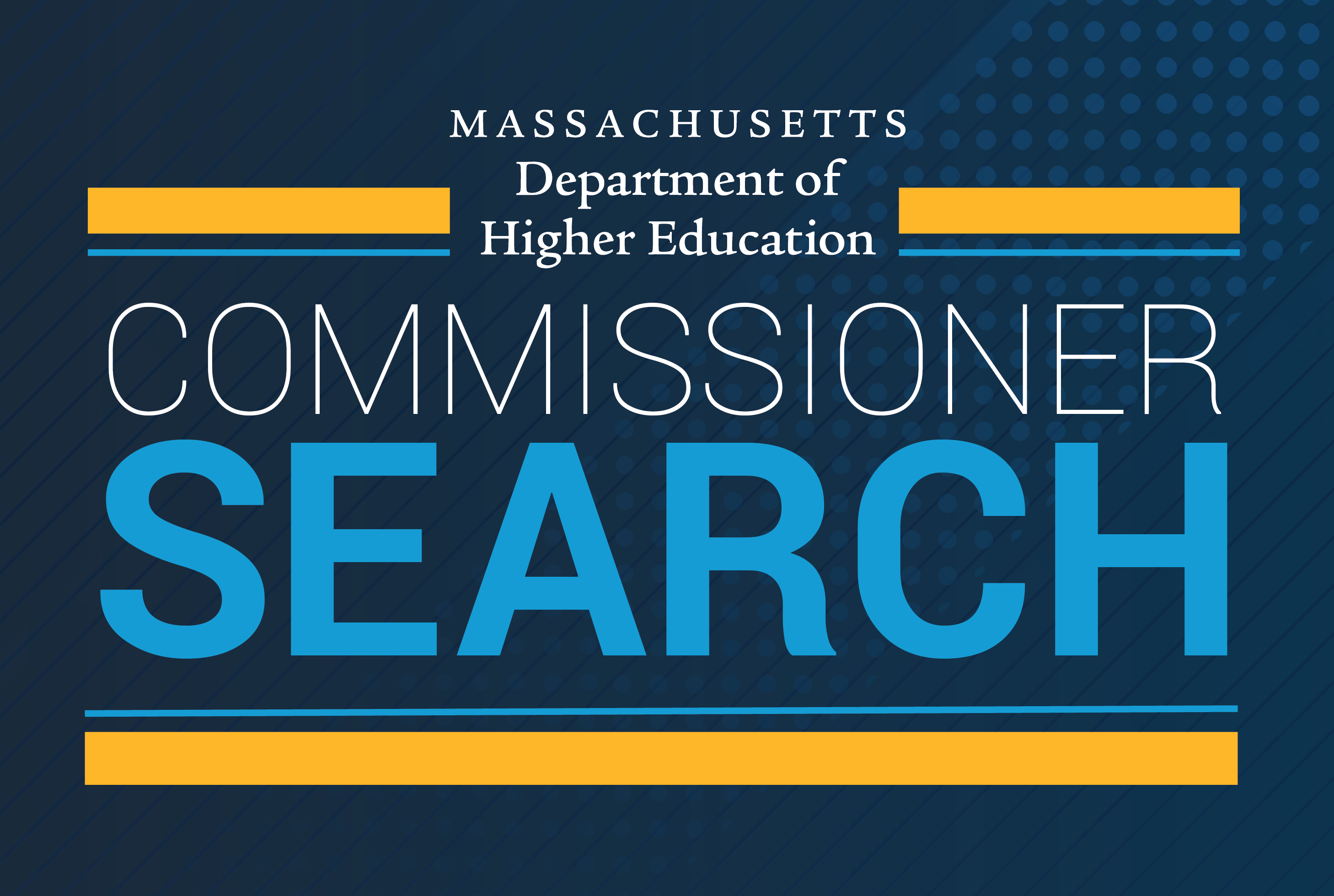
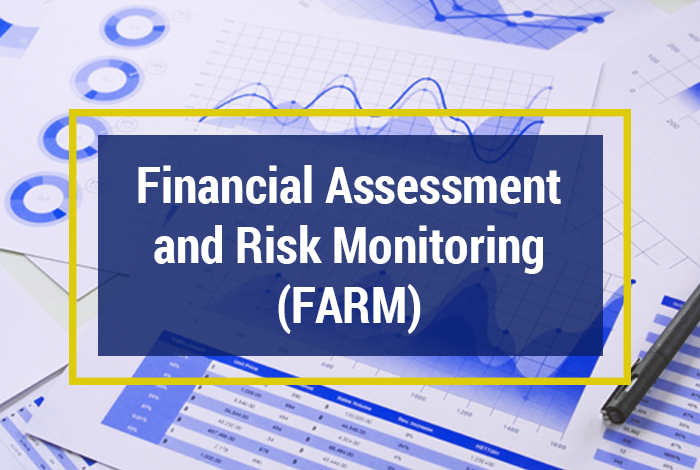
610 CMR 13.00 applies to private, independent institutions of higher education located in the Commonwealth and authorized to grant degrees. The regulation establishes standards to permit the Board of Higher Education (Board), through its executive agency, the Department of Higher Education (the Department), to: identify, through an annual screening and assessment process, institutions experiencing significant financial distress placing them at risk of imminent closure; monitor said institutions while they either improve their financial standing or transition to closure; and require contingency closure planning and timely public notification in the event of imminent closure.
The proposed amendments to 610 CMR 13.00 establish new criteria for the furnishment of surety bonds or letters of credit by institutions identified as being at risk of imminent closure (M.G.L. c. 69 § 31B (3)) and establish criteria for the Department to issue fines for institutional non-compliances with legal requirements (M.G.L. c. 69 § 31B(c)). In addition, the proposed amendments codify existing procedures pursuant to which institutions currently certify compliance with the law, including their compliance with the posting of annual financial reports and summaries and training of institutional governing board members (M.G.L. c. 69 § 31B((e)-(g)).
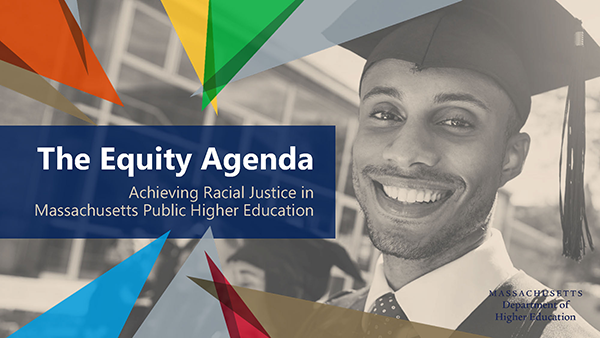
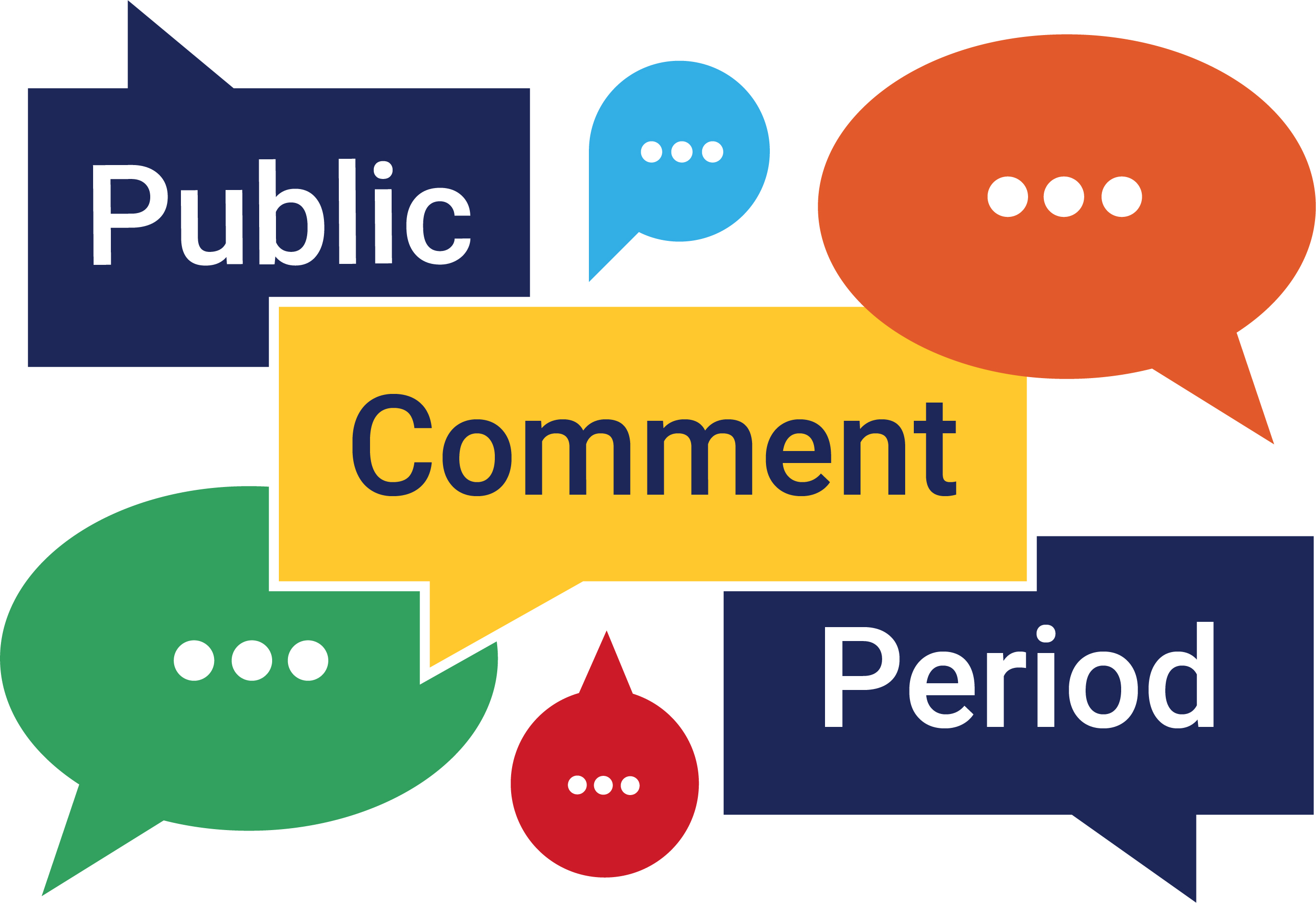
In January 2021, Governor Baker signed An Act Relative to Sexual Violence on Higher Education Campuses, (Chapter 337 of the Acts of 2020). The “2021 Campus Sexual Assault Law” established the DHE/DPH Joint Task Force on Sexual Misconduct Surveys to, “develop model questions for use by institutions in sexual misconduct climate surveys … [and to] provide the model questions to the commissioner of higher education with related recommendations respecting the content, timing and application of the surveys … [which] shall include, but not be limited to, recommendations on achieving statistically valid response rates and on addressing non-response bias.” M.G.L. c. 6 § 168D (d)(1).
Pursuant to M.G.L. c. 6 § 168 (d)(3)(iii) and (v), the Task Force on Sexual Misconduct Surveys shall “provide opportunities for written comment from organizations that work directly with survivors of sexual misconduct to align questions with a trauma-informed approach and to ensure the adequacy and appropriateness of the proposed content [and] provide opportunities for written comment from advocates to ensure that the survey impartially addresses campus sexual misconduct.”
Therefore, as part of the public comment process contemplated by the 2021 Campus Sexual Assault Law and to ensure the report, model questions and recommendations are trauma-informed and equitable, the DHE has opened a 21-day public comment period to collect public comments on the draft report for review and consideration by the Task Force on Sexual Misconduct Surveys to inform the Commissioner of Higher Education’s review, prior to the Commissioner finalizing the model questions and related recommendations.
Written comments must be provided in electronic format via email to BHERegulationsComments@dhe.mass.edu with the subject line “TF-SMS Draft Report” and in the form of tracked changes where applicable, by 5:00 p.m. on Friday, March 4, 2022.
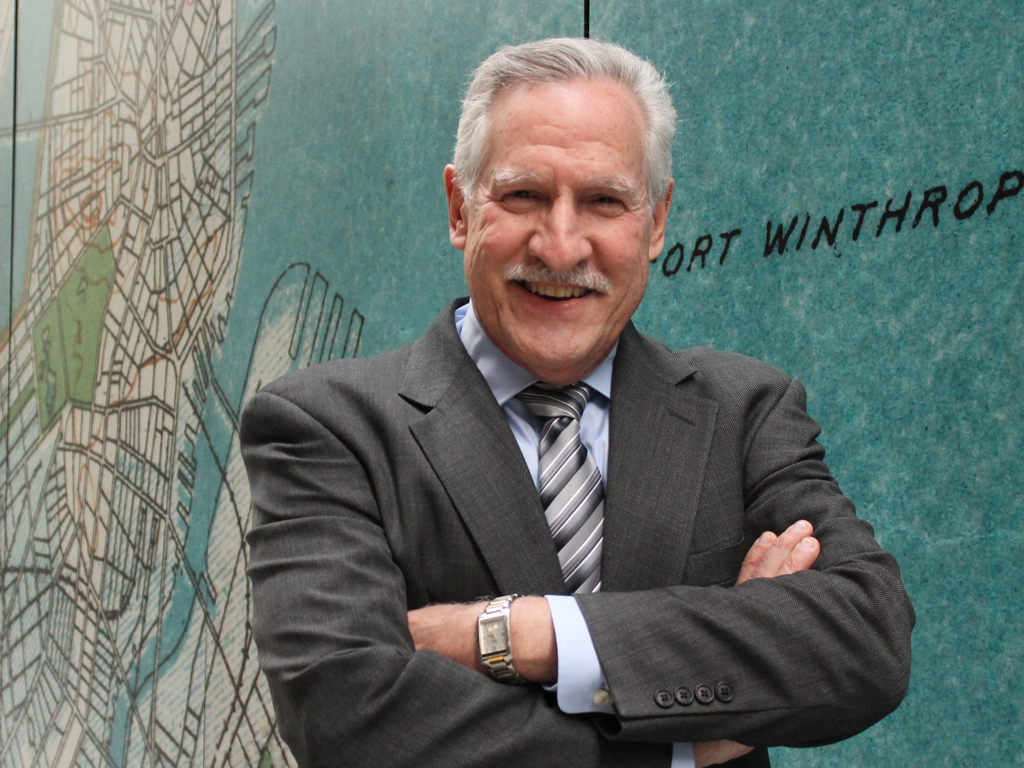
He will assist the transition to new leadership of the Department, as well as the completion of the Strategic Plan for Racial Equity that was launched in 2021. The search committee process for his successor is expected to begin in February.
“After forty years of engagement as a faculty member, researcher, and academic administrator, it is an opportune time for me to assist the BHE in identifying new leadership and ensuring the completion of the Commonwealth’s first 10-year strategic plan to achieve racial equity in higher education,”said Commissioner Dr. Carlos E. Santiago. “It has been an honor to work with the dedicated staff of the DHE and the exceptional colleagues, faculty, staff, and students of our higher education institutions in Massachusetts.”
“Commissioner Santiago has been a visionary leader who has sharpened our strategic focus on closing gaps of access and success in higher education, especially for first-generation college goers and students of color. Under his leadership the Department and Board has received well-deserved national recognition for its work developing and launching the Equity Agenda,” said Education Secretary James Peyser.
"For almost seven years, the Commonwealth has been most fortunate to have Dr. Santiago as our Commissioner of Higher Education,”said Chris Gabrieli, chair of the Massachusetts Board of Higher Education. “Leveraging his deep academic and leadership experience and credibility, he has addressed two huge agendas at the same time. He has steadfastly helped our institutions weather the unprecedented challenges of the pandemic while also laying the foundation for a nation-leading agenda focused on racial justice, fairness, and opportunity through educational equity. The widespread recognition of this work positions our system for sustained progress in the years ahead.”
Dr. Santiago was appointed Commissioner of Higher Education on July 1, 2015 by the Massachusetts Board of Higher Education. In this capacity, he has worked closely with the Board and with the leadership of the three segments of the public higher education system in the Commonwealth, including the community colleges, state universities, and the University of Massachusetts.
Under his leadership, the Department of Higher Education has:
In recognition of these achievements and its commitment to racial equity, the Massachusetts Department of Higher Education was named the 2021 Exceptional Agency of the Year by the State Higher Education Officers Association (SHEEO) in November.
"Commissioner Santiago has been an advocate for students throughout his career,"said Robert Anderson, Ph.D., President of the State Higher Education Offices Association (SHEEO). "His current focus on state policy levers as a means of improving student access, success and the closure of equity gaps has benefited all of Massachusetts and those it serves. Personally, I have turned to Commissioner Santiago numerous times for counsel during his tenure as Chairman of the SHEEO executive committee and will miss his service in this capacity. He has left an indelible impact through his service to students, state and nation which will benefit us all for years to come."
Dr. Santiago previously served as the chancellor of the University of Wisconsin-Milwaukee (UWM), becoming the first leader of Puerto Rican descent to lead a major U.S. research institution. During his tenure he was tasked with leading UWM into the ranks of Tier I research universities, which the university attained in 2015. Dr. Santiago also served as provost and vice president for academic affairs at the University at Albany, State University of New York (SUNY) and functioned as the chief operating officer of the campus. He was named a Collins Fellow for distinguished service to SUNY-Albany in 1996.
Dr. Santiago was professor of economics at UWM and SUNY-Albany and holds a Ph.D. in economics from Cornell University. A labor economist, he is the author or co-author of six books and has published dozens of articles and book reviews, of which many focus on economic development and the changing socioeconomic status of Latinos in the United States. His most recent book, published in 2018, is entitled Puerto Ricans in the United States: A Contemporary Portrait (with E. Acosta-Belen).
Dr. Santiago was recently selected to serve as the Chair of the Executive Committee of the State Higher Education Executive Officers Association (SHEEO) and was named to the Board of the Council of Higher Education Accreditation (CHEA). Dr. Santiago also serves on the Advisory Committee of the Smithsonian Museum of African American Culture and History. On two separate occasions, in 1996 and 2011, Santiago was named one of the 100 most influential Hispanics in the United Stated by Hispanic Business.
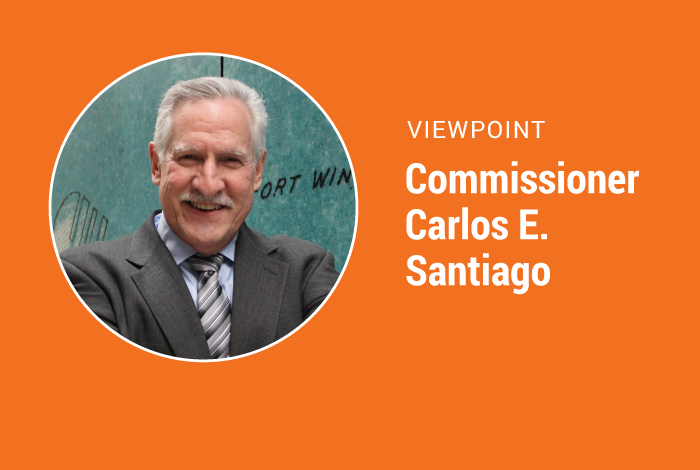
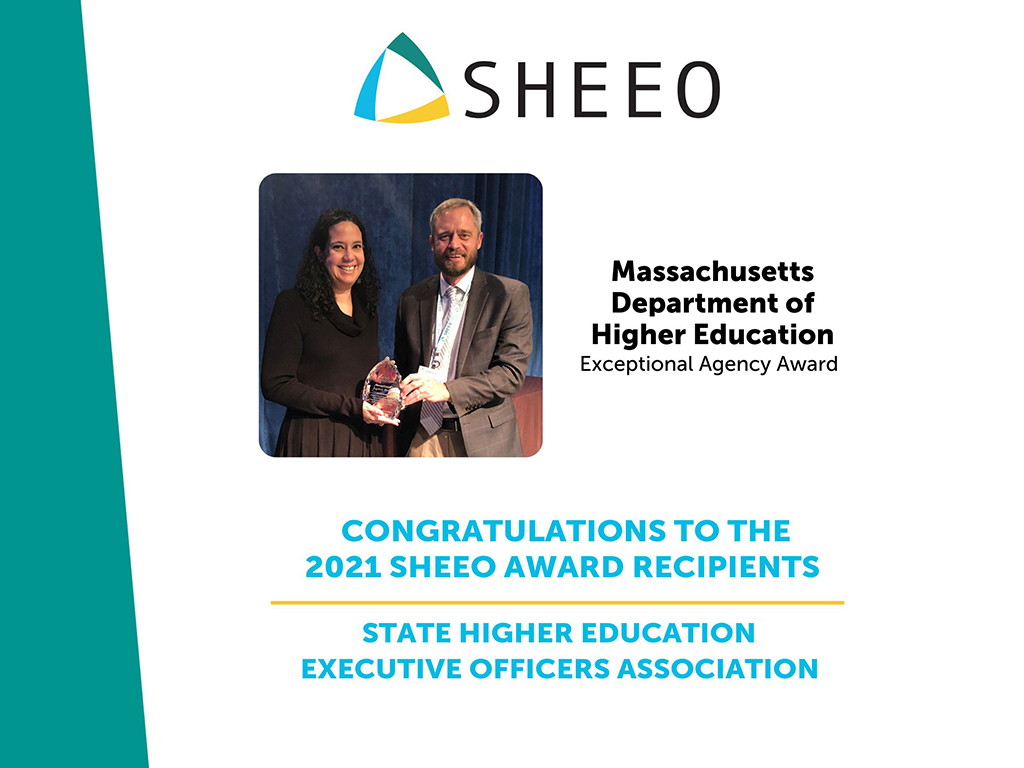
The Exceptional Agency Award is presented to a member agency whose innovative actions, policies, or practices advanced student success in their state; which displayed exceptional governance practices; overcame exceptional challenges; or displayed other meritorious attributes within the last year. The Massachusetts Department of Higher Education (MDHE) has demonstrated a consistent commitment to advancing postsecondary education and student success within Massachusetts.
One notable accomplishment by the MDHE was adopting the vision for the Equity Agenda in December 2018. After an intensive professional development series in partnership with the University of Southern California’s Race and Equity Center, the Department of Higher Education launched its action plan. With the support from Lumina Foundation and after being designated a Talent, Innovation, and Equity (TIE) state, the action plan included reimagining the student experience, conducting a policy audit, and developing a 10-year strategic plan for racial equity.
A number of key initiatives have been at the forefront of the Equity Agenda, such as creating a seamless system of transfer, expanding early college, increasing access to open education resources, transforming developmental education, and addressing basic needs security. Using data and evidence to measure progress towards the goal of racial equity, the board and department will work towards redesigning the policy scheme to build a culturally sustainable public postsecondary system where students can thrive.
Carlos E. Santiago, the commissioner of MDHE, said: “We are fortunate to have a staff dedicated to the educational success of all of our students, particularly historically excluded students, a system of public educational institutions that share our values, mission, and strategic initiatives, and a board and leadership that is committed to the highest ideals of higher education. This is a collective effort that seeks to make students’ highest aspirations a reality
Chris Gabrieli, chairperson for the Board of Higher Education, shared: “We are delighted and honored that SHEEO has chosen the Massachusetts Department of Higher Education for recognition. As arguably the birthplace of public education in the country, and one of the epicenters of higher education in the world, Massachusetts takes great pride and interest in fostering opportunity through our public higher education system. This department, led by our outstanding commissioner, Carlos Santiago, and fueled by a team with diverse experience and backgrounds, has worked hard to advance the interests of students and schools. We are especially proud to have made our Equity Agenda a top priority—this department puts student opportunity and overcoming historical barriers at the top of what we do and who we are, in both priority setting and actions accomplished. On behalf of our board and Commonwealth—thanks to Carlos and the team!”
James Peyser, Massachusetts secretary of education, said: “The work done by Department of Higher Education and Commissioner Santiago, and his team, over the past year has been outstanding. On behalf of Governor Baker and Lt. Governor Polito, I want to thank SHEEO and congratulate the commissioner and the DHE staff. This award is an important recognition of the innovative work in equity that the department has undertaken over the past couple of years. There remains much to do in the years to come, and I believe the commissioner and the department will be effective leaders of our state universities and community colleges in that work.”
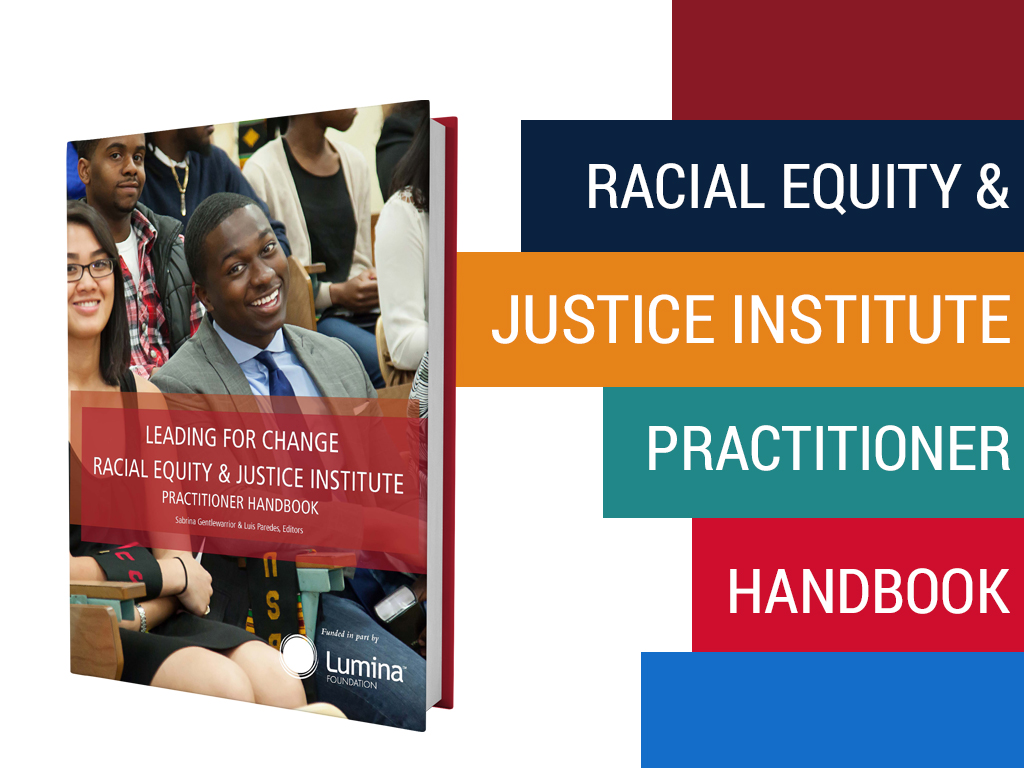

A consortium of six public colleges and universities and the Massachusetts Department of Higher Education (DHE) has received a highly competitive $441,367 grant from the U.S. Department of Education to create and adapt existing open textbooks using an equity and inclusion lens. The Remixing Open Textbooks through an Equity Lens (ROTEL) will provide stipends for faculty to create accessible and intentionally inclusive open textbooks and other open educational resources (OER) that reflect students’ local and lived experiences to improve student learning outcomes. By replacing textbooks, these resources will also result in significant cost savings, making college more affordable for Massachusetts students.
The consortium, called the Open Textbook Coordinating Council (OTCC), is comprised of six institutions:Fitchburg State University, Framingham State University, Holyoke Community College, Northern Essex Community College, Salem State University, and Springfield Technical Community College . DHE is also a consortium partner, having invested funds for the past two years in incenting faculty to adopt existing OER instructional materials The program will give particular focus to publishing culturally- relevant materials for courses in highly enrolled general education courses, which will ensure a wide-ranging impact. It will also focus, in partnership with industry councils, on professional and career courses in high-growth labor market areas such as health care, criminology, early childhood, and business administration.
The program also aims to demonstrate that underrepresented students will achieve higher academic outcomes if free, culturally relevant textbooks are available to them. In order to determine the effectiveness of the project and its impact on student learning, an assessment framework was chosen, and key performance metrics will be created.
Grant administrators from the six institutions adopted the COUP Framework, the Open Education Group’s methodology to study the impact of open educational resources. This method looks at impact based on four areas: Cost, Outcomes, Usage, and Perceptions. The COUP Framework allows for a more comprehensive view of OER beyond the more common cost-savings metrics. The Perceptions area is particularly applicable to the project. One question that will be explored. What do faculty and students think about, and feel toward Open Educational Resources that are more accessible, inclusive, and representative?
The project will also ensure scalability and longevity in the use of these OERs throughout the Commonwealth, sharing its results with all Massachusetts public institutions and beyond.


On September 20, in collaboration with Campus Compact (a national network of colleges and universities committed to the public purposes of higher education), DHE sponsored a day-long virtual symposium entitled “Anti-Racist Community-Engaged Learning: Principles, Practices, and Pedagogy” (Anti-Racist Community-Engaged Learning: Principles, Practices, and Pedagogy (compact.org)). As part of a project funded by a DHE Higher Education Innovation Fund (HEIF) grant, teams of faculty from four public universities—Fitchburg State University, Salem State University, University of Massachusetts Amherst, and Worcester State University—met in the spring and summer and developed a set of 21 principles for anti-racist teaching practices in community-engaged courses and used those principles as the foundation for faculty development institutes at their four campuses; they then shared their learning in this symposium attended by 548 faculty, staff, and administrators from across the country, 325 of them from Massachusetts public higher education. The symposium also featured:
This professional development event followed another virtual event aligning DHE’s Equity Agenda with civic learning and engagement. On September 15, in collaboration with a network of civic engagement leaders from Massachusetts community colleges, the DHE sponsored a series of panels entitled “Whose Constitution, Whose Rights?” Three panels, attended by around 100 students, faculty, and staff from Massachusetts public colleges and universities, explored the current status of three groups whose rights are guaranteed in theory under the U.S. Constitution but are endangered in practice: immigrants, the criminally accused, and voters. This event was part of Constitution Day, recognizing the signing of the U.S. Constitution.
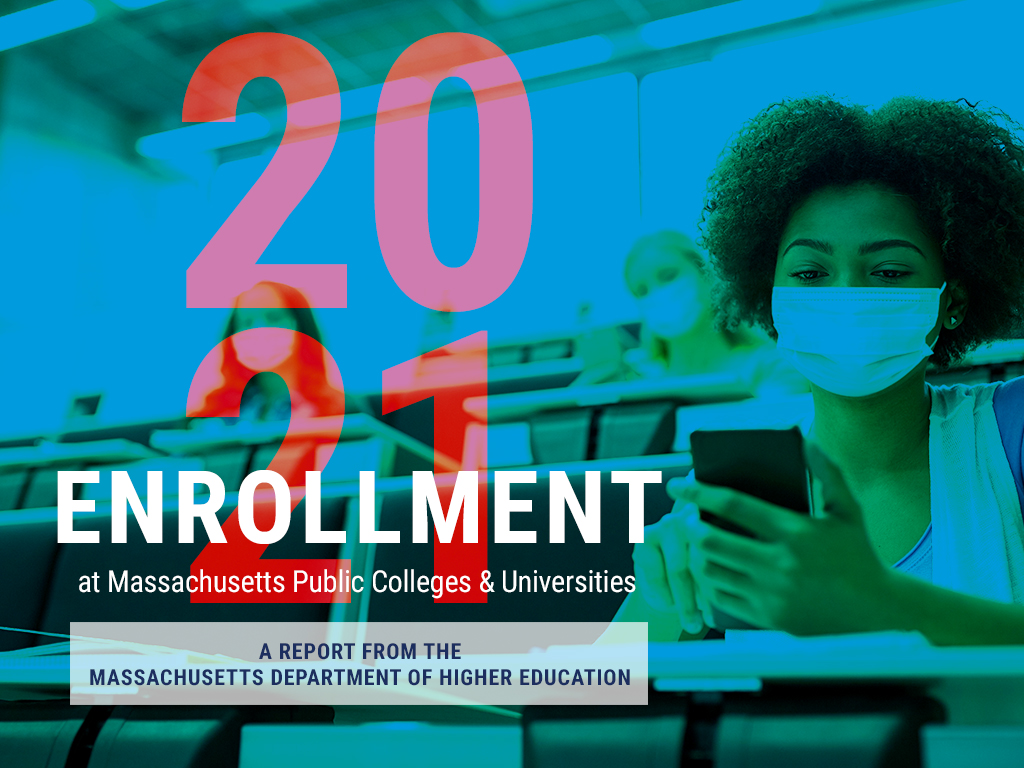


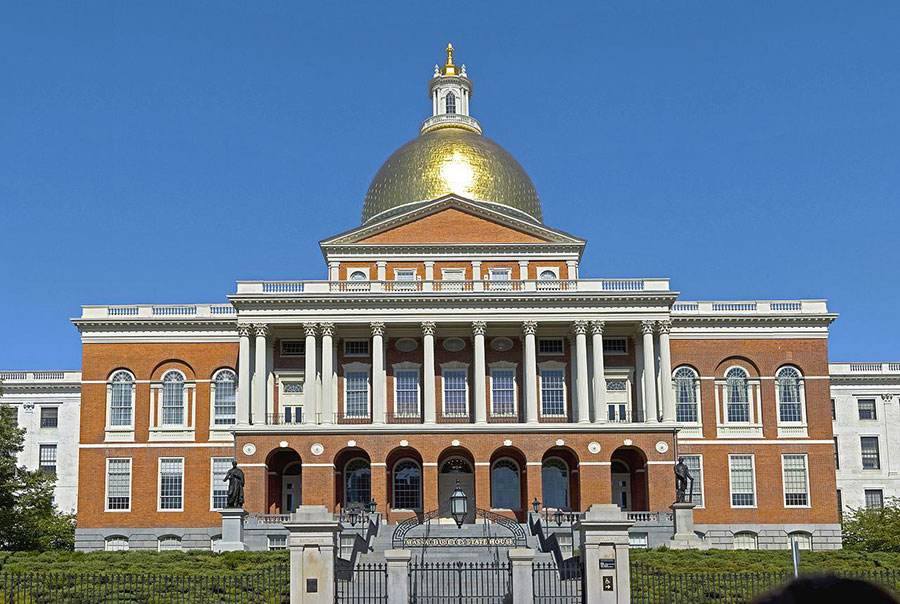
In 2021, with the support of the Campus Safety and Violence Prevention (CSVP) community and the Department of Higher Education (DHE), and tremendous student advocacy, the legislature enacted landmark legislation, Chapter 337 of the Acts of 2020: An Act Relative To Sexual Violence On Higher Education Campuses, also known as the 2021 Campus Sexual Assault Law. This is one of the first state laws of its kind specifically focused on campus efforts to prevent and respond to sexual violence. The law applies to both public and private higher education institutions located in the Commonwealth and authorized to grant degrees and has two major sections: a section pertaining to the requirement that all institutions conduct sexual misconduct climate surveys at least once every four years; and another section which imposes specific policy, procedure and reporting requirements on institutions’ efforts to identify, prevent and respond to sexual misconduct.
Parts of the new law parallel and codify existing requirements under federal law, such as the requirements that institutions provide regular prevention and awareness programming for students and employees; and provide training to campus officials involved in the response, investigation and disciplinary processes related to campus sexual violence. But other requirements in the state law are very new, including, by way of example, requirements that institutions:
DHE will be working with the Department of Public Health (DPH), the Commonwealth’s institutions, advocacy agencies, students, and others in the CSVP community, to implement the law.
Four major components of the new law which require DHE-focused policy development in year 1 of implementation include:
The law commissions a 27-person Task Force on sexual misconduct surveys, to be co-chaired by the Commissioners of DHE and DPH, to develop model questions—to be approved by the commissioner of higher education—for use by institutions in their sexual misconduct climate surveys.
Under the law, institutions shall prepare and submit to the DHE a report that includes specific data points identified in the law related to incidents of sexual misconduct on campus. DHE will analyze data received and publish an annual report containing aggregate statewide information on the frequency and nature of sexual misconduct at institutions.
Under the law, each institution shall, to the extent feasible, adopt a memorandum of understanding (MOU) with local law enforcement agencies to establish the respective roles and responsibilities of each party related to the prevention of and response to on-campus and off-campus sexual misconduct.
Additionally, the DHE must promulgate regulations to implement the subsection on Police MOUs. The final Local Law Enforcement Agency MOU Regulations (610 CMR 14.00) were filed on July 30, 2021 and will take effect on August 20, 2021, the day they are published in the Massachusetts Register.
Under the law, an institution that does not provide its own sexual assault crisis service center shall enter into and maintain an MOU with a community-based sexual assault crisis service center funded by the department of public health and a community-based domestic violence program funded by the department of public health.
Institutions that already have such services in place on-campus may be exempt from this statutory requirement and institutions that have engaged in good faith efforts but were unable to obtain the required MOU may seek a waiver by submitting a written request to the DHE. The process and criteria for seeking such waivers from the DHE are forthcoming and will made available on the DHE’s website.
An additional component of the law requires the Commissioner to appoint a campus safety advisor to facilitate and advance statewide campus safety at public and private institutions of higher education. I am honored to fill that role for the department. As the Campus Safety Advisor, I look forward to working with our institutions, students, advocates and the entire CSVP community, providing technical assistance and guidance as we all work together to implement this landmark legislation. If you have any questions, please do not hesitate to reach out to me directly at arobbins@dhe.mass.edu.
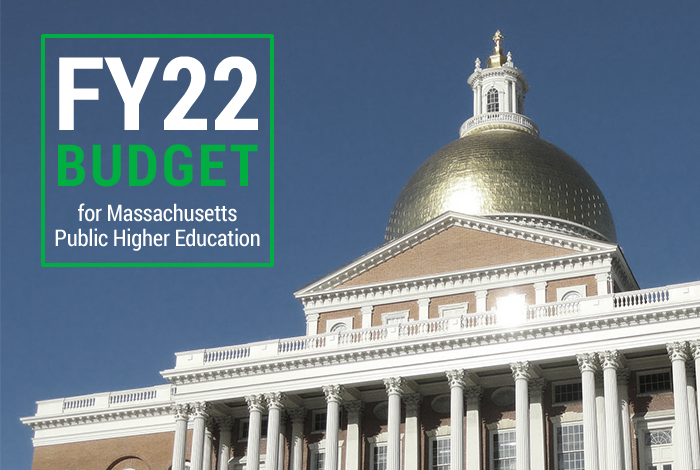


In January 2021, Governor Baker signed An Act Relative to Sexual Violence on Higher Education Campuses, (Chapter 337 of the Acts of 2020). Generally, this law—commonly referred to as the “2021 Campus Sexual Assault Law”—establishes two new broad sets of requirements for all public and private institutions of higher education located in the Commonwealth and authorized to grant degrees: (1) a new requirement for institutions of higher education to administer periodic sexual misconduct climate surveys (codified as a new section 168D to M.G.L. c. 6); and (2) a new requirement that institutions of higher education adopt certain policies, procedures, and reporting requirements with regard to identifying, preventing and responding to sexual misconduct involving students or employees of the institution (codified as a new section 168E to M.G.L. c. 6).
The proposed regulations (610 CMR 14.00) relate exclusively to language embedded in subsection (c) of Section 168E of M.G.L. c. 6, which requires all public and private higher education institutions located in the Commonwealth and authorized the grant degrees, “to the extent feasible,” to enter into memoranda of understanding (MOUs) with local law enforcement agencies regarding the respective roles and responsibilities of the parties in the prevention of and response to on-campus and off-campus sexual misconduct.
The 2021 Campus Sexual Assault Law includes a specific timeline on regulation promulgation, mandating the DHE to, “promulgate regulations to implement subsection (c) of Section 168E of chapter 6 of the General Laws not later than August 1, 2021.” Section 2 Chapter 337 of the Acts of 2020. The proposed regulations seek to establish the minimum, baseline requirements for the statutorily-mandated MOUs, including: (1) content criteria; (2) an annual reporting and certification procedure for institutions to inform the Department on their progress in establishing MOUs; and (3) a reporting process for institutions to submit to the Department determinations on the “feasibility” of entering in to MOUs with local law enforcement agencies. The proposed regulations would also require the DHE to create and publish an annual report on the status of each institution’s compliance with the statutory and regulatory MOU requirements
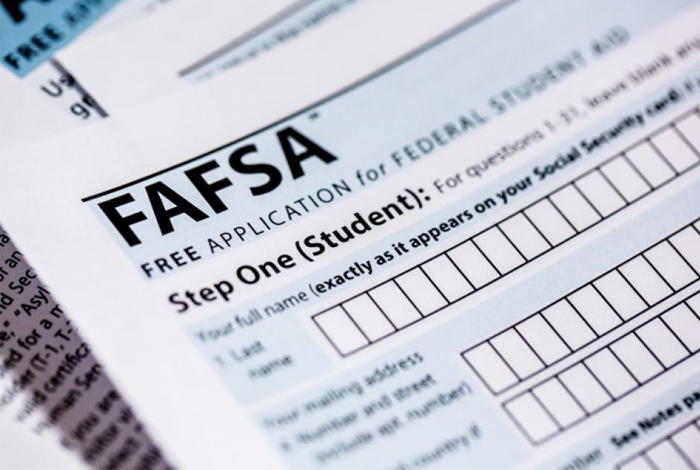


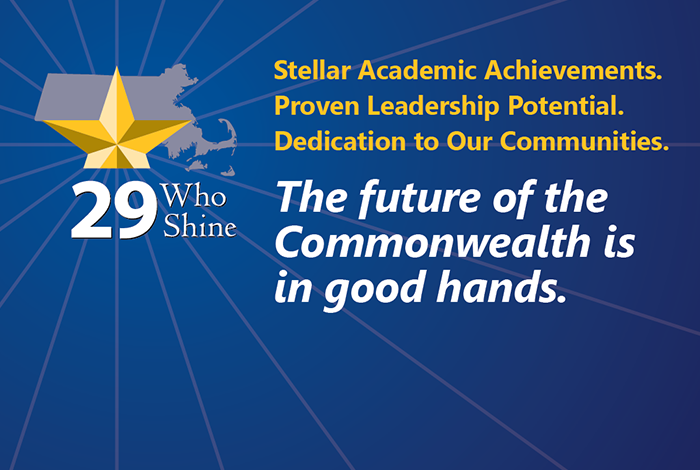

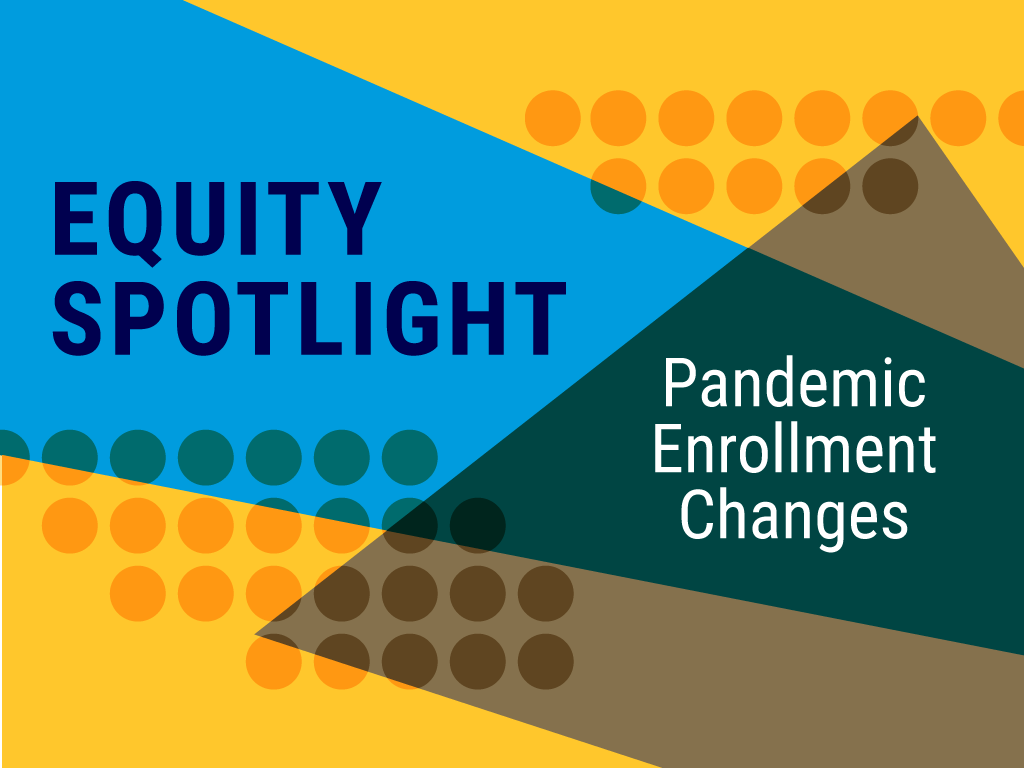
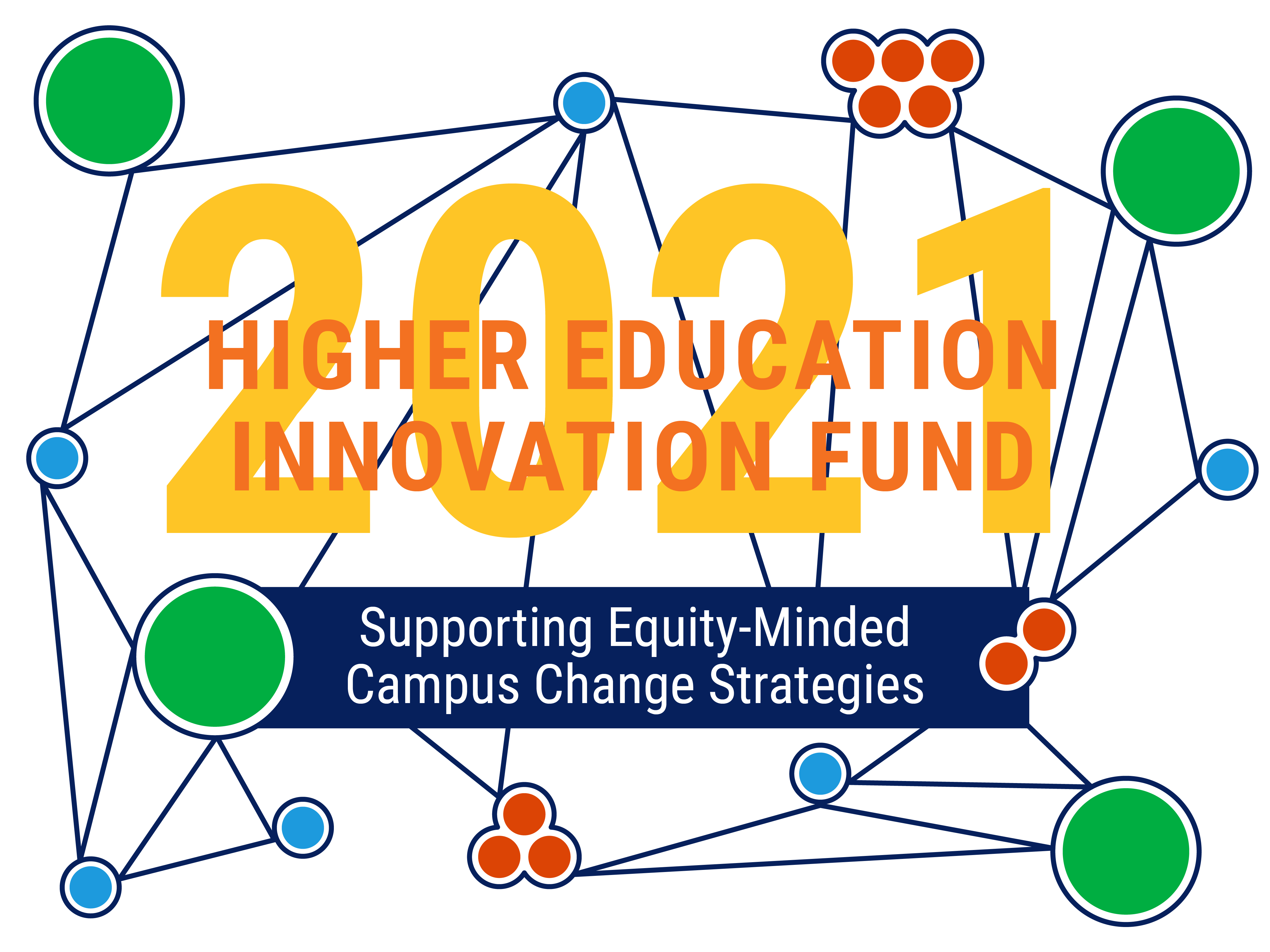
Achieving true racial equity in Massachusetts public higher education will require colleges and universities to identify and repair policies and practices that have served too few students—and kept too many from realizing their dream of a college degree.
With the awarding of FY21 Higher Education Innovation Fund grants, institutions are moving into action to advance equity goals, using new approaches that promote antiracism and affirm the cultural wealth and strengths of racially minoritized student populations. Most of the proposals funded by DHE seek to provide faculty and staff equity training for transforming campus pedagogy, syllabi, curriculum and campus life, with the goal of making the institution a truly nurturing environment for Students of Color.
“Since the inception of the Higher Education Innovation Fund, our goal has been to seed and support new ideas and proven practices across our campuses, with the overarching goal to increase success outcomes for minoritized students,” said Patricia A. Marshall, Deputy Commissioner for Academic Affairs and Student Success. “We have begun to identify the need for significant changes in the way we operate and educate, focusing on ensuring that we’re ready to meet the needs of racially minoritized students at our institutions. The Innovation grants will provide campuses with the resources to amplify this important work.”
Listed below are brief descriptions of the grant recipients for the FY21 Higher Education Innovation Fund and dollar award amounts:

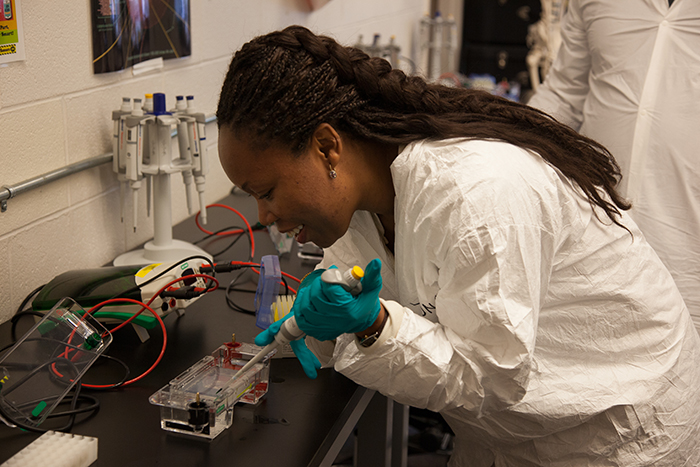
At its March meeting, the Board of Higher Education received a detailed update on the STEM Starter Academy (SSA), launched in 2013 with the goal of increasing student interest in STEM coursework and careers. SSA is a strategic initiative of the Department of Higher Education (DHE), implemented in partnership with Massachusetts’ 15 community colleges to recruit, ready, retain and advance students in STEM pathway programs. SSA students complete STEM certificates and degrees and transfer to four-year STEM programs or enter the workforce.
SSA aligns with DHE’s Equity Agenda through intentional recruiting and comprehensive support of community college students who represent the rich and growing diversity of the Commonwealth. SSA is currently in its eighth year of implementation. Results from the recent evaluation show Black and Latinx SSA participants are more likely to have a positive outcome after two years compared to their peers who are not in the program.
The University of Massachusetts Donahue Institute (UMDI) has provided an independent evaluation of the SSA initiative from its initial launch. It presented the BHE with a summary of best practices and impacts through its recently released “Annual Evaluation Report, Year 6” which highlights key findings and provides qualitative and quantitative evidence of student outcomes.
The Board also heard from three students representing MassBay, Massasoit, and Springfield Technical Community Colleges, who shared their personal and transformative experiences in the SSA program, highlighting student-centered support services beginning with the college entering Summer Bridge to throughline support services and on to the 2-4 Year Transfer Academy.


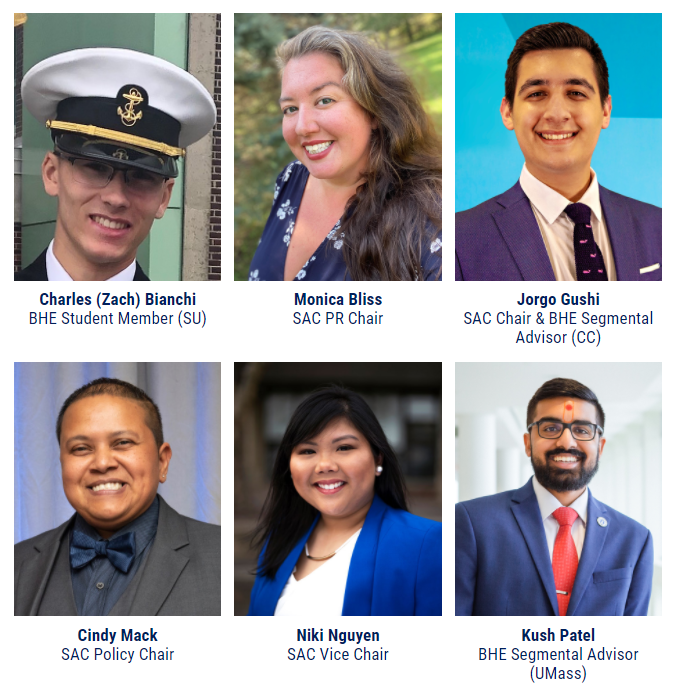
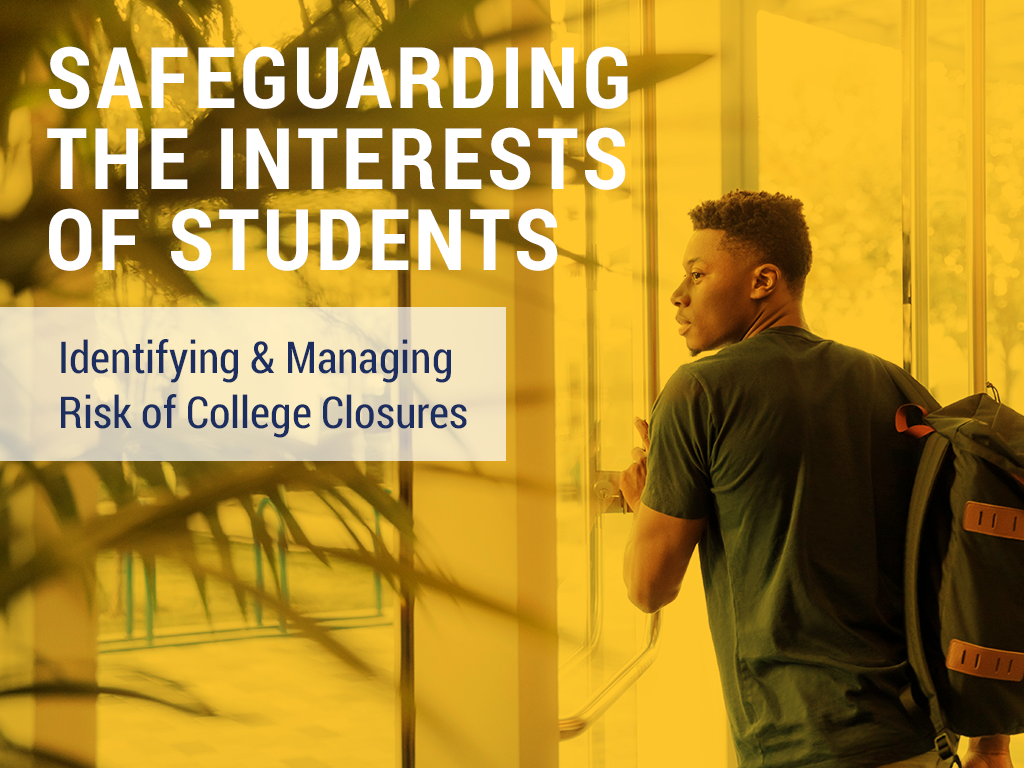
The Massachusetts Board of Higher Education (BHE) is required by statute and regulation to annually assess the financial information of private institutions of higher education for the purpose of identifying and monitoring institutions at risk of imminent closure, and mitigating the impacts of closures on students, their families, faculty, staff, and the community.
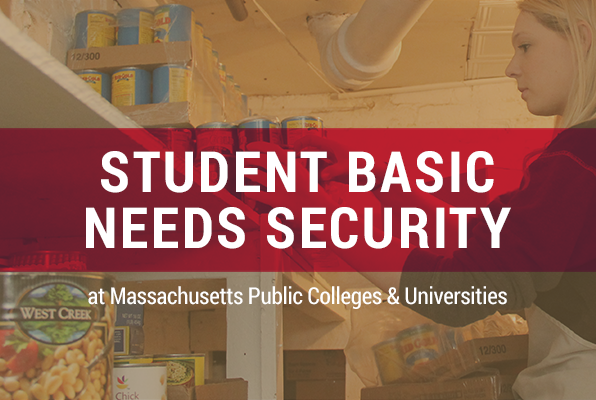

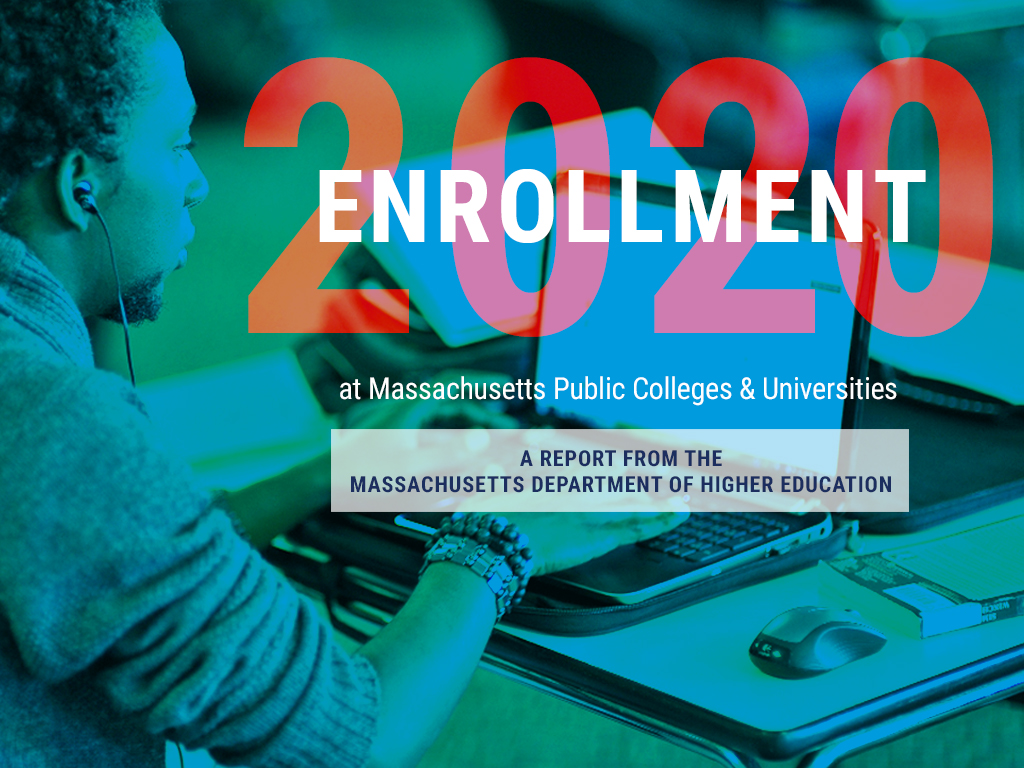

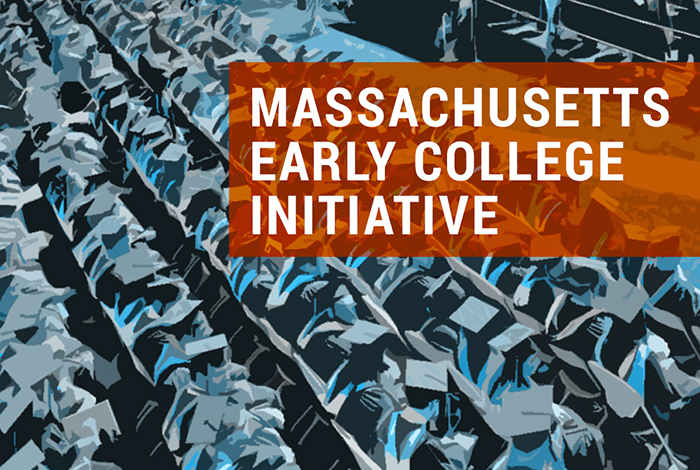
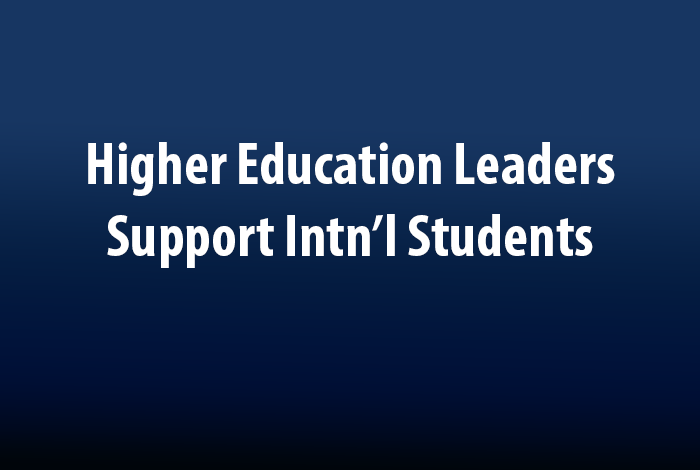
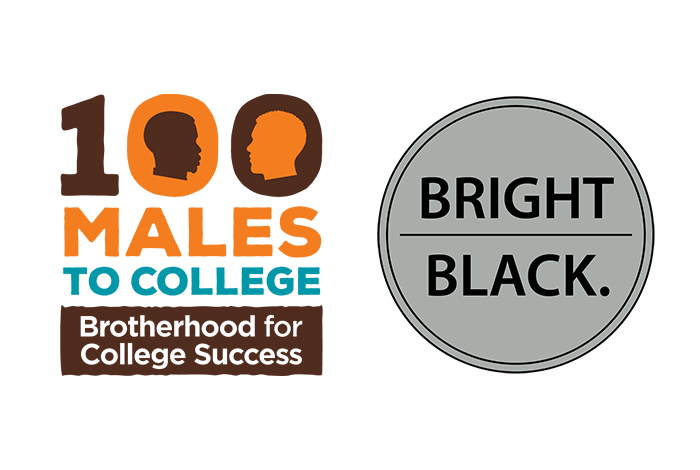
As our nation confronts both the legacy of systemic racism and the crippling impact of a global health pandemic, DHE’s 100 Males to College program is getting a strong show of support from an African American entrepreneur eager to help young men of color reap the benefits of higher education.
When Massachusetts native Tiffany Griffin learned in March that her cousin 28-year-old Christopher Fonville had been shot eight times in his Springfield neighborhood, she moved quickly to turn her grief into action. Griffin, proprietor of Bright Black candle company in Durham, North Carolina, decided to donate proceeds from a commemorative candle she had created in her cousin’s memory to support 100 Males to College graduates in Springfield. Sales of the Koi candle – Koi means “Urge” in Hawaiian and was also Fonville’s middle name - will support DHE’s signature initiative to help young African American and Latinx male students continue their education after high school. By giving students the chance to take free college courses and develop strong college-going identities, 100 Males to College promotes a “Brotherhood for Success” in Massachusetts cities where many minoritized youth lack opportunities to succeed. In Springfield, over 90% of 100 Males participants have enrolled in college, a rate far higher than for the district as a whole.
“Tiffany Griffin’s show of support for 100 Males to College is a reminder of the extraordinary power of individual citizens to step forward and support social progress,” said Massachusetts Higher Education Commissioner Carlos E. Santiago. “The Bright Black fundraiser not only helps individual students. It also supports the Commonwealth’s critical need for diversity and inclusion in our high-skilled workforce.”
Data collected by the Department of Higher Education show that only 17% of low-income Latino male students and 22% of low-income African American male students who graduated from Massachusetts public high schools in 2010 went on to obtain college degrees or certificates within six years, compared to an overall 50% degree/certificate six-year obtainment rate for the 2010 MA public high school graduating class.

The proceeds from the Koi candle sales will be used to create a 100 Males emergency fund to ensure that the young men who make it to college are not stymied by an unexpected expense that could derail their college dreams.
“With this candle, we’re urging you all to cherish every moment with those you love,” said Griffin, who noted that June is National Gun Violence Awareness Month. “We’re urging peace--even amid loss and even during times of uncertainty. With this KOI candle, we’re urging you all to have hope that a nonviolent, harmonious, loving world is indeed possible.”
Tiffany describes her decision to support 100 Males to College in a blog post here.
More information on 100 Males programs in Springfield, Brockton, Framingham, Salem and Worcester is available here.



Massachusetts Commissioner of Higher Education Carlos E. Santiago has approved a recommendation to extend the priority deadline for state financial aid (MASSGrant) from May 1st to July 1st. This action follows a review of data analyzed by the Department of Higher Education’s Office of Student Financial Assistance which shows a 16% decrease in the number of Free Applications for Federal Student Aid (FAFSAs) received as of April 28, 2020, compared to similar period in 2019-2020. Among students, the biggest decline in applications was seen in the community college population.
“Our students and families are experiencing unprecedented levels of economic security and need our support as they attempt to plan for the coming academic year,” said Santiago. “Our goal with this FAFSA extension is to expand the pool of students who are eligible for financial aid. Such assistance can make all the difference aa to whether students remain on track to earn college credentials that lead to good jobs.”
The FAFSA is available for download at https://studentaid.gov/h/apply-for-aid/fafsa. Students should contact their college financial aid office for further information, or DHE’s Office of Student Financial Assistance at osfa@osfa.mass.edu.

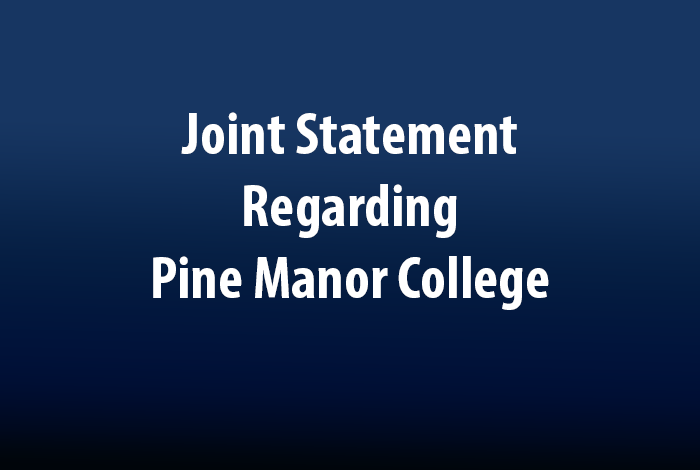


The Massachusetts Board of Higher Education (BHE) has authorized the Commissioner of Higher Education to solicit public comment on proposed regulations to annually screen and monitor the financial stability of independent colleges and universities in the Commonwealth, with the goal of protecting students from the extraordinary disruption caused by abrupt institutional closures.
The proposed regulations apply to all Massachusetts-based, independent institutions that are authorized by the BHE to grant degrees and/or eligible to receive state aid. If approved by the BHE, they would establish standards and processes to allow the Board (through the Commissioner and Department of Higher Education staff) to screen, monitor and work with institutions to develop contingency plans for closure and timely notification of students, families and staff. The Department would use December 1 as an annual “threshold” date to determine whether an independent college or university has the financial capability to complete the current and subsequent school years over an 18-month time frame. If the Department determines that an institution is “at risk of imminent closure,” the Commissioner may require it to submit a contingency closure plan and notify students, faculty and other stakeholders of its financial condition.
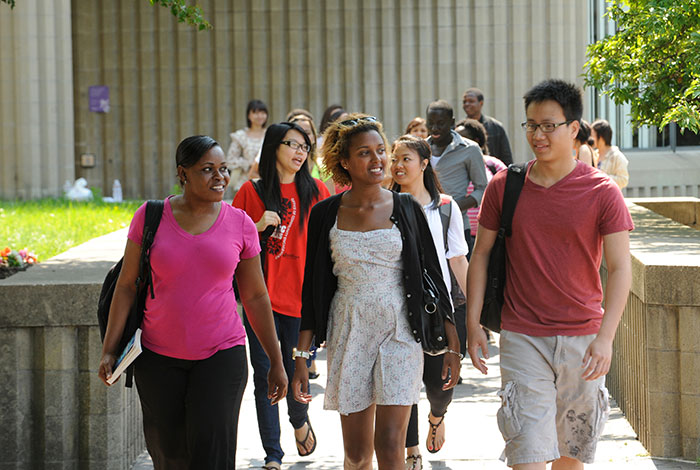
The Baker-Polito Administration announced today that four community colleges and two state universities have been awarded $1.15 million in competitive grants that will help the state’s public campuses support the needs and talents of an increasingly diverse student population.
The Higher Education Innovation Fund, established by the legislature, encourages state colleges and universities to compete for grants with the goal of accelerating change within the public higher education system.
This year, awards went to six of the twelve campuses that submitted proposals. The Department of Higher Education gave priority to proposals that focus on achieving greater equity among students by increasing college-going and college completion rates of students of color, low-income students and those who are the first in their families to attend college. To maximize the impact of the funds and promote collaboration within the public system, this year’s winners were chosen from among campus consortia, representing institutions that are committed to working as partners to advance student success strategies.

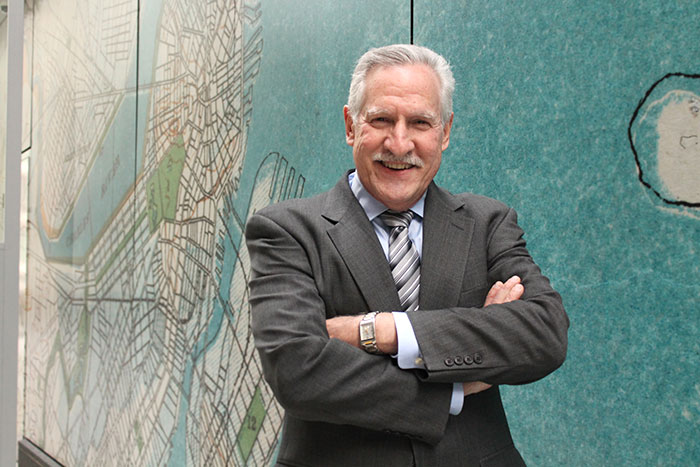
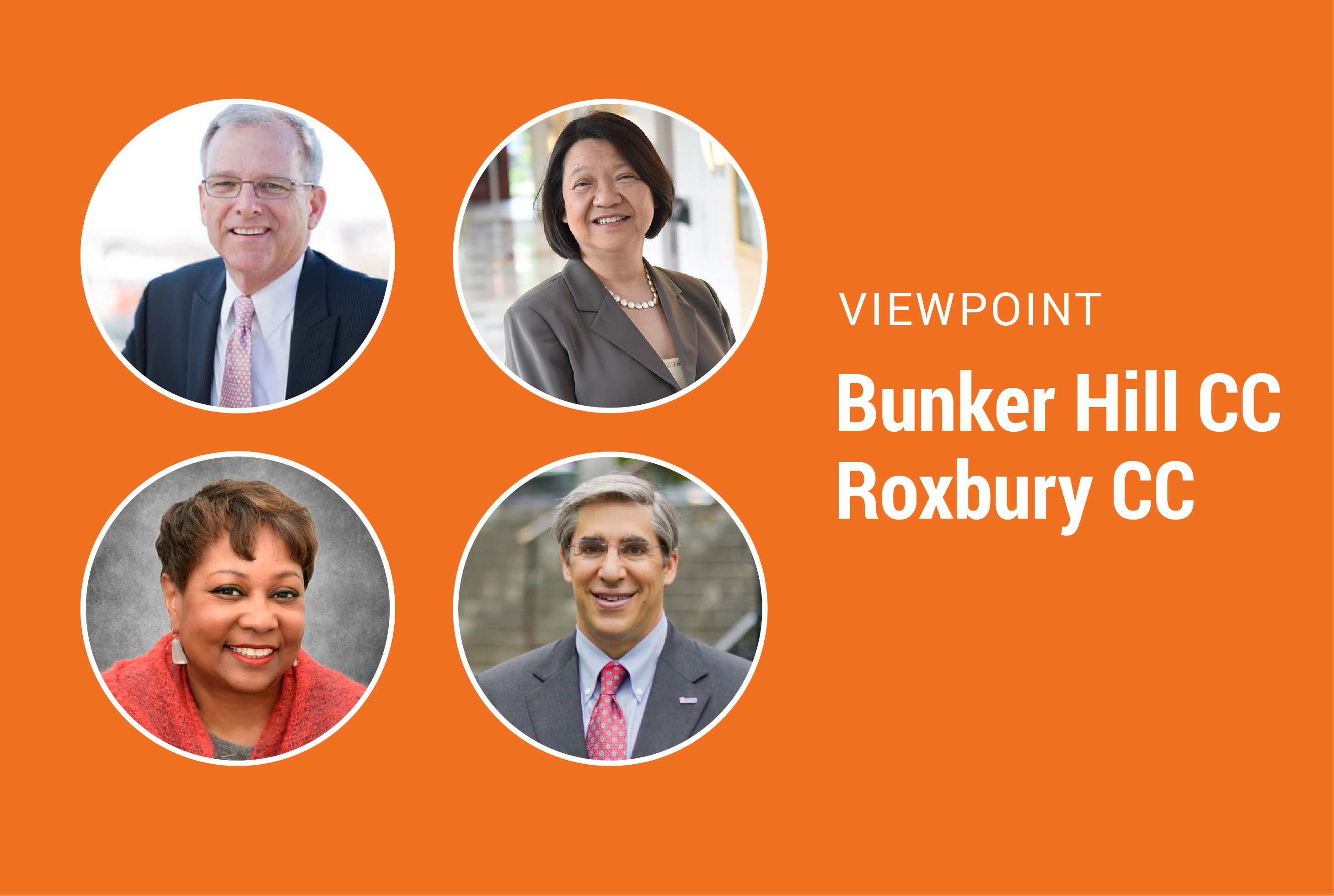

Governor Charlie Baker awarded designation to early college programs at 13 high schools and eight public colleges across the Commonwealth that will enroll thousands of students next fall, giving them opportunities to study in college-level courses and earn credits before they graduate high school.
Governor Baker and Education Secretary James Peyser made the announcement during an event at Bunker Hill Community College, organized to recognize the high schools and colleges that have launched programs designated by the state this school year.
With the new awards, there are 35 high schools and 18 colleges in Massachusetts with designated early college programs. Early college programs combine traditional high school classes with college courses through a local college or university to give students knowledge and exposure to an area of study, while earning up to 12 college credits – equivalent to one semester-- for free. By creating designated early college programs, the Baker-Polito Administration aims to break down barriers between high school and higher education to create a more seamless path for students to move to college and careers.
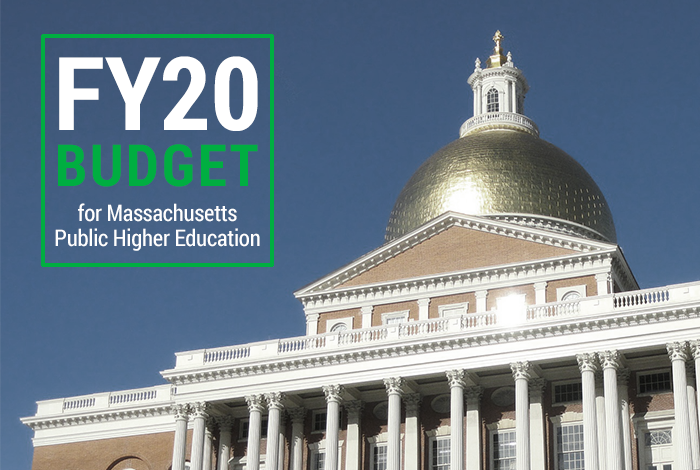

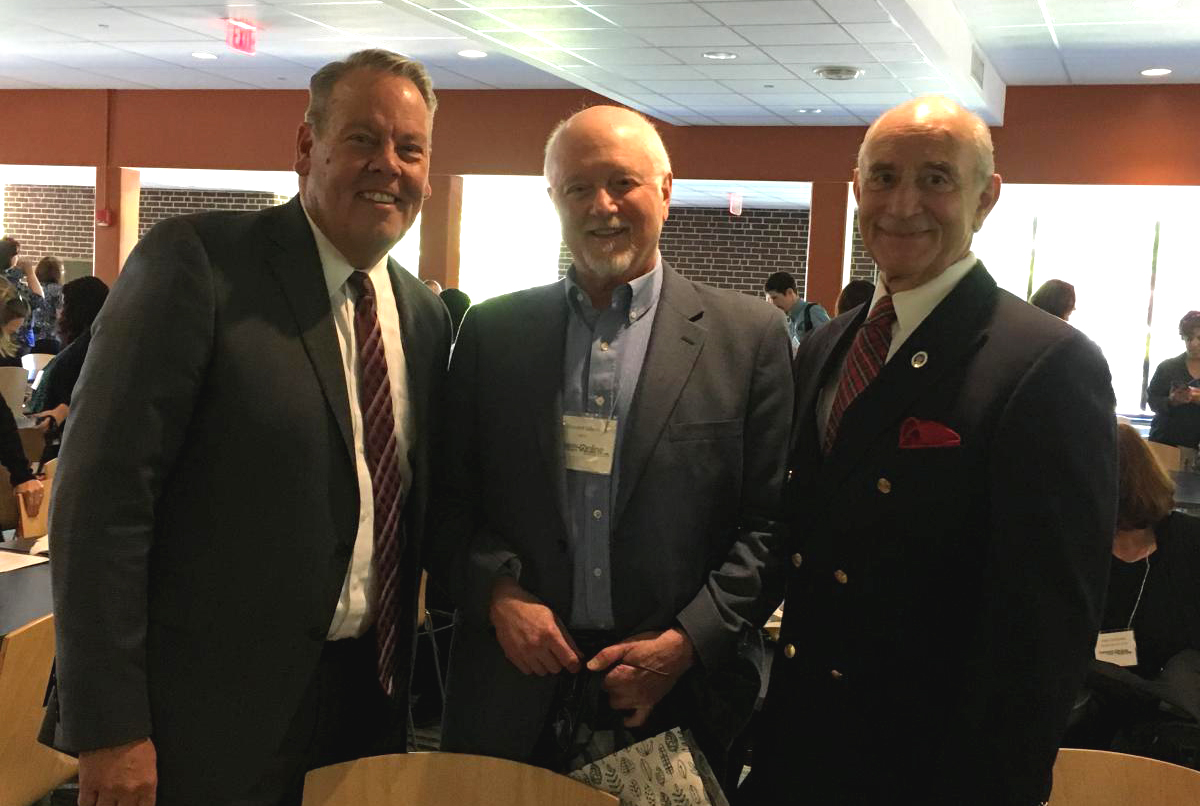
The 14th annual Massachusetts Colleges Online (MCO) Conference on eLearning was held on Friday, June 7th at Fitchburg State University. Over 250 attendees participated in conference sessions ranging from hands-on technology, teaching and eLearning, best practices in developing and managing eLearning programs, innovative applications of technology, and academic and administrative support. New this year were the Brainstorming Discussion Sessions, topic-based round-table conversations that encouraged attendees to share their experiences and document their conversations to share with others in the conference community.
A highlight of the conference was the Course of Distinction (COD) award luncheon where 21 faculty from across Massachusetts were recognized with the Course of Distinction (COD) award for excellence in online and hybrid teaching. Learn more about this years' winners and view the COD showcase.
Attendees also engaged with this year's keynote speaker, Dr. Kelvin Thompson, Executive Director of Online Design & Development at the University of Central Florida and Co-Host of the TOPcast Teaching Online Podcast who spoke about online course quality.
Massachusetts Colleges Online (MCO) is a collaborative of public state higher education institutions involved in the design, delivery, management, and assessment of online, blended, and other technology-mediated learning formats. The collaborative provides opportunities for all members to address the issues and challenges arising from professional practice, and the pooling of financial and intellectual capital toward the development and enhancement of services.

The Performance Measurement Reporting System is a new data tool to prompt constructive conversations about performance and accountability between and among DHE, our public colleges and universities, legislators and others, and to contribute to the discovery of insights that point to actions that lead to results.

NEW: On April 30, 2019 the Boston Foundation hosted a forum on proposed regulatory reforms to protect students in the event of college closures.
During the May 1, 2018 BHE meeting, Chair Chris Gabrieli announced that he and Commissioner Santiago would be convening a working group of stakeholders that would look at potential methods to assess and monitor the fiscal health of institutions of higher education, as well as ways to proactively mitigate the risks associated with institutional closures, and provide recommendations to the BHE. Referencing the closure of Mount Ida College announced precipitously in April 2018, Chair Gabrieli expressed a sense of urgency on behalf of the BHE to take action to support and protect students from imminent, disruptive closures.
The Working Group, which came to be known as the Transitions in Higher Education: Safeguarding the Interest of Students (THESIS), was promptly assembled and co-chaired by the Commissioner and Chair Gabrieli. THESIS met four times—in June, October, and December 2018, and in January 2019. At the January 22, 2019 BHE meeting, Chair Gabrieli presented the Working Group recommendations, which include:
The Board voted to receive the Working Group report (.PDF) and directed the Commissioner to advance its recommendations. The Board’s timeline calls for a stakeholder vetting process and target implementation for academic year 2019–2020.


PIF currently supports a network of projects that advance BHE goals through cross-system collaboration, innovative thinking and evidence-based practices at the campus and system levels

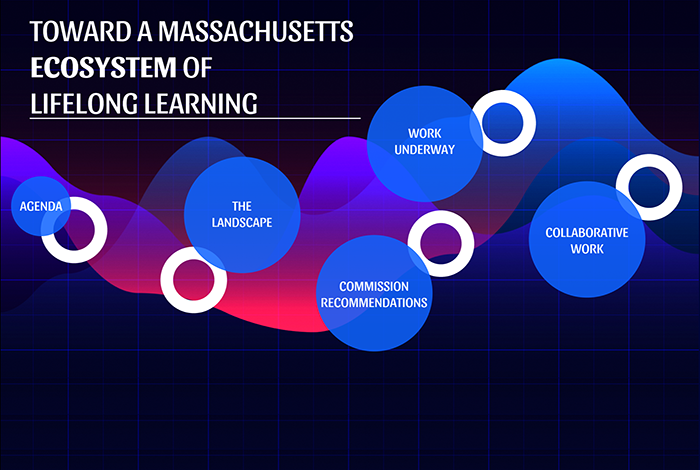
Governor Charlie Baker tasked a Commission on Digital Innovation and Lifelong Learning, chaired by BHE member and Commonwealth Corporation President and CEO, JD LaRock, with finding answers to that critical question. The Commission’s new report, Toward a Massachusetts Ecosystem of Lifelong Learning, recommends that the Commonwealth commit to becoming a first-in-the-nation leader in digital learning, and:

It’s a frustrating non-sequitur for a state known as a national education leader: the large number of Massachusetts college students who enroll in developmental courses after graduating from what is arguably the best-performing K-12 system in the country.
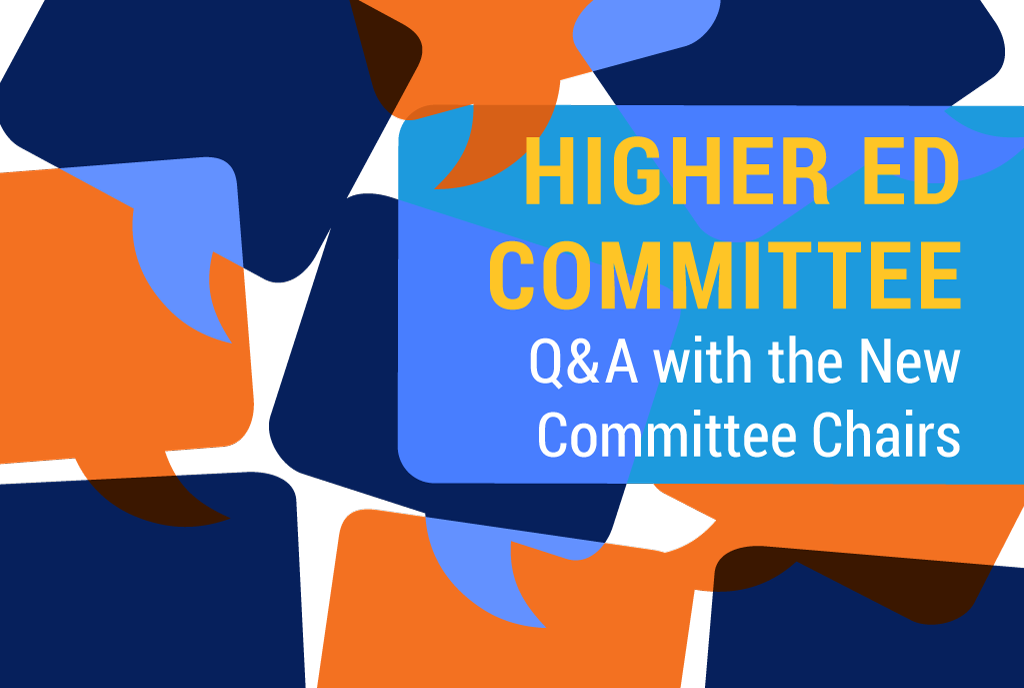
DHE Forward spoke with Senator Anne Gobi, Democrat from Spencer and State Representative Jeff Roy, Democrat from Franklin, about their background and first impressions of the higher education landscape.
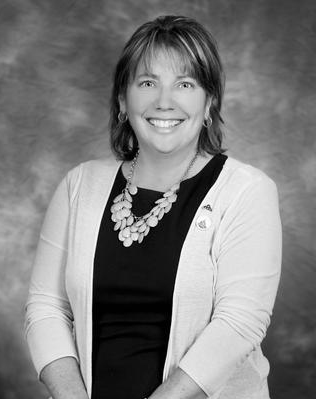
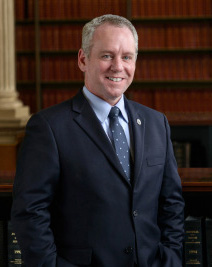
Left: Senator Anne Gobi // Right: Representative Jeff Roy
Senator Gobi: I graduated from Worcester State College. Now it’s a university – I can say I graduated from a university now. I was a history major and an education minor. I wanted to teach. [I chose Worcester State for] the teaching. It had a wonderful reputation and put out a lot of great teachers. And proximity - I wanted to want to stay at home. Then I went to Mass School of Law because I needed to go at night. I was teaching and it was the most affordable option for me.
Representative Roy: I started out at Worcester Polytechnic Institute and transferred to Bates College, which is where I ended up graduating from. Then I did one year at DePaul University School of Law and ended up graduating from Boston College Law School.
Senator Gobi: College debt and sexual harassment on campuses.
Representative Roy: I have heard about the closures of the privates due to the declining enrollments in college which we are facing.
Senator Gobi: That's a good question. I think one of the issues that that's happened with the privates is that they've gone outside of Massachusetts to attract students. Our community college system to me is really the lifeline to our communities. The public institutions like community colleges and the state university system are extremely important and much more affordable for students that are born and bred in Massachusetts. We know that kids that go to public campuses stay in Massachusetts. That's something that we need to capitalize on.
Representative Roy: There is a historical component to the fact that more kids go to private schools here (Editor’s note: More students attend private colleges and universities in Massachusetts only when the population of graduate students is factored in). But I think we'll probably see some shifts as the enrollment trends downward. If they hold true, we'll certainly make some shifts. And cost is something that's going to drive this shift. I remember when I was in college and being horrified that tuition crossed the $10,000 threshold. I said, oh my God, who can afford $10,000 to go to college? And now we're talking these privates are in the fifties, sixties, and some are even in the 70s. I don't think that's a sustainable model.
Senator Gobi: Students came in from Springfield College the other day. I asked them about tuition - $59,000 is the base. I had no idea. Wow. That's an incredible number. You have to pay back the loans and a lot of them have $100,000 plus in loans.
Senator Gobi: I think the oversight absolutely has to be there. I know that the Board of Higher Ed is already looking at implementing different things, and I know the private schools aren't too crazy about that, but you absolutely have to have the oversight. In addition to that, I wasn't really thrilled with everything that happened with Mount Ida. I don't think that that was an overly transparent process. There is the need for transparency to protect not just the students, but also the faculty because they were not protected.
Representative Roy: I would love to see greater communication between the accrediting agencies that are out there that have access to a lot of the data; perhaps we can develop a better means of communication and sharing of information between those bodies and the BHE. Perhaps with more information, we can see some of those red flags and make sure that we prevent another Mount Ida from happening.
Representative Roy: The food's better.
Senator Gobi: That's true! I think that's part of our job now, we're going to have an opportunity to go out and hopefully visit all of the campuses.
Representative Roy: There's going to be a Gobi-Roy bus!
Senator Gobi: We'll take it out on the road for visits. I think one of the big things is that colleges are really looking more at what communities need and what the future workforce needs. The schools realize that they need to look at the nontraditional students. And I think that the schools are doing a much better job of that, bringing in those nontraditional students and finding pathways for success and employment for them as well.
Representative Roy: Like the Senator said on credentialing and certification - maybe a student's not going to get a bachelor's degree, but they should walk away with something of value from the years that they spent in higher education. We want to give an experience for students who may not make it all the way, but can walk away with something that's useful to them and also useful to employers and the economy in Massachusetts.
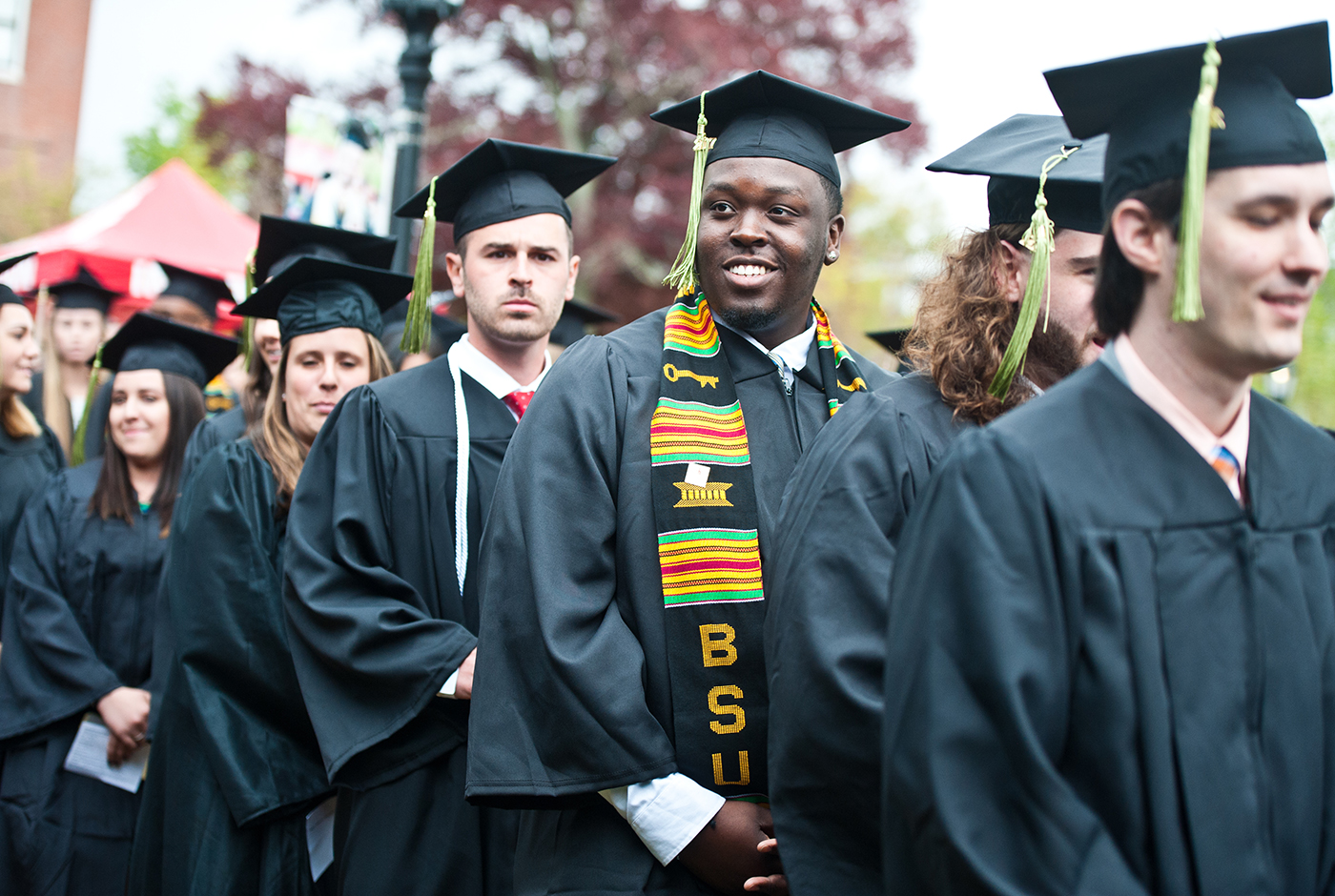
They are the hardest numbers to move: persistent racial and socio-economic gaps in student opportunity and achievement. While Massachusetts can boast of more adults with college degrees than any other state, it also has substantial rates of income inequality and some of the fastest-growing college costs in the U.S., according to a recent report the New England Board of Higher Education. These inequities contribute to sizeable gaps in student performance and completion and are the target of a new strategic push by the Massachusetts Board of Higher Education to make equity the #1 policy priority for the state’s public colleges and universities.
At the March 12 Board of Higher Education meeting, the presidents of three institutions – President Clark of Bridgewater State University, President Douglas of Bristol Community College and President Glickman Massasoit Community College – presented an overview of their collaborative work to further the BHE’s equity agenda. Their efforts, from diversifying high-demand nursing programs to making course materials more affordable, are resulting in real change for students in the South Coast region.
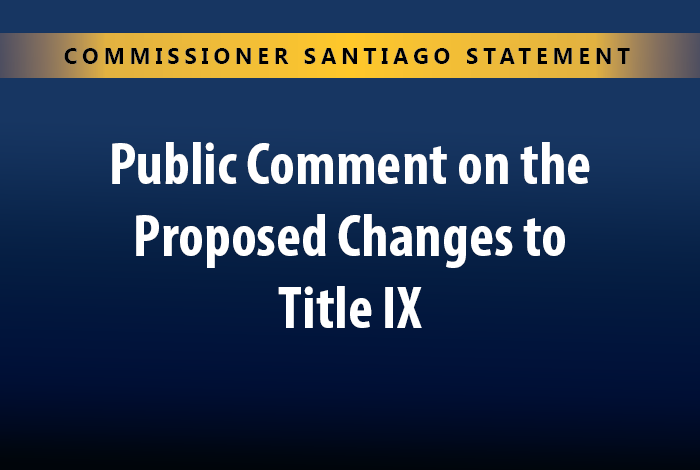

In the last edition of the DHE Forward, I wrote about the Board of Higher Education’s historic move to establish Massachusetts’ system of public higher education as the first in the nation with equity as its top statewide policy and performance priority. Two weeks ago, I was pleased to share our equity agenda and goals with members of the Black and Latino Legislative Caucus at their monthly convening.

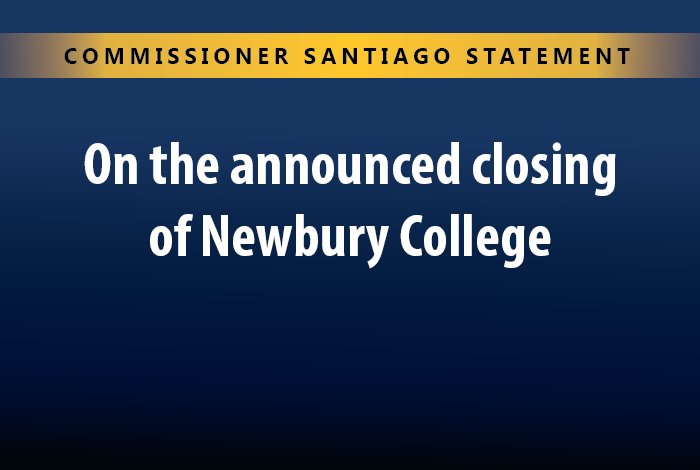
"It is a sad occasion when a college announces plans to close its doors. In this instance, I am pleased to see that campus leaders are working proactively and collaboratively with members of my staff to ensure an orderly closure process, which will benefit all members of the college community. The Department of Higher Education (DHE) continues to work with Newbury College to implement a closing plan that will help students explore all of their available options. Our expectation is that the College will announce a set of robust transfer programs in the coming weeks, allowing students and their families to make plans well before the close of this academic year."



It’s been one of higher education’s saddest ironies: a remediation system intended to fix what’s broken has itself needed repair. For every 100 Massachusetts community college students who enrolled in a traditional developmental math course in 2015, only 24 went on to complete a credit-bearing math course within two years.
“It was a tremendous waste of human capital, to lose so many students,” said Higher Education Commissioner Carlos Santiago who, in his prior role as deputy commissioner, embarked on a systemwide initiative to change the status quo. “This is a prime example of the need for ‘student-ready colleges.’ Of course we all want college-ready students, but the reality is we needed to change the way we do remediation in order to meet students where they are.”
Following an extended period of experimentation at the campus level, the Massachusetts Board of Higher Education on December 11th to usher in a new approach to remediation by allowing campuses to use a student’s high school GPA of 2.7 or above as an alternative measure for placement in credit-bearing math and English classes. A UMass Donahue Institute analysis of the campus pilots conducted since 2014 found that students placed into college-level math courses using the cumulative GPA standard were no more or less likely to succeed in completing a college-level math course than students placed through the Accuplacer, a standardized placement exam. Some national research suggests that high school GPA is a more effective predictor of academic outcomes because it measures learning over time and can be an indicator of student motivation, an essential non-cognitive characteristic of student success.
During an Academic Affairs Committee meeting preceding the BHE vote, Director of Academic Policy and Student Success Elena Quiroz-Livanis characterized the Donahue results as a “do no harm” finding that indicated placement by GPA was not a drag on student success. Further, Academic Affairs Committee Chair Nancy Hoffman noted that some high schools spend heavily to administer Accuplacer and might realize cost savings as a result of a policy change.
Analysis of the pilots led DHE Academic Affairs staff to conclude that statewide use of GPA could produce profound results: “…if the GPA standards were adopted at scale, more students would enter directly into credit-bearing mathematics courses, allowing more students to continue their post-secondary studies, and institutions would see an increase in retention and completion rates.”
While other states have also embarked on elements of remedial education reform, Massachusetts is known for its comprehensive approach, which includes not only the use of GPA for placement standards, but also co-requisite instruction and new math pathways to align instruction with a student’s major and career plans.
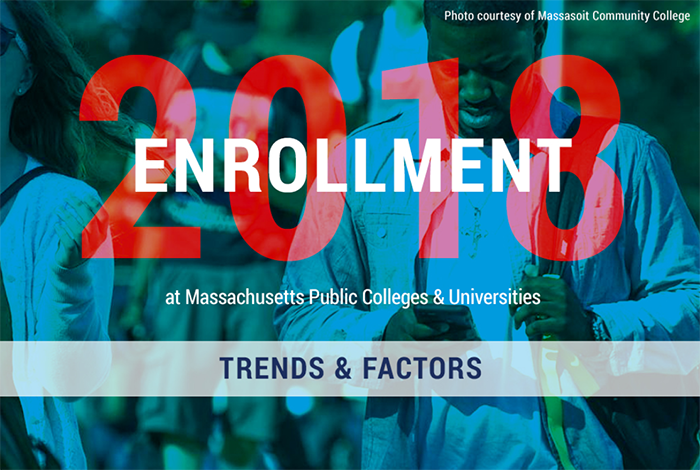
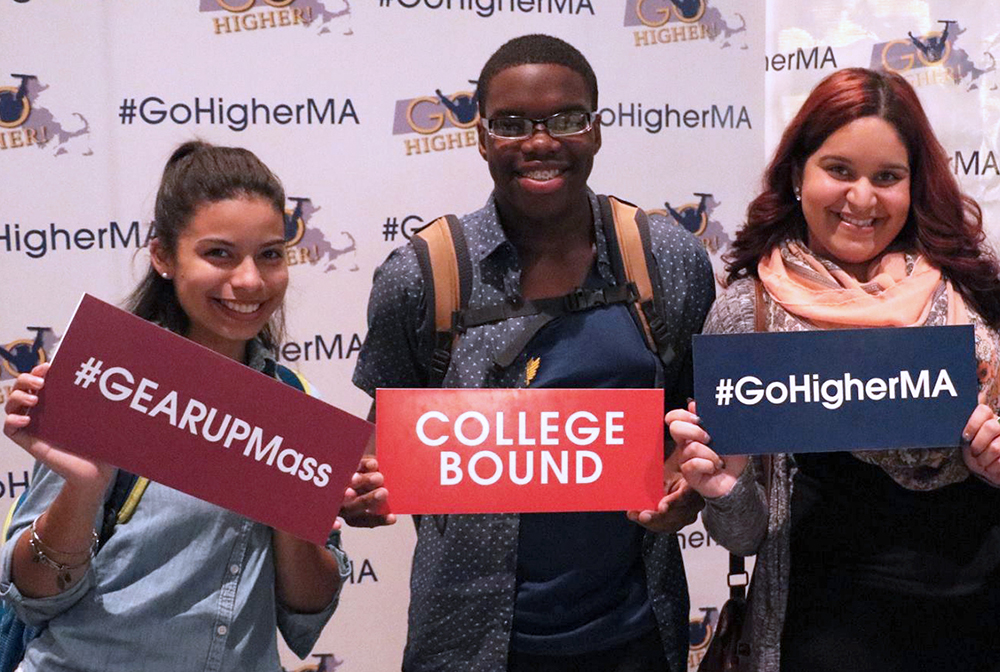
Boston, MA – October 30, 2018 – The U.S. Department of Education has awarded $29.7 million to the Massachusetts Department of Higher Education to continue funding GEAR UP (Gaining Early Awareness and Readiness for Undergraduate Programs), its successful college access and scholarship program, at 16 schools in seven urban districts across the Commonwealth.
The program, now in its 19th year, will provide tutoring, mentoring, and scholarships for 6300 middle and high school students in Boston, Holyoke, Lawrence, Lowell, New Bedford, Springfield and Worcester for the next seven years.
“Providing Massachusetts students with the academic support to succeed and graduate from high school with a college and career plan in place is a priority for our administration,” said Governor Charlie Baker. “Support from GEAR UP, coupled with scholarship opportunities and early college programs, plays a critical role in preparing our students for successful careers after graduation.”
Students and their families receive help with the college search and application process, SAT test preparation, financial counseling and academic support services intended to help students arrive on campus prepared to succeed in credit-bearing coursework.
“GEAR UP has been a proven success in Massachusetts, and I am proud that the Department of Education has been recognized for its achievements,” said U.S. Senator Edward J. Markey (D-Mass). “This investment of federal and state dollars is an effective boost for low-income and first generation students to get into and succeed throughout college. I am glad to see this program include communities all across the Commonwealth, and am excited to follow the accomplishments of these students as they graduate high school and enroll in colleges and universities.”
“Every hard-working kid who wants to get an education deserves the chance to do so – that’s why I’m thrilled that Massachusetts has received this GEAR UP grant,” said Senator Elizabeth Warren (D-Mass). “With this critical investment by the federal government, over 6,300 students from around the Commonwealth will get the help they need to graduate high school and go to college.
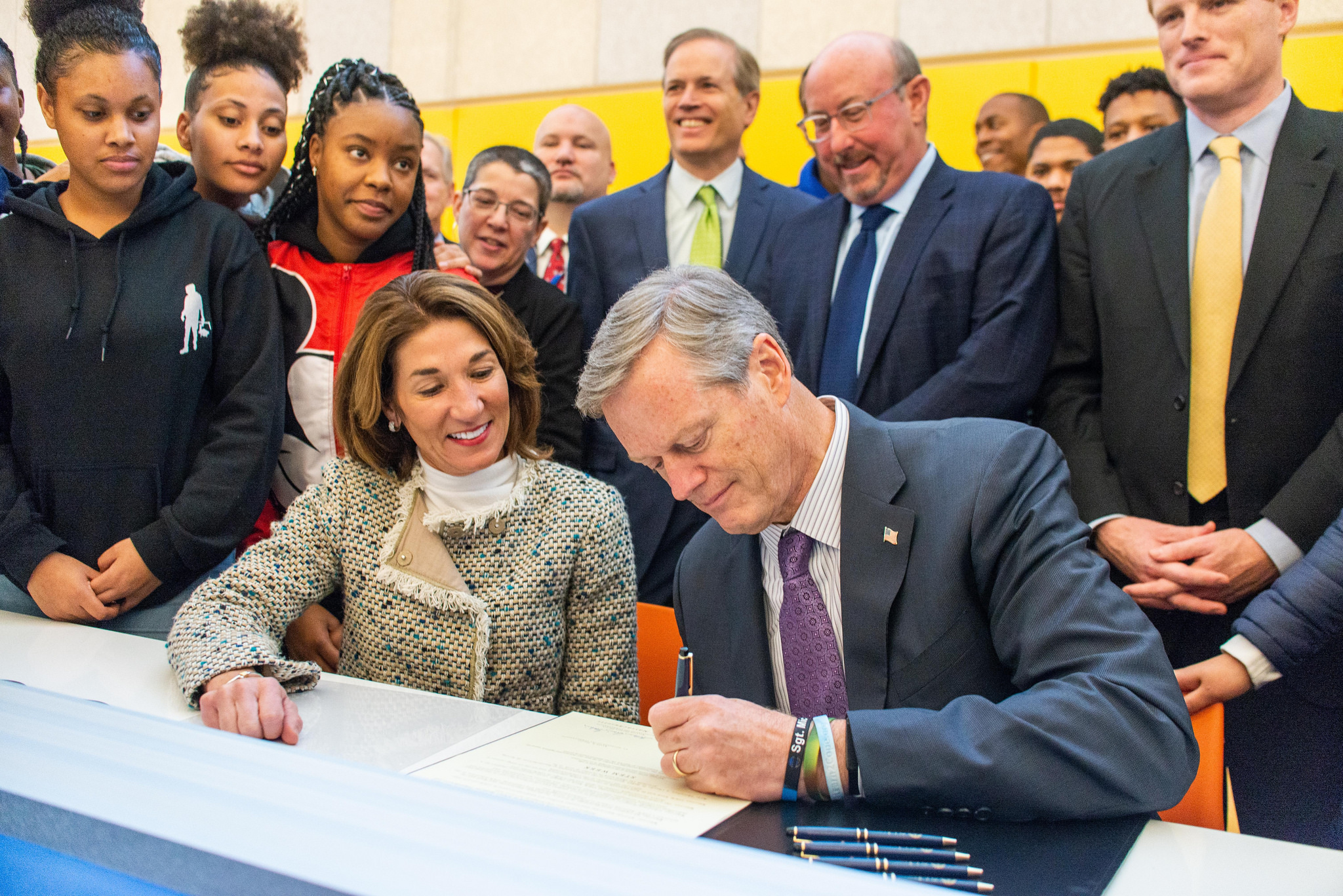

Every high school senior, college student, and adult student who will be attending college during the 2019-2020 academic year needs to complete the Free Application for Federal Student Aid (FAFSA) in order to apply for federal, state, and institutional financial aid. FAFSA Day Massachusetts provides free help statewide to students and families looking to complete the FAFSA.
The 18th annual FAFSA Day Massachusetts programs are being held on multiple dates at over 30 locations across Massachusetts, including one at our Office of Student Financial Assistance in Malden on Sunday, November 4. Families are encouraged to visit www.FAFSADay.org to view locations, dates, and times, to register, and to see a list of what to bring.
Many locations will have services available in various languages. FAFSA Day is staffed by volunteer financial aid and higher education experts available to provide families one-on-one assistance. FAFSA Day is a non-profit program sponsored by Massachusetts Association of Student Financial Aid Administrators, MEFA, American Student Assistance, and the Massachusetts Office of Student Financial Assistance. Over 18,200 students have been served during FAFSA Day events.
For questions, please call 877-424-7627 or e-mail fafsaday@gmail.com.Boston, MA – August 23, 2018 – Students heading to one of the state’s 15 community colleges this fall will be eligible for additional financial aid to fully cover the cost of their tuition and fees, thanks to a boost in financial aid funding proposed by the Baker-Polito Administration and included in the state’s FY19 budget recently enacted by the Legislature and signed by the Governor.
The new MassGrant Plus represents the first significant expansion of the state’s signature financial aid program in more than two decades.
Made possible by an additional $7.5 million in funding, MassGrant Plus will provide “last dollar” funding to bridge the gap between a low-income community college student’s federal, state and institutional financial aid awards, and the total cost of tuition and fees.
Additionally, the MassGrant Plus program will be open to part-time, degree-seeking students, provided they take at least two courses totaling six credits per semester. Currently, 63% of all community college students attend on a part-time basis. Until now, only full-time students have been eligible to receive aid through MassGrant, which is the largest of more than two dozen state grant, scholarship and waiver programs. The additional funding through the MassGrant Plus program effectively triples the amount of state financial aid available to more than 52,000 part-time community college students in the Commonwealth.
“MassGrant Plus is an opportunity to provide critical support for an expanded population of people interested in pursuing the opportunities a community college degree can create,” said Governor Charlie Baker. “We were pleased to work with the Legislature to pass this bill to aid students and increase their likelihood of earning an associates’ degree or transferring to a four-year institution to earn a bachelor’s.”
“Removing financial barriers to obtaining an education will encourage more low-income students in the Commonwealth to view higher education as an obtainable next step in their career,” said Lt. Governor Karyn Polito.
“Low-income, first-generation college students are disproportionately represented at community colleges, and due to financial pressures, the least likely to earn degrees and certificates on time or at all,” Education Secretary James Peyser said. “These additional scholarships will make it possible for many students to complete their degree, and not carry tremendous amounts of debt as they transfer to a four-year institution.”
“We’re very pleased that Governor Baker and the legislature are moving so decisively to invest in our community college students,” said Carlos E. Santiago, Massachusetts Commissioner of Higher Education. “We’re hopeful that with increased financial assistance we’ll see more students able to complete their degree programs and move into good jobs or continue on to earn bachelor’s degrees at four-year colleges and universities.”
Students eligible for MassGrant Plus could see a substantial increase in the amount of financial aid they receive. On an annual basis, tuition and fees for full-time students at a Massachusetts community college averaged $6,304 during the last fiscal year. That total is expected to increase by an average of 3-4% in the upcoming academic year.
Along with meeting certain income requirements, MassGrant Plus recipients must also complete a Free Application for Federal Student Aid (FAFSA) by an extended deadline of November 1.
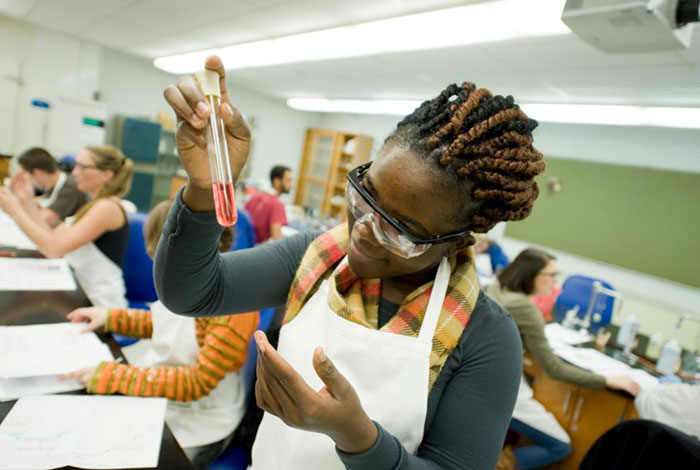
Boston, MA – July 24, 2018 – The Massachusetts Department of Higher Education has been awarded $1.5 million by the National Science Foundation (NSF) to develop MassTeach, a new model for increasing and diversifying the ranks of educators who are prepared to teach science, technology, engineering and math (STEM) in high-need school districts.
The five-year grant was awarded through NSF’s Robert Noyce Scholarship Track (Award # 1748400). It is the first of its kind awarded to a state higher education system and will be used to simultaneously address two critical issues: the overall shortage of trained and licensed STEM instructors and the lack of under-represented minorities currently teaching in the Commonwealth’s K12 classrooms. The new program, intended to be both sustainable and scalable, will utilize “A2B” (Associate to Bachelor’s) degree pathways that are part of the statewide MassTransfersystem. MassTransfer allows students to begin their undergraduate education at one of the state’s community colleges and then transfer to any state university at a substantial cost savings and without a loss of credit.
“What’s exciting about MassTeach is that it is not a stand-alone initiative that will end once the federal grant is spent,” said Carlos E. Santiago, Massachusetts Commissioner of Higher Education. “This program is built on the solid foundation of our new transfer system, regarded as one of the most comprehensive and student-friendly systems in the nation. We’re very pleased that the NSF has recognized our ability to effectively move STEM teacher candidates from community colleges to state universities to urban districts where their talents can be put to good use.”

Did you know that 70% of the jobs in Massachusetts will require a college degree or certificate? For most young people in the Merrimack Valley, a high school diploma won’t be enough to secure a good job that pays enough to support a family.
That’s why State Representative Andres X. Vargas is teaming up with Massachusetts Commissioner of Higher Education, Carlos Santiago to give families information they need about choosing and affording college.
Please join us Thursday, September 27th at 6 pm at UMass Lowell Innovation Hub (Harbor Place Building), 2 Merrimack Street in Haverhill for “Go Higher!” a free event to introduce programs and opportunities at Massachusetts public colleges and universities.
Event Highlights
Parking
Goecke parking garage is directly across the street from Harbor Place, on Merrimack Street behind Pentucket Bank.

The Liberty Mutual Insurance LEADA@Liberty Scholarship is open to students who identify as being African-American or of African descent. Students must enrolled as a full-time (at least 12 credits) first or second year student at a Community College within the state of Massachusetts for the 2018-2019 academic school year, and be signed up for the Commonwealth Commitment Program. The scholarship will be awarded annually to four eligible students, each receiving $2,500 per year for the four years of his or her college career.
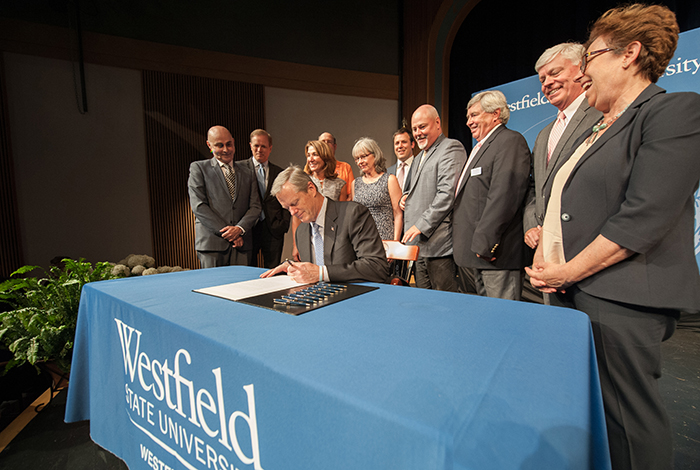
July 10, 2018—Governor Charlie Baker participated in a ceremonial bill-signing for An Act providing for capital facility repairs and improvements for the Commonwealth, which authorizes approximately $3.9 billion to address the Commonwealth’s statewide capital needs, including higher education campuses, health and human services facilities, state office buildings, public safety facilities, and courts.
Governor Baker signed the bill on the campus of Westfield State University, which is planning a renovation of Parenzo Hall into a state-of-the-art facility that will house technology-rich classrooms and two new academic centers. The project is part of the Administration’s new strategic framework for long-term capital investments in public higher education campuses, which prioritizes projects system-wide to address the deferred maintenance backlog and to support workforce skills needs.
“Westfield State University is one of many examples of how these capital dollars will be put to good use to renovate the campus and provide state-of-the art classrooms and learning spaces for students,” said Governor Charlie Baker. “We thank the Legislature for their collaboration to authorize nearly $4 billion in spending to refurbish and improve our schools, hospitals and courthouses across the state.”

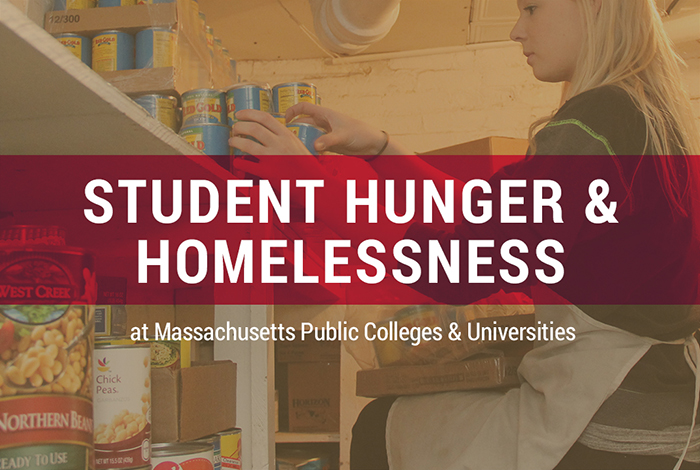
On Friday May 11,the Massachusetts Department of Higher Education and the Wisconsin HOPE Lab jointly released the results of the first state-level study of food and housing insecurity and homelessness among college students. Massachusetts is the first state to team with HOPE Lab Founder Sara Goldrick-Rab and her team to look at these issues from a system level, with the goal of having the data inform policy interventions. As the Massachusetts report indicates, the state's results closely mirror the findings of a national HOPE Lab study, with a few critical exceptions.

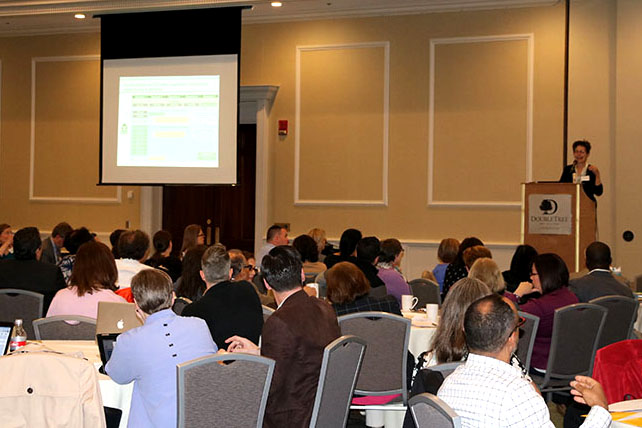
On Friday, April 27, the DHE’s Co-requisite Statewide Institute conference took place in Leominister. This year’s conference focused on highlighting campuses' efforts to bring the co-requisite model to scale either in English, mathematics, or both. Co-requisite education gives students who require remediation to take developmental and credit-bearing courses simultaneously. Students progress more quickly and successfully through degree requirements, which in turn reduces costs and boosts completion rates—two of the DHE’s “Big Three” objectives.
Also held in April was the DHE’s seventh annual Advancing a Massachusetts Culture of Assessment (AMCOA) Conference. The April 20 conference was titled "The Continuing Importance of Assessment: From the Classroom to Program to Institutional Levels."
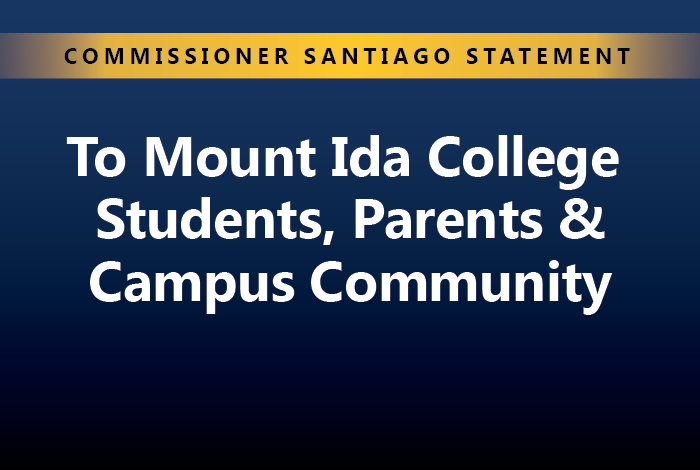

March 5, 2018—“All of us have the power as students to organize together and demand a system that works for us,” UMass Amherst student Nathalie Amazan told the 500 attendees of Public Higher Education Advocacy Day at the Massachusetts State House on March 5. “We have the power to do that today. That’s why we’re here.” Coordinated by the Public Higher Education Network of Massachusetts (PHENOM), students, faculty and staff of Massachusetts public colleges and universities spent the day lobbying their legislators in the House and Senate on a combination of short- and long-term asks, from action on bills currently before the Legislature focused on targeted financial aid and student loan fraud protection, to a commitment of $500 million in tax revenue for public higher education should the so-called “millionaire’s tax” be included as a ballot item and passed by voters this November.
The issue of affordability of public higher education has been highlighted by many other leaders and stakeholders in recent weeks. The week prior to Advocacy Day, the Massachusetts Budget and Policy Center released Educated and Encumbered, a report finding that the per capita debt burden of all graduates from Massachusetts’ four-year public colleges and universities has more than doubled since 2003. In January, Governor Baker, consistent with recommendations from the Massachusetts Board of Higher Education, proposed a $7 million increase in grant aid for the neediest community college students in his FY2019 budget request, as well as funding for early college expansion. Affordability was also a prominent theme in UMass President Marty Meehan’s “State of UMass” speech earlier in March, in which he pledged to tackle it by lowering costs and increasing revenue through expansion of online education, partnerships with businesses and nonprofits, and private fundraising.
Media coverage of Advocacy Day:
Photo credit: PHENOM Facebook page

February 2, 2018—Thanks to the development of new data reporting tools, Massachusetts high school counselors and college advisors will for the first time be able to monitor whether students have filled out the Free Application for Federal Student Aid (FAFSA), which determines college applicants’ and returning students’ eligibility for Pell Grants, Work Study, education loans, and Massachusetts State Aid programs.
The Departments of Elementary and Secondary Education (DESE) and Higher Education (DHE) collaborated in the development of new reports that will be available to counselors through Edwin Analytics, a powerful reporting and data analysis tool that gives authorized users access to a variety of reports on educational data. Beginning today, counselors and other authorized school and college personnel will have access to two new FAFSA reports that allow them to see whether a student has submitted a completed FAFSA to the U.S. Department of Education, or whether the application has been marked “incomplete” or “not found.” Counselors will be able to follow up with individual students to see if they need assistance in completing the FAFSA, and will also be able to monitor the overall FAFSA completion rates for their individual high school and district.
“One of the biggest reasons students do not graduate college is because they lack the financial resources to complete their degree. With this new data tool that helps counselors and advisors check whether individual students have completed their FAFSA, we hope more Massachusetts students will receive the necessary state and federal financial aid they qualify for in order to complete their degree,” Secretary of Education James Peyser said.
“I’m delighted that our respective agencies were able to collaborate on a plan to give school counselors a bird’s eye view of FAFSA completion rates,” said Carlos E. Santiago, Massachusetts Commissioner of Higher Education. “Not every student has a parent at home who is familiar with the college application process and can offer guidance in applying for financial aid. Massachusetts cannot afford to leave any students on the sidelines. With employers hungry to hire our graduates, it’s our job to make sure that every aspiring student has access to college and the career of his or her choice.”
“I’m happy to put this tool in the hands of high school counselors and advisors so that they can easily know when they have to remind students and families about this key step in the college admission process,” Acting Elementary and Secondary Education Commissioner Jeff Wulfson said. “We want to help schools and families work together to make college an option for all students.”
“I am super excited that school counselors will now have access to FAFSA completion data at their fingertips,” said Robert Bardwell, Director of School Counseling at Monson High School in Monson, MA and a member of the Board of Directors of the National Association of College Admission Counseling (NACAC). “Counselors who can either help their students complete the form or refer them to other resources for assistance may make the difference for a student wishing to achieve a higher education degree or certificate. Many other states already provide this information to school counselors so it is wonderful to see Massachusetts doing the same. Our students will no doubt be advantaged because of this new resource.”
While Massachusetts currently ranks 5th in the nation for the percentage of students who complete the Free Application for Federal Student Aid, the overall number of high school seniors who complete the FAFSA still hovers at 48.5% statewide. Officials hope the new reports, coupled with a streamlined application and earlier filing deadline, will spur even higher completion rates. For Massachusetts students, the FAFSA filing deadline for consideration of state and federal aid is May 1, 2018, although many individual colleges have earlier deadlines.
The Massachusetts Association of Student Financial Aid Administrators (MASFAA) is sponsoring FAFSA Completion events for students and families through the month of February, at Mount Wachusett Community College, Middlesex Community College (Lowell campus), North Shore Community College (Lynn campus) and Quincy College (Quincy and Plymouth campuses). Visit their website for more information or to register for free assistance at one of these events.

January 23, 2018—In an effort to help high school students prepare for success in college, the Boards of Higher Education and Elementary and Secondary Education invited 21 higher education/K–12 partnerships to move forward from the preliminary stage of the Massachusetts Early College designation process and submit an application for the final phase of the process. The Commonwealth was also able to award more than $80,000 in grants to these programs to support their work developing early college programs.
The $10,000 competitive planning grants will support the work for programs to meet the criteria necessary to achieve the early college designation. These programs are expected to apply for final designation in February, with the goal of launching programs this fall.
“Early college programs are crucial for exposing students to the opportunities higher education can create and with these designations, more students will be able to earn college credits at no cost,” Governor Charlie Baker said. “We are pleased to work with these school districts to expand or launch early college programs so their students are better prepared for successful academic and professional careers after high school.”
“Successful early college programs boost college completion rates for students by preparing them with challenging college-level courses,” said Lt. Governor Karyn Polito. “We are happy to be able to offer these grants that will help create high-quality early college programs for more students across the Commonwealth.”
Early college programs combine traditional high school courses with an opportunity to earn college credit at a public college or university, typically in a particular career pathway.
Successful early college programs make college more accessible to low-income students by giving them an opportunity to learn in college-level courses while at the same time earning college credits, at no cost, which helps ease their financial burdens later. Early college has also been shown to boost college completion rates for low-income students, minorities and first-generation college-goers.
In June, the Board of Elementary and Secondary Education and the Board of Higher Education agreed on criteria that will enable programs to become designated early college programs. Through the designation process, the Departments of Higher Education and Elementary and Secondary Education asked K–12 schools, community colleges and state universities to jointly design models. There are five design principles for a designated early college program, including equitable access for all students.
“By creating designated early college programs, we are breaking down barriers between high school and higher education and creating a more seamless path for students to move to college and careers,” Education Secretary James Peyser said. “Successful early college programs do more than just prepare a student theoretically; they make students realize college is an achievable goal for them by exposing them to college-level work and college credits before they graduate high school.”
“I’m delighted to see the Commonwealth making this commitment to early college programs,” said Carlos E. Santiago, Commissioner of Higher Education. “We know that 70% of Massachusetts jobs will require today’s high school students to have some kind of post-secondary degree or certification. Early college will help us create a new pipeline to college for students who may have felt it was beyond their reach.”
“We know that early college programs help motivate students,” Elementary and Secondary Education Acting Commissioner Jeff Wulfson said. “We want to lead the nation in making these programs available in our high schools.”
Last March, Governor Charlie Baker announced efforts to significantly increase the number of early college seats available to high school students. Currently there are approximately 2,400 students enrolled in early college programs around the state.
In 2016, the Boards of Higher Education and Elementary and Secondary Education looked at whether the state could devise an early college strategy. They commissioned a study, done by Parthenon-EY Education Practice, to look at what exists in Massachusetts and the possibility of expanding successful models. The report found early college is a promising model that narrows educational opportunity gaps, and existing programs were a powerful base from which to build a broader statewide early college initiative.
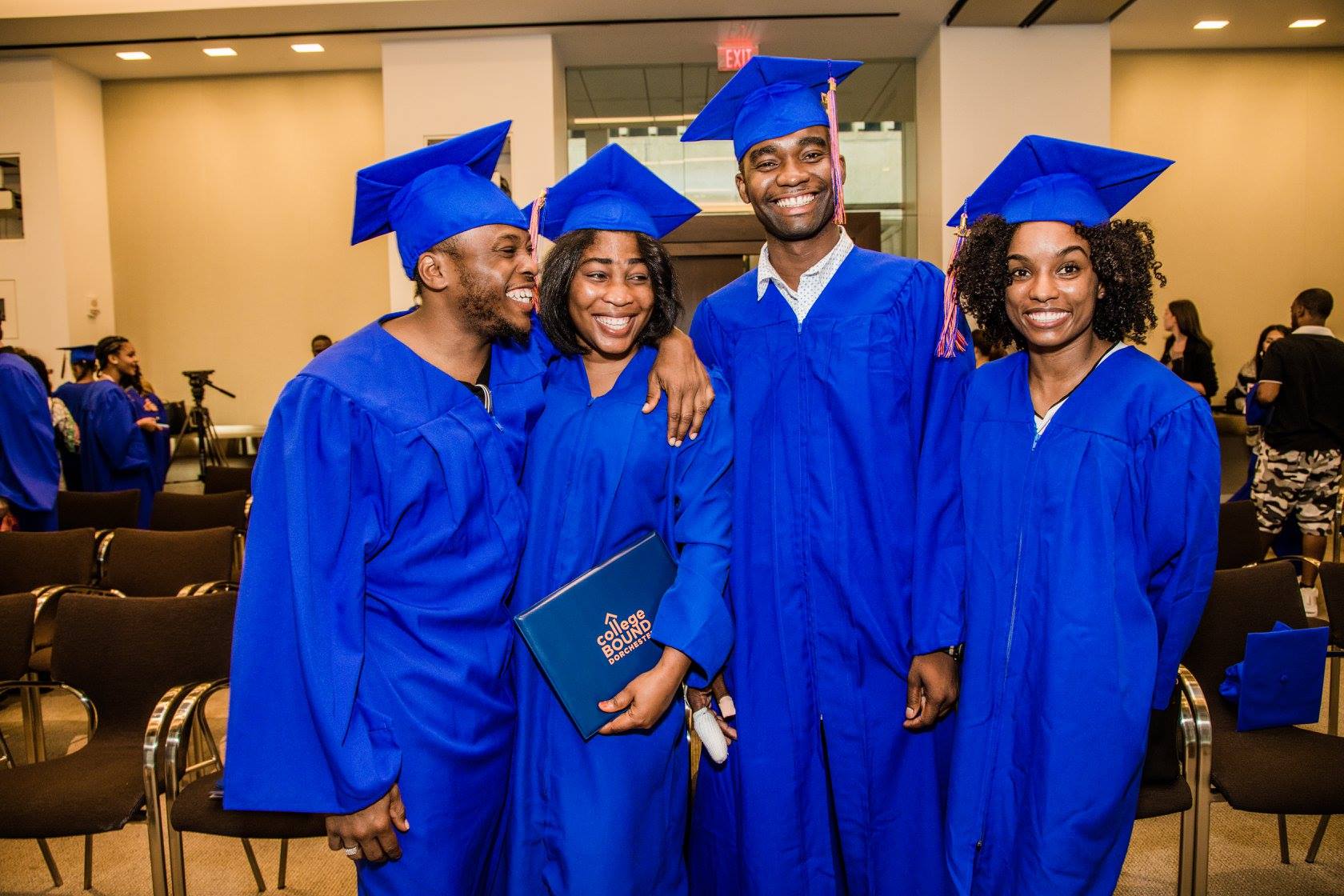
January 19, 2018—The Massachusetts Department of Higher Education is pleased to announce the 2018 winners of its competitively awarded Bridges to College grants, established by the Massachusetts Legislature in FY14 to help prepare adult learners for success in college. With declining high school enrollments and 600,000 older workers set to retire in the next decade, growing numbers of non-traditional adult students will be needed to fill jobs in high-skilled industries that drive Massachusetts’ economy. The state’s public colleges and universities are working with the non-profit sector, businesses and local industries to create programs and opportunities to help adult learners transition to college and career opportunities.
Four awardees were chosen to receive grants from among 12 competitors for funds:
If you missed it: Last month, the Massachusetts Board of Higher Education heard a presentation on the growing importance of adult learners.
Photo credit: College Bound Dorchester Facebook page
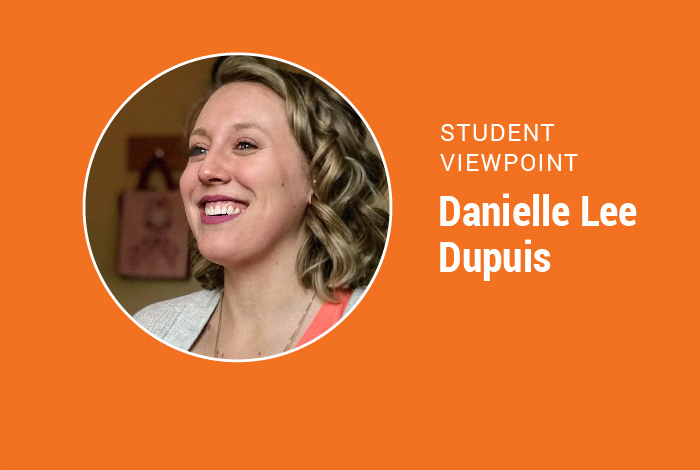
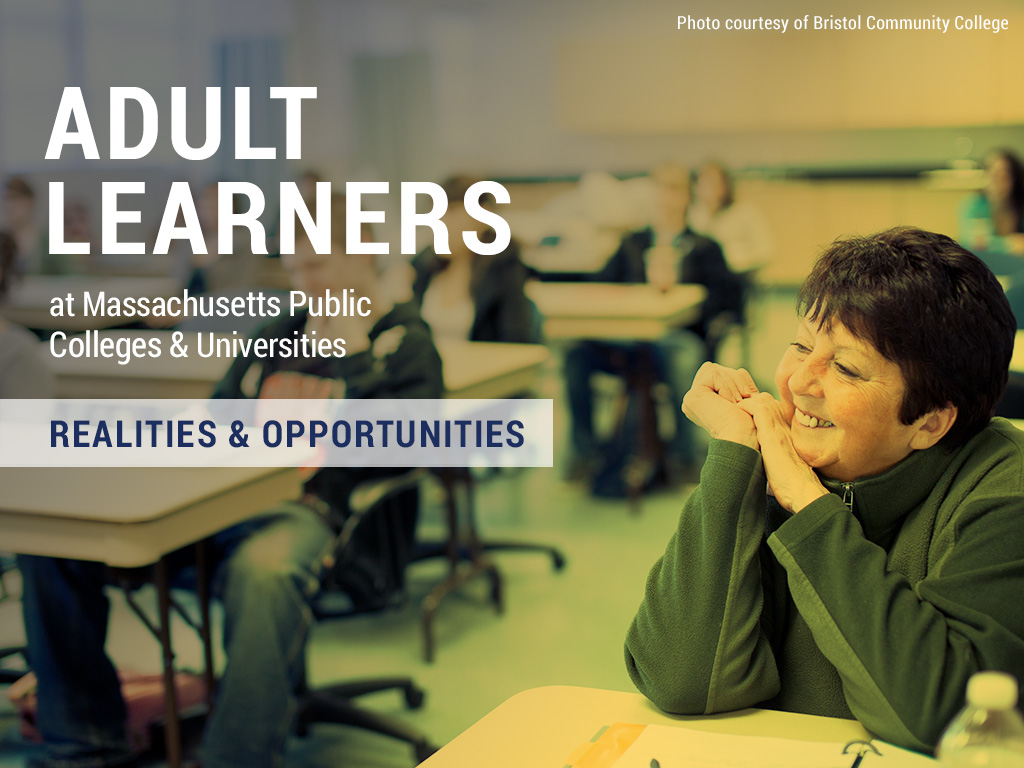
_170923-H-NI589-0007_(36602415074).jpg)
“Hurricane Maria left a devastating impact on the Commonwealth of Puerto Rico, causing major disruptions for students and families who have relocated to Massachusetts,” Governor Baker said. “Our administration is working collaboratively to provide critical resources and opportunities for our fellow Americans from Puerto Rico and the U.S. Virgin Islands during this difficult time, and I am pleased the board approved this important opportunity to provide in-state tuition to make education more affordable for these students.”
To qualify for in-state tuition rates, students must provide documentation of their displacement and meet all the admission and transfer requirements of a public higher education institution. Although students will be still required to pay fees and other education-related expenses, the savings differential – in-state versus out-of-state - can be significant.
For example, an evacuee enrolling at Holyoke Community College, where approximately 50 individuals displaced by the hurricane have already signed up for the spring semester, would pay an annual rate of $4,272 instead of an out-of-state tuition rate of $9,216. While students will continue to remain eligible to participate in federal financial aid, students will not be eligible for state financial assistance because they will not have established full residency in the Commonwealth.
“Granting in-state tuition rates to students relocating temporarily to Massachusetts because of the devastation caused by Hurricane Maria is an important part of what the Commonwealth is doing to help people from Puerto Rico and the U.S. Virgin Islands,” Education Secretary James Peyser said.
“While we expect the number of students who take advantage of the resident tuition rates to be modest, the Board’s vote today helps ensure that any student who wants to continue with his or her education here will find it easier to do so,” said Massachusetts Commissioner of Higher Education Carlos E. Santiago, who is a native of Puerto Rico. “Our goal is to make sure that no one’s college dreams are derailed by the roar of a hurricane.”
“I’m very proud of the Board for taking action today to assist student evacuees,” said Chris Gabrieli, Chairman of the Board of Higher Education. “This is a gesture that aligns with the Baker-Polito Administration’s plans to request financial assistance for local school districts that are receiving an influx of evacuees. We are helping those who have been uprooted from their communities and need support as they begin to recover from significant losses.”
In November, Governor Charlie Baker announced plans to request additional school funding to help local school districts pay for the education of children who have been evacuated. The number of evacuees fleeing the impact of Hurricane Maria has increased in recent weeks, and additional families are expected to arrive after the holidays.
This is not the first time Massachusetts extended relief and humanitarian aid to students and families impacted by federally declared disasters. Students displaced by Hurricane Katrina were offered in-state tuition waivers in 2005-2006. The BHE also approved a 2001 tuition waiver for spouses and dependents of victims of the September 11th attacks.
Photo credit:U.S. Customs and Border Protection - 170923-H-NI589-0007, Public Domain, Link
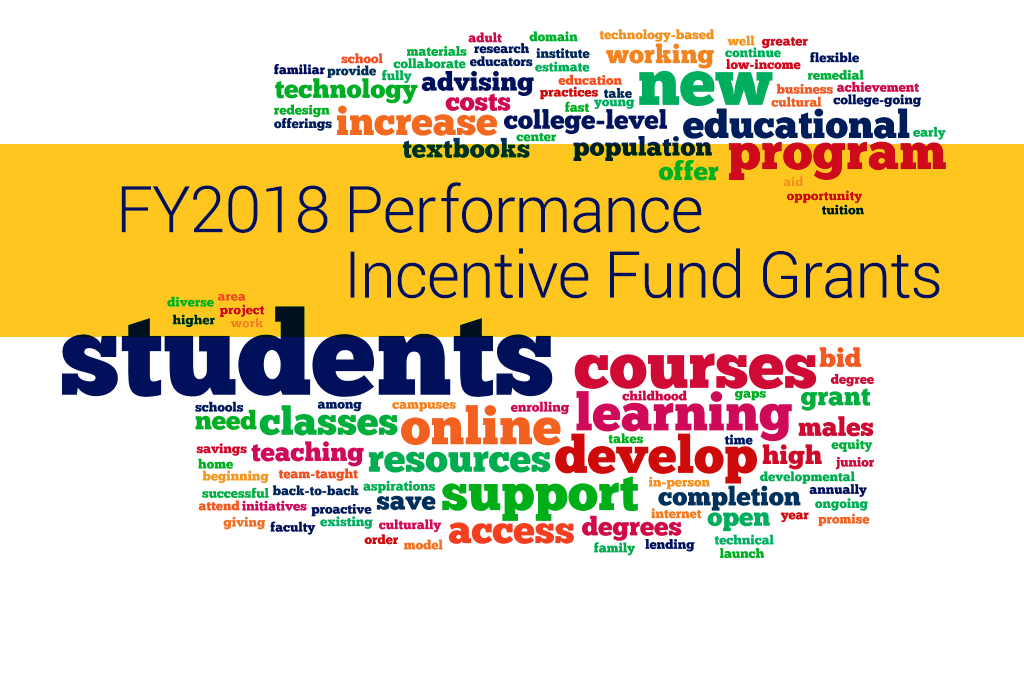
December 11, 2017 — The Baker-Polito Administration announced $1.2 million today in grants to sixteen Massachusetts public colleges and universities to make college more affordable and accessible through enhanced digital learning opportunities.
Performance Incentive Fund (PIF) grants are issued by the Department of Higher Education and seek to encourage the state’s higher education institutions to produce cost savings for students through collaboration across the campuses. Since 2012, the fund has awarded more than $25 million in grants.
“Performance Incentive grants allow our state colleges and universities to explore new digital innovations in teaching and learning to make higher education more affordable and accessible for students across the Commonwealth,” said Governor Baker. “Massachusetts is poised to be a leader in online learning, and we are pleased these grants will help our public higher education institutions achieve that goal.”
Last month, Governor Baker announced he will establish a new Commission on Digital Innovation and Lifelong Learning to develop recommendations that will lead to more online learning opportunities for Massachusetts residents to obtain education and skills for in-demand fields.
“New approaches are needed to expand higher education opportunities for all Massachusetts residents, particularly for those who need flexibility and are not able to take traditional classes on a college campus,” Lt. Governor Karyn Polito said. “Incentivizing grants like these will help ensure the Commonwealth’s higher education institutions can provide services that meet the demands of today’s students.”
The Department of Higher Education strives to improve college access, affordability and completion of degrees and certificates.
“These grants are part of the Department of Higher Education’s strategic focus on increasing opportunities for students to earn credentials that will position them for good jobs and continued career growth, especially in high-skilled industries that fuel the state's economic development,” Secretary James Peyser said.
"From the start, the Performance Incentive Fund has encouraged campus leaders to think in new ways about some of the most intractable problems we face in higher education," said Carlos E. Santiago, Massachusetts Commissioner of Higher Education. "We're now beginning to see the fruits of that effort, as we award grants to campuses that want to build on the gains and successes of prior years' funding."
"It's exciting for me to see our public campuses emerging as leaders in digital learning innovation, which is a key strand running through this year's grant proposals," said Chris Gabrieli, Chairman of the Massachusetts Board of Higher Education. "We're also seeing a lot of energy go into work to improve the remedial coursework which, sadly, is required of thousands of our students who arrive on campus unprepared for college-level work. These efforts will help reduce barriers and accelerate the timetable for students to complete their degrees."
The following colleges and universities received Performance Incentive Fund grants to expand digital learning opportunities:
North Shore Community College - $100,000: The College will develop a new Flexible Learning Model with hybrid learning classes (in-person and online) and "fast track" seven-week, back-to-back courses to allow Liberal Arts Transfer students to accelerate completion of their associate degrees.
Bristol Community College - $75,000: The College will use the grant to support a new technology-based Proactive Advising program to aid its growing population of adult students as well as those who need remedial (developmental) courses before enrolling in college-level classes.
Cape Cod Community College - $79,952: Cape Cod Community College will increase its online course offerings to offer greater flexibility, advising and faster degree completion for working students. The College will develop new courses and redesign existing courses in order to offer three programs fully online: Liberal Arts, Business and Criminal Justice.
Greenfield Community College - $69,958: The College will build a Technology Lending Library program to provide basic home computer and internet access to 725 low-income students. College officials estimate that one-third of its students lack access to technology resources when they are off campus.
Massasoit Community College - $58,765 and Mount Wachusett Community College - $16,235: The Colleges will launch new initiatives to increase use of Open Educational Resources (teaching, learning and/or research materials that are in the public domain) in a bid to reduce the use of costly textbooks. The "Massasoit Millions" Initiative aims to save its students $1 million annually by 2019.
Northern Essex Community College - $199, 019: Northern Essex will collaborate with six other community colleges to reduce the time it takes for early childhood educators to earn degrees through new competency-based educational instruction designed for working professionals. The project will also increase costs savings for students by allowing them to access Open Educational Resources that reduce the need for textbooks.
Westfield State University - $66,178: Westfield State will continue to develop its Westfield Promise program at five area high schools, giving students the chance to take Westfield State courses online and on campus beginning in their junior year. The classes will be team-taught by high school and college faculty and will help students save on tuition costs while they become more familiar with college-level work.
The Department also announced:
- The expansion of the successful 100 Males to College program to Salem State University. The University will use a grant of $52,084 to support the college-going aspirations of young men of color from Salem, Lynn and Lawrence, most of whom will be the first in their family to attend college. A total of $346,382 was awarded to five campuses to support 100 Males to College programs, including grants to support ongoing programs at Springfield Technical Community College, Framingham State University, Worcester State University, and Bridgewater State University.
- Two grants awarded to Quinsigamond Community College in Worcester ($84,100) and Fitchburg State University ($54,239) to transform remedial education programs. Quinsigamond will expand use of its “co-requisite” English Accelerated Learning Program, which allows students to take credit-bearing and remedial courses at the same time. Fitchburg will implement a number of strategies, including a comprehensive redesign of its first-year math program and development of four math pathways aligned with students’ specific majors.
- An award of $100,000 to Bunker Hill Community College to develop a Center for Cultural Wealth and Equity, an institute that will foster culturally relevant teaching and learning practices.

On August 16, 2017, President Donald Trump signed the Harry W. Colmery Veterans Educational Assistance Act of 2017 into law.
Also known as the Forever GI Bill, the newly enacted law removes the 15-year time limit for Post-9/11 GI Bill beneficiaries to use their education benefits. Veterans who were discharged after January 1, 2013 will now be able to carry their eligibility for educational benefits throughout their life without those benefits expiring. Previously, a veteran eligible for Post-9/11 GI Bill benefits was required to use his education benefits within 15 years from his date of their discharge; if the educational benefits were not used in that timeframe, the veteran would lose them permanently.
Additional benefits provided in the Colmery Act include the restoration of educational benefits that can be lost when an institution suddenly closes. Students whose accredited institutions closed between January 1, 2015 and August 16, 2017 and who were unable to transfer any credits to a comparable program at another institution can now apply to have their educational benefits fully restored. This change will help the hundreds of veterans who were affected by the recent closures of Corinthian Colleges and ITT Technical Institutes. The new law also provides a semester’s worth of reimbursement for GI Bill users affected by future school closures.
More information on the Colmery Act and all of its GI Bill enhancements can be found on the US Department of Veterans Affairs’ website.
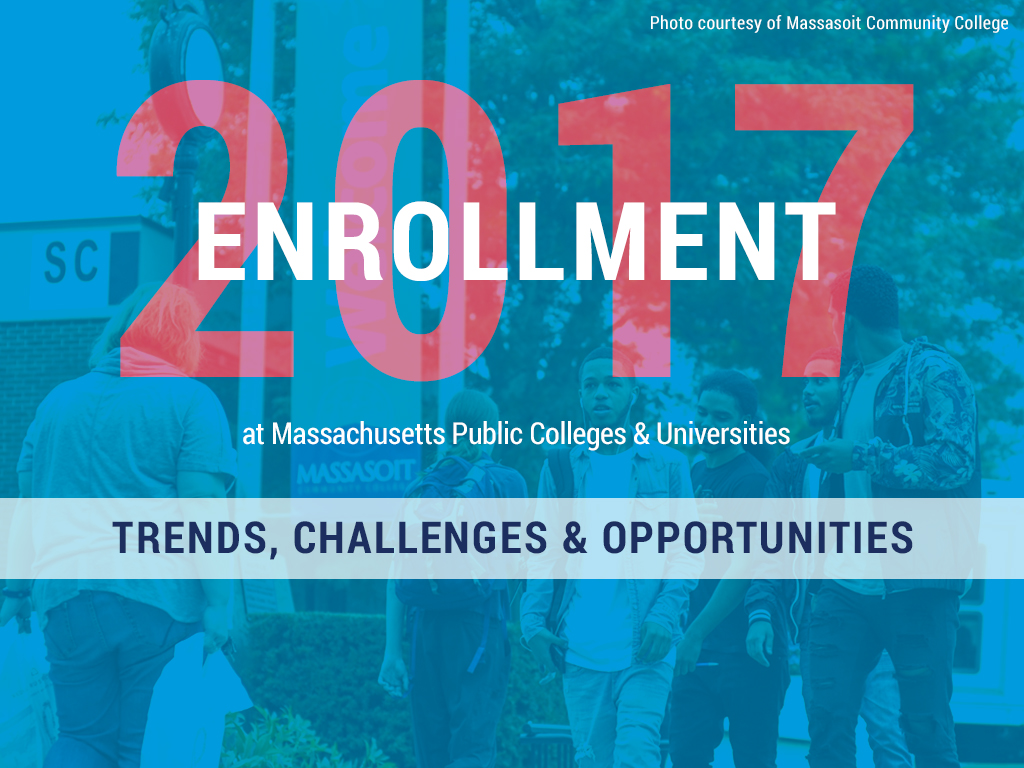
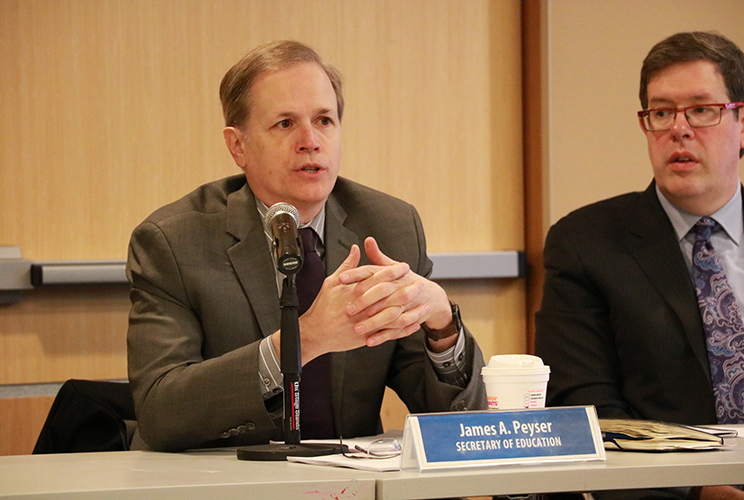
October 31, 2017—The Massachusetts Board of Higher Education today authorized the state’s Commissioner of Higher Education to submit an application to join the State Authorization Reciprocity Agreement (SARA), a multi-state approach to regulating the growing number of online learning programs offered by colleges and universities across the United States.
The Board’s unanimous vote follows an extensive review of what joining SARA would mean for the Commonwealth. Last year, Massachusetts Education Secretary James Peyser chaired a legislative Special Commission on Interstate Reciprocity Agreements which issued a report that was reviewed by the Board of Higher Education as part of its decision-making process to join SARA.
In December 2016, the U.S. Department of Education incorporated recommendations from the Massachusetts Board and Department of Higher Education, the Office of the Attorney General and the Executive Office of Education in final authorization regulations for postsecondary online education.
“As we strive to make higher education more affordable and accessible for residents of the Commonwealth, adding online learning options is a critical step in the right direction,” Governor Charlie Baker said. “We are pleased to join SARA with the assurance that we would be able to continue vital consumer protections for our students and look forward to preparing our application.”
“If Massachusetts’ application for SARA membership is approved, students in the Commonwealth will see a multitude of options in online education open up for them, and our state’s colleges and universities will find it less cumbersome and costly to offer online courses to students in other states,” Education Secretary James Peyser said.
Massachusetts will be the 49th state to join SARA, if its application is accepted by the National Council for State Authorization Reciprocity Agreements.
Currently, the Board of Higher Education regulates the degree-granting authority of most post-secondary institutions with a physical presence in the Commonwealth, granting them the ability to offer specific credit-bearing programs of study and to use the terms “college” or “university” in their names. At present, it does not exercise oversight over out-of-state institutions that offer only online programs to Massachusetts students. With the proliferation of distance learning providers and modalities, the need for a new, more nimble regulatory approach that will allow for greater access and options for students – while maintaining robust student protections and safeguards – has emerged.
“Massachusetts has a strong history when it comes to regulations and standards that benefit consumers, in this case, students, and we were willing to take our time in deliberating whether to join SARA rather than rush into an agreement that might shortchange them,” said Carlos E. Santiago, Massachusetts Commissioner of Higher Education. “Today’s vote paves the way for a series of important next steps, including the drafting of regulations and solicitation of public comment as we prepare to submit our application to join SARA in 2018.”
As the only national reciprocity agreement to address state authorization, SARA requires each member state to allow online educational programs from other states to operate within its borders, based on the prior approvals that institution received in its home state. For Massachusetts-based colleges and universities, membership in SARA would eliminate the need to comply with individual states’ varying rules and approvals processes, which can be costly and time-consuming.
If Massachusetts’ application to join SARA is accepted, institutions in the Commonwealth may be able to submit applications to begin operating under SARA as early as summer, 2018.
The Board of Higher Education’s motion, a copy of the report of the Special Commission on Interstate Reciprocity Agreements, and other materials related to Massachusetts’ application to join SARA are available on the Department of Higher Education’s website.

The date and location have been set for the Department of Higher Education’s annual Statewide Trustees Conference. All trustees and presidents are encouraged to attend the conference on Thursday, March 1, 2018, from 10:30 a.m. to 3 p.m., at the Doubletree Hotel, 5400 Computer Drive, Westborough, MA. The conference will feature:
Immediately prior to the conference, beginning at 8:30 a.m., a training session for new trustees will also be held.
Registration will open via email in January. Questions in the meantime may be directed to Matt Noyes, Director of Trustee & Governmental Relations, at mnoyes@dhe.mass.edu.

August 28, 2017 – Massachusetts college students enrolled in the Commonwealth Commitment program will now be able to choose from more than 40 majors, up from the initial six offered last year, to qualify for the discounts and rebates aimed at making a bachelor’s degree more affordable, the Baker-Polito Administration announced today.
With the program’s expansion, greater numbers of students will be able to save an average 40% off the cost of a traditional bachelor’s degree by starting their course of study at one of the state’s 15 community colleges and then transferring to a state university or University of Massachusetts campus. They will have significantly more options to choose from in the “MassTransfer A2B” — Associates to Bachelor’s — degree mapped programs which guarantee that course credits transfer between community colleges and the state’s public four-year universities. Students who sign up for the Commonwealth Commitment can choose from a wide range of majors that collectively represent 75% of the majors chosen by current public college and university students. The programs include computer science, business, criminal justice, architectural, industrial and graphic design, communications and early education, as well as liberal arts and sciences.
“This program is designed to make college more affordable for students and make it easier to earn a college degree in the Commonwealth,” said Governor Charlie Baker. “By expanding the number of majors available through the Commonwealth Commitment program, our administration believes more students will be encouraged to pursue an affordable degree and transition into strong career opportunities right here in Massachusetts.”
“The Commonwealth Commitment program is designed to reduce cost and increase completion and graduation rates for students moving from the community colleges to state universities and UMass campuses,” said Lieutenant Governor Karyn Polito. “By opening this program to more majors, we expect more students to take advantage of this college affordability program, so they can go to school full-time and complete on-time.”
All majors offered by the Massachusetts College of Art and Design, as well as six specialty programs offered by the Massachusetts Maritime Academy will also now be eligible for Commonwealth Commitment discounts.
“We know that students who do not go to college full-time, largely because they cannot afford to, are less likely than their peers to complete their degrees," Education Secretary James Peyser said. “The Commonwealth Commitment is a new pathway we developed to make college completion a reality for more students by making it more affordable.”
“What began as a small pilot program is now poised to expand dramatically to serve more students in the 2017–18 academic year,” said Carlos E. Santiago, Massachusetts Commissioner of Higher Education. “While many states have begun experimenting with ways to reduce college costs, the Commonwealth Commitment is unique in creating incentives for students to earn two degrees in four years. We're hoping that students who may not have thought they could afford a bachelor's degree will be convinced to continue on with their education.”
In the spring of 2016, the Baker-Polito Administration launched the Commonwealth Commitment to provide Massachusetts students with discounts on tuition through transfer. Students first earn an associate degree at one of the state’s 15 community colleges and then complete bachelor’s degree at any public four-year institution. Once enrolled, students’ tuition and mandatory fees are frozen; they also receive rebates up to 10 percent at the end of each semester and a tuition waiver or credit during their junior and senior years. Students are required to go to school full-time and maintain a 3.0 grade point (“B”) average. Students can realize savings of 40 percent or more off the typical sticker price for a four-year degree, depending on the colleges they choose to attend, before other state and federal financial aid is factored in.
Students who enrolled in the Commonwealth Commitment program last year reported using their rebates to buy textbooks, pay the interest on student loans or receive credits toward next semester’s bill.
“As the Commonwealth's college of art and design, we're so pleased to help expand opportunities and accessibility for students who want to pursue their interests in the creative economy,” said David Nelson, President of MassArt. “This expansion of the Commonwealth Commitment program will give students who begin their studies at community colleges a clear path to a four-year program, where at MassArt they will find a strong academic foundation and a choice of 18 majors in art, design, and art education.”
“This initiative is a great help to our students who will achieve their associate and bachelor degrees at a considerable savings, keeping their dream of a college education affordable,” said Patricia Gentile, President of North Shore Community College.
Liberty Mutual Insurance Company, one of the largest Fortune 500 companies based in Boston, recently launched a Commonwealth Commitment scholarship program for students worth $2500 a year for four years. Applications are due December 15, 2017.

July 10, 2017 – Liberty Mutual Insurance has announced the launch of a new scholarship – the LEADA@Liberty Scholarship – designed to offset the cost of college for Massachusetts students who enroll in community college with the ultimate goal of completing a degree at a state university or University of Massachusetts campus. The scholarship will be awarded annually to four students of African-American descent who are enrolled in the Massachusetts Commonwealth Commitment program, with each student receiving $2,500 per year for the four years of his or her college career.
“Paying for college and the resulting student loan debt are obstacles that prevent many students from pursuing higher education, which reduces the number of skilled workers,” said Kevin Gayle, Finance Committee Chair of Liberty Mutual’s Employees of African Descent and Allies (LEADA@Liberty) employee resource group. “We see investing in students at the beginning of their college career as a way to create a path for future Liberty Mutual employees. In addition to providing financial support, we will work closely with the LEADA@Liberty scholars through mentoring and offer them internship opportunities in our Boston office. Our goal is to reach this untapped pool of talent and we see this scholarship as a win-win for community college students, Liberty Mutual Insurance and the Commonwealth of Massachusetts.”
The first of its kind in the nation, the Commonwealth Commitment is the Massachusetts Department of Higher Education’s innovative college affordability and completion plan that aims to help more Massachusetts students achieve the dream of a college career. The plan commits Massachusetts public colleges and universities to providing a series of financial incentives to students who begin their studies at one of 15 community colleges, earn an associate degree within two and a half years, and then transfer to a state university or University of Massachusetts campus to earn a baccalaureate degree. Liberty Mutual is the Commonwealth Commitment’s first private sector partner.
“We were deeply grateful to receive a call from LEADA@Liberty employees, asking how they could support underserved students who need support to earn their college degrees,” said Carlos E. Santiago, Massachusetts Commissioner of Higher Education. “I’m especially pleased that LEADA@Liberty members are offering mentoring and professional development opportunities in addition to scholarship support. Liberty is leading the way in showing how the private sector can help students avoid burdensome debt, graduate on time and launch meaningful careers.”
Administered by the United Negro College Fund (UNCF), the LEADA@Liberty scholarship is available to students of African descent attending community colleges in the metro Boston area. In addition to the scholarship, through the Commonwealth Commitment, students who attend college full-time and maintain a 3.0 GPA receive a freeze on tuition and fees, a 10% rebate at the end of each successfully completed semester, and a full MassTransfer tuition waiver in their third and fourth years at a university.
Photo courtesy of Framingham State University

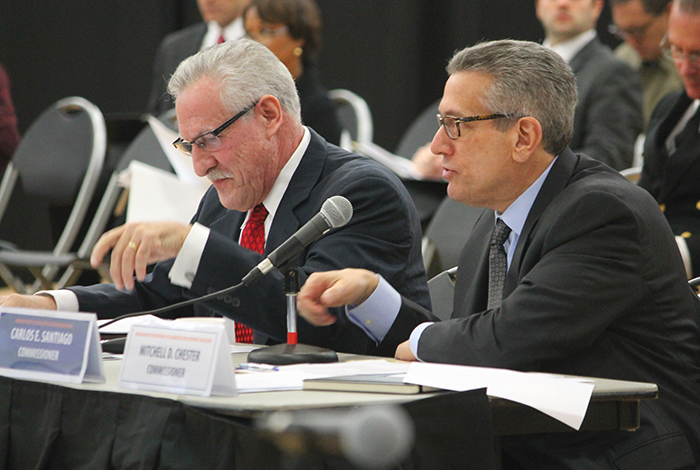
“At the Department of Higher Education we are deeply saddened to learn of the passing of ESE Commissioner Mitch Chester,” said Higher Education Commissioner Carlos E. Santiago. “The staffs of our respective agencies have been steadily increasing their collaboration to help students transition more easily and successfully from high school to college, most recently by planning a new ‘early college’ initiative to allow high school students to earn credit for college coursework. Across the state, our colleges and universities are growing their partnerships with K-12 districts to make sure that students are prepared to succeed in post-secondary education, work that was embraced by Commissioner Chester and me. I know firsthand how deeply committed Mitch was to the success of every child. The best way for us to honor his legacy is to continue building our inter-agency and community-based partnerships to help students realize their dreams.”

The Department of Higher Education’s Office of Student Financial Assistance (OSFA) will move from its current location in Revere to a new office location in Malden effective next week, Higher Education Commissioner Carlos E. Santiago announced today. The office will close for business effective noon on Thursday, May 18 and reopen for business on Monday, May 22. During the office move, no official business or public correspondence regarding state grants, scholarships or tuition waivers will be conducted.
The new offices opening next week will be located at 75 Pleasant Street in Malden, in the same building that houses the Massachusetts Department of Elementary and Secondary Education, as well as the Executive Office of Education’s IT and HR departments. It is a short walk from the Malden Center MBTA stop on the Orange Line, as well as the Commuter Rail station and multiple bus routes.
“Our new location is much more accessible to the public, and our proximity to the staff at DESE will give us fresh opportunities to collaborate with our K-12 partners to improve public access to financial aid information,” said Clantha McCurdy, Senior Deputy Commissioner for Access and Student Financial Assistance. “We look forward to hosting FAFSA completion events and other activities for students and families at our new offices.”
Please update your files to reflect:
New OSFA Address: 75 Pleasant Street, Malden, MA 02148
New OSFA Fax: (617) 391-6085
Telephone numbers and email addresses for all OSFA employees will remain unchanged.
Complete information on Massachusetts scholarships, grants and tuition waivers, as well as college affordability tools and resources, are available on the DHE OFSA website.
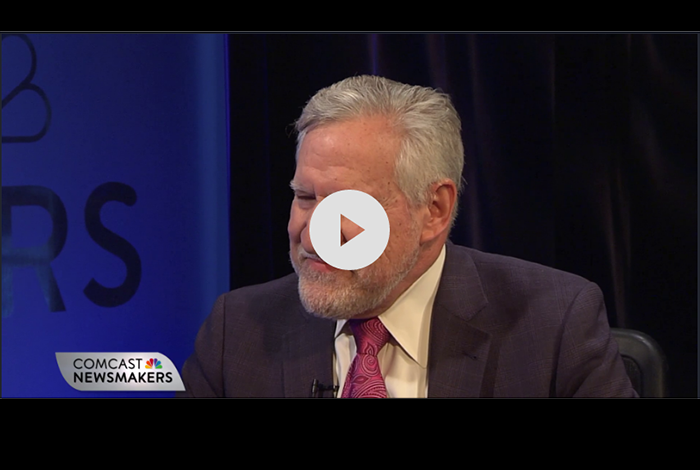
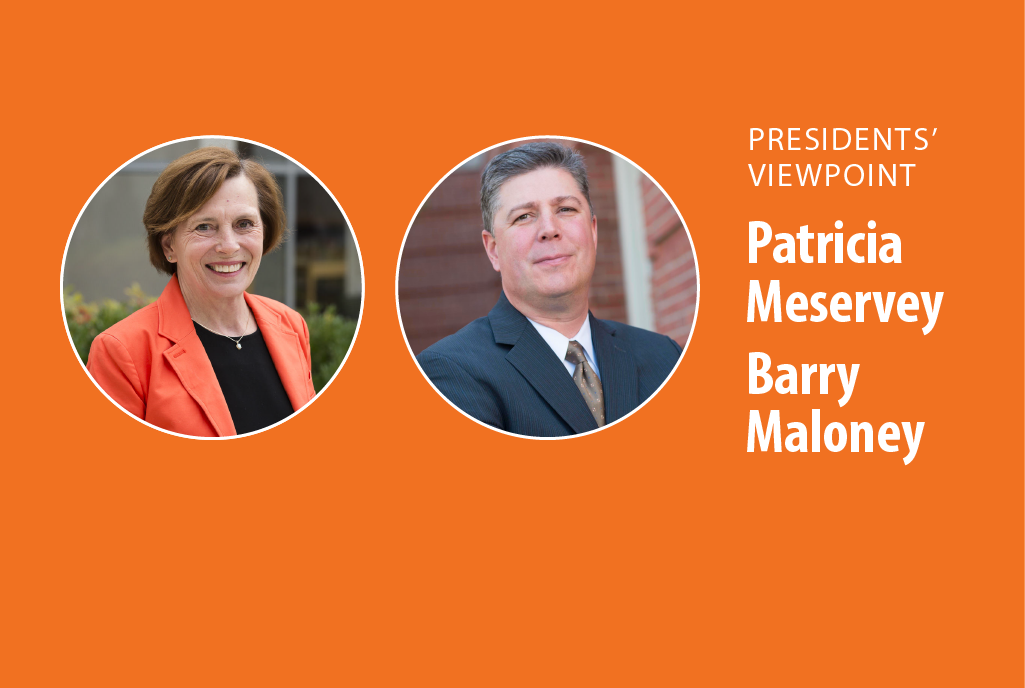
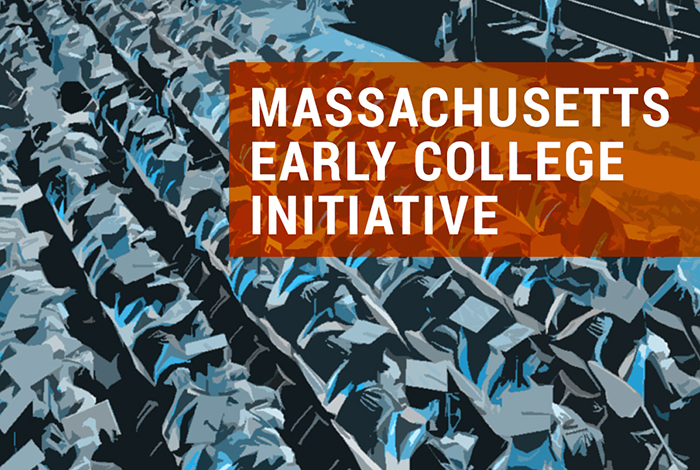
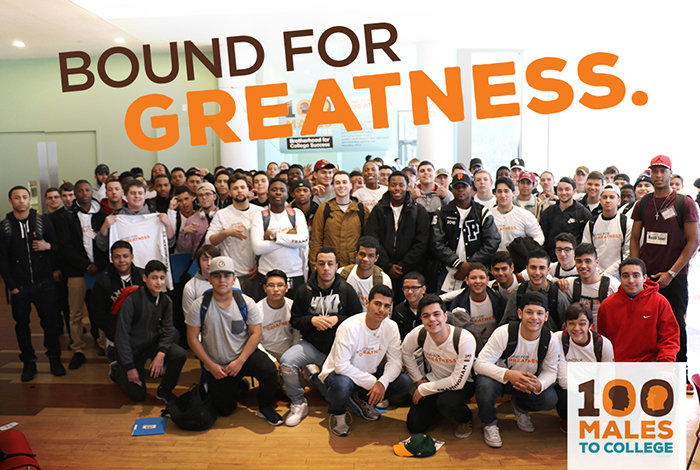
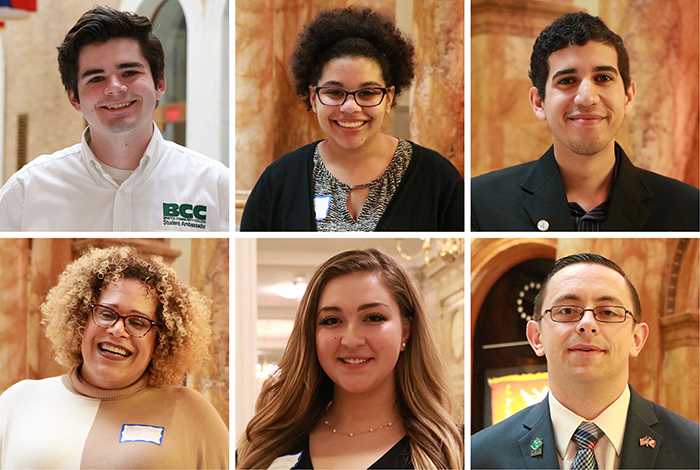
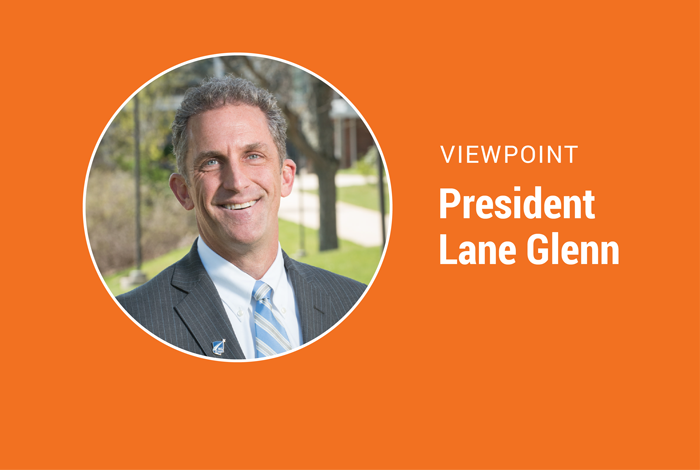
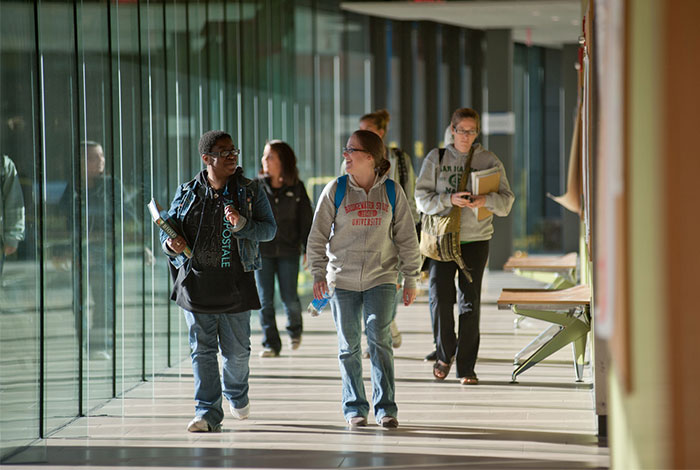
Boston, MA – February 23, 2017 – A select group of Massachusetts state universities and community colleges have been awarded a total of $1.25 million dollars through the Department of Higher Education’s Performance Incentive Fund to drive innovation throughout the public higher education system, the Baker-Polito Administration announced today. The largest share of the funds, totaling $695,000, will be used to launch new programs to allow high school students to take college courses before graduating from high school.
Exposing high school students to college-level material and allowing them to earn credit for their work is a worthy investment in both our students and future workforce,” said Governor Charlie Baker. “The Performance Incentive Fund grants will help our public higher education system continue its important development of highly skilled and educated workers.”
Bridgewater State University, Bunker Hill Community College, Mount Wachusett Community College, Westfield State University and Worcester State University received the college access grants. All of the campuses plan to use the funds to improve the college-going rates of students typically under-represented in higher education, including African American and Latino students, low-income students, and those who will be the first in their family to attend college. National research demonstrates that students who take college courses before graduating from high school are more likely to avoid expensive, non-credit remedial coursework in their first year of college and to go on to earn associate and bachelor’s degrees, rather than dropping out before finishing their studies.
“These grants support the broader workforce development efforts of the Baker-Polito administration,” said James Peyser, Secretary of Education. “The programs they make possible constitute important elements in our strategy to offer high quality career pathways to our young adults and give them a solid foundation for college and career success.”
“These programs are among the smartest educational investments we can make,” said Carlos E. Santiago, Commissioner of Higher Education. “Every indicator demonstrates that exposure to college helps high school students build the self-confidence and the skills they need to succeed at the post-secondary level. I was very pleased to see a high degree of creativity imbedded in the campus proposals, which will strengthen the pathways from high school to college.”
Bridgewater State will team with Massasoit Community College and the Brockton Public Schools to create a 100 Males to College program for Brockton teens who will benefit from the opportunity to take college-level courses and engage in family outreach activities. A separate but similar 100 Males to College program will be launched in Central Massachusetts, where Worcester State will work with Quinsigamond Community College and the Worcester Public Schools to bring college-level courses and post-secondary success strategies to male students at area high schools.
Bunker Hill Community College will team with the University of Massachusetts Boston and the Chelsea Public Schools to create an intensive professional development program for educators focused on “culturally relevant and inclusive practices,” and will also work to align the curriculum between Chelsea High and Bunker Hill.
Mount Wachusett Community College will adapt science, technology, engineering and math (STEM) programs for students from Fitchburg and Leominster who are non-STEM majors.
Additionally, Performance Incentive Fund grants were awarded to four campuses working to tackle academic challenges that often hinder degree completion.
Northern Essex Community College will join with Middlesex Community College to develop innovative “competency-based pathways” that align accreditation standards, core competencies and courses taken by early childhood educators.
Berkshire Community College, Bristol Community College, and North Shore Community College and will each be awarded grants to develop “co-requisite” course models designed to reduce the number of students placed into non-credit remedial classes. Co-requisite models offer an alternative approach to remediation; a student who is not fully prepared for college-level work receives supplemental academic instruction and support while also taking a for-credit course, in lieu of the typical requirement to take the remedial course first.
>> FY17 Performance Incentive Fund Grants [PDF]
Photo courtesy Bridgewater State University
.png)

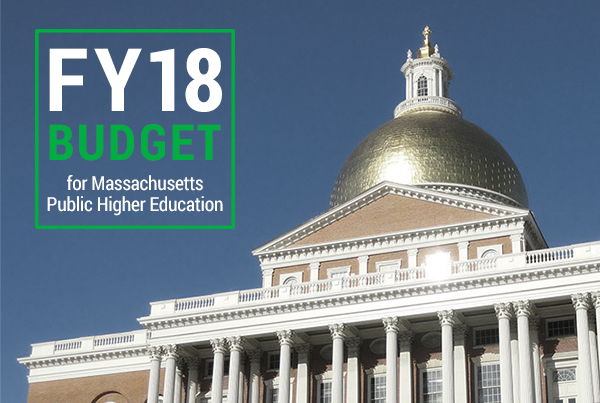
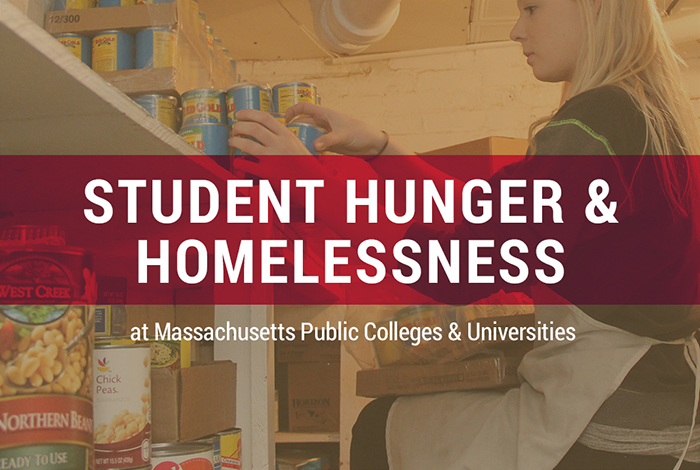

Bridgewater, MA – January 24, 2017 – Today the Board of Elementary and Secondary Education (BESE) and Board of Higher Education (BHE) voted unanimously to adopt a joint resolution to prioritize and advance the early college efforts in Massachusetts, including the creation of an Early College Joint Committee. Early college high schools are schools that combine the traditional high school experience with the opportunity to earn significant college credit on an intentional pathway in a rigorous, highly supportive environment.
The Boards affirmed their shared commitment to helping students attain the knowledge, skills and abilities needed to succeed in college and careers, be engaged citizens and lead productive and fulfilling lives. The Boards recognized that early college programs that allow high school students to experience and complete college level academic work and reduce the time and expense of earning a college credential can be a powerful tool to achieve the Commonwealth’s overall goals for educational achievement.
“The joint resolution adopted by the boards today is part of the Baker-Polito Administration’s larger strategic efforts to strengthen career pathways, including more opportunities for students to engage in early college programs, and to ensure students are on a path to succeed in school, in their careers, and in life,” said Secretary of Education Jim Peyser. “Today the members of both boards expressed our appreciation to Parthenon-EY and the Barr Foundation, the members of the Steering Committee, and the Working Group, and look forward to the Early College Joint Committee’s recommendations in helping us build a scalable statewide early college initiative.”
“For all students, particularly first-generation and those traditionally underrepresented in postsecondary education, early college is an opportunity to engage in college-level work, develop a deeper understanding of the college experience, and get a jumpstart on their college degree,” said Chris Gabrieli, Chairman of the Board of Higher Education. “We are pleased to work with schools and communities to help create new programs to support students in early college and through high-quality career pathways by 2018.”
“We are proud that local school districts, postsecondary institutions, and non-profit organizations across the Commonwealth have pioneered early college models and promoted their expansion for many years,” said Paul Sagan, Chairman of the Board of Elementary and Secondary Education. “Early college programs can help improve high school graduation and college completion rates, and allow students an opportunity to experience career-related activities in a high-demand field or industry.”
“Massachusetts has traditionally focused on high performance and academic standards, and I am thrilled that we are now also addressing at a statewide level how high skills apply to a variety of careers,” said Nancy Hoffman, Senior Advisor, Jobs for the Future, and Chair of the Board of Higher Education’s Academic Affairs Committee. “We’ve learned lessons from around the country and are now able to build best-in-class early college programming.”
The joint resolution approved today established a 5-member Early College Joint Committee comprising the chairs of the BESE and BHE or their designees, an additional member of each board designated by the chairs, and the Secretary of Education, to oversee the development of a process for designating Massachusetts Early College Schools, working with both commissioners and departments to develop a process for reviewing, approving, overseeing, and evaluating applicants for the new designation as well as helping to guide the growth of the effort. A full proposal will be brought back to both boards for final approval by June 30, 2017.
The Early College Joint Committee is charged with designing, developing and coordinating the administration of a Massachusetts Early College program based on the process and key design principles set forth in Massachusetts Early College Schools. In January 2016, the Board of Elementary and Secondary Education and Board of Higher Education met together to discuss the topic of early college programming and to better understand the entire spectrum of early college models found throughout the Commonwealth. One result of the meeting was a joint expression of interest from BESE and BHE to further explore the early college landscape in Massachusetts. Through the support of the Barr Foundation and partnership with Parthenon-EY, a joint steering committee and working group was charged with exploring the role that early college pathways could play in helping improve college access and postsecondary completion in Massachusetts.
Parthenon-EY presented their initial findings to BHE in September 2016 followed by a presentation at the BESE’s December 20, 2016 meeting. The report, entitled Breaking Down Silos to Put Students on the Path to Success: The Promise of Early College in Massachusetts, was also discussed at today’s joint board meeting. The Parthenon-EY report highlights a number of advantages to the state’s use of early college high schools as a means of improving college access and postsecondary completion, particularly for first-generation college students, including the strategy’s alignment with state goals, the strong foundation of local early college programs, and the ability to achieve improved outcomes at reasonable costs.
This effort is consistent with a broader parallel initiative to define and develop high quality career pathways, for which the Commonwealth has just received a $2 million grant from the Council of Chief State School Officers and JP Morgan Chase.



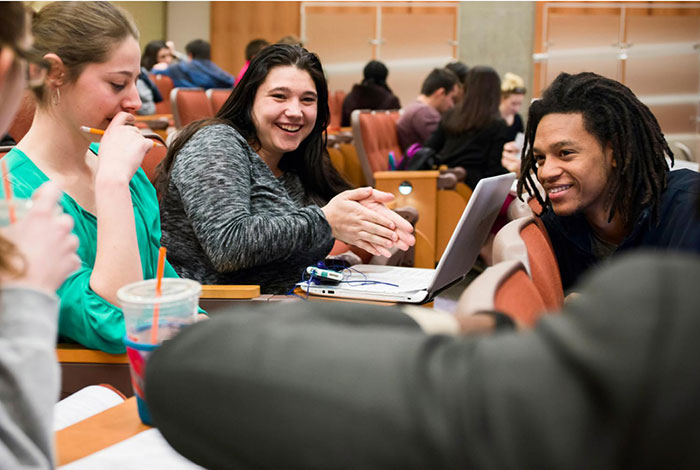
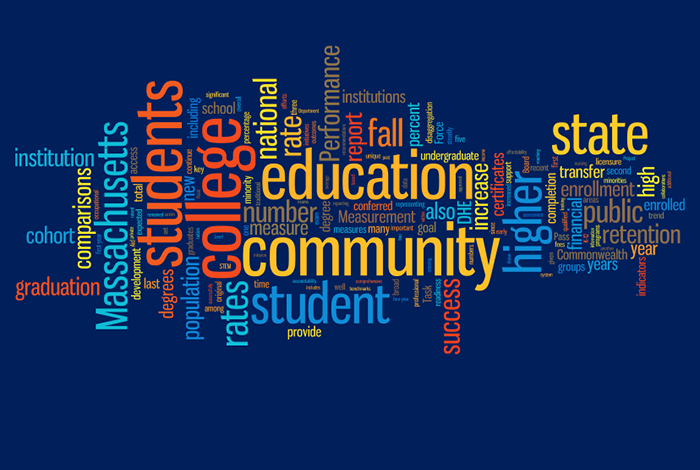
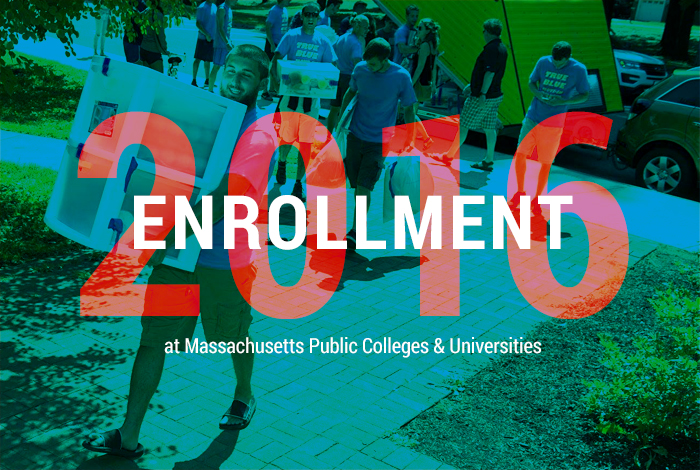
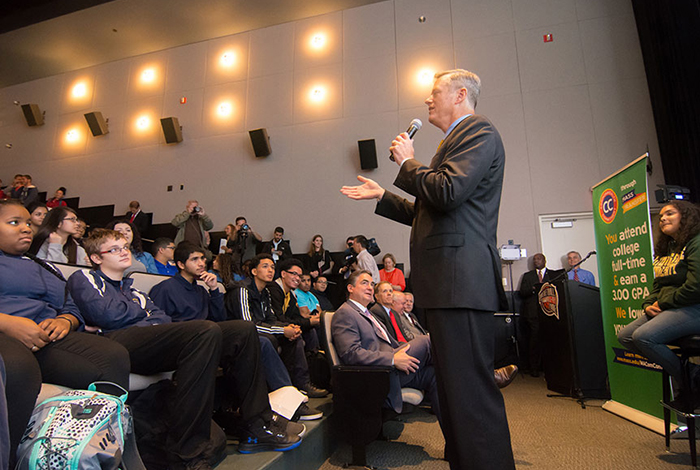

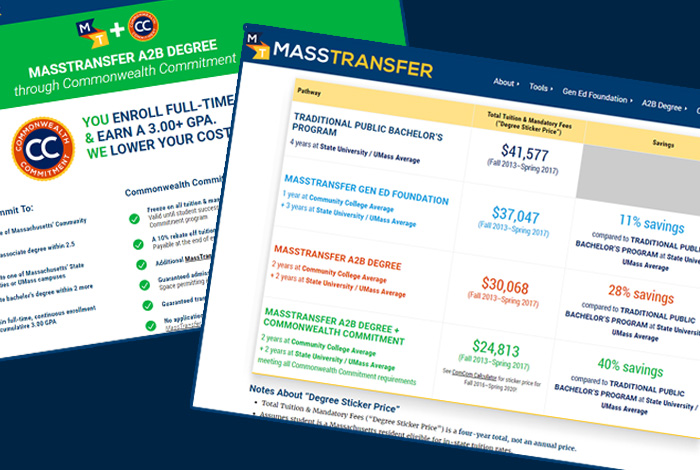
Boston, MA – September 6, 2016 – Starting today, Massachusetts students and families have access to a new, full-service web portal that will allow them to explore a wide range of academic offerings at the state’s public colleges and universities and chart a course to an affordable bachelor’s degree through transfer from a community college to a state university or University of Massachusetts campus, the Baker-Polito Administration announced today.
The new MassTransfer web portal will, for the first time, allow the Commonwealth’s high school and college students to identify and compare a wide range of degree programs, transfer options, and college costs at all twenty-eight public undergraduate campuses. They will be able to see what is required to transfer seamlessly between campuses, including course-by course “degree maps” available for some majors. They will also be able to use a savings calculator to find the typical savings associated with earning an “A2B” – associate to bachelor’s – degree. The portal’s features also include a detailed description of the three different transfer options available to students, a course-to-course equivalency database to allow them to see exactly how various course credits will transfer, and an additional tool to view cost savings associated with an A2B degree earned through the Commonwealth Commitment program, announced in April by Governor Baker, Lieutenant Governor Polito, and the leaders within public higher education.
“This new online tool will save students valuable time and money while completing their degrees, and I hope that many students take advantage of the Commonwealth Commitment as early as this fall,” said Governor Charlie Baker. “Our colleges and universities are critical partners in ensuring a strong workforce pipeline and through this new program, it will be even easier for students to take the classes and earn the degrees they need to succeed.”
“The national research is clear that even a few hundred dollars can make a powerful difference in whether students stay on the path toward college completion or leave school because they cannot afford to continue,” said Lieutenant Governor Karyn Polito. “We are thrilled to offer the students in our Commonwealth substantial savings off an already great deal on college credentials.”
“I am grateful to the leadership of all three segments of public higher education and the Department of Higher Education for stepping forward and collectively creating the Commonwealth Commitment to ensure we make college as affordable and transfers as seamless as possible for all students.” Education Secretary Jim Peyser said. “What’s incredible is that the savings a student will see in this new online tool could be even greater than what’s listed, with the addition of scholarships and other financial aid awards, which can lower the cost of an associate and bachelor’s degree even further.”
“With college costs identified as a chief barrier to college completion, we knew we needed a more seamless, efficient system to allow students to transfer from one campus to another and graduate in a more timely and cost-effective manner,” said Carlos E. Santiago, Commissioner of Higher Education. “The new MassTransfer portal provides all the information students need to complete their academic journey without delay and added debt. I think many students will be pleasantly surprised by the academic excellence, diversity of degree programs and affordability available at each of our public campuses.”
Through the Commonwealth Commitment program, students who enroll full-time at one of the state’s 15 community colleges will be able to transfer to a state university or UMass campus and graduate with a bachelor’s degree in one of a number of select programs. They must maintain a 3.0 cumulative grade point average and graduate in no more than four and a half years. Students in the program will realize substantial savings off the “total sticker price” of a traditional bachelor’s degree, qualifying for a freeze in tuition and mandatory fees, 10% per-semester rebates, and a full tuition credit in their last two years of school worth an average of $1200.

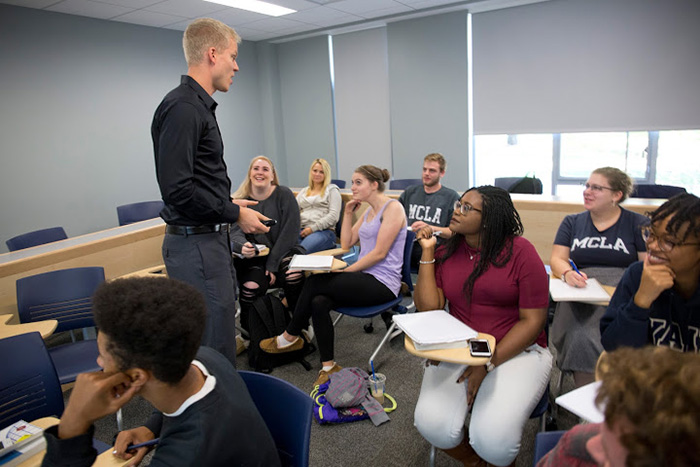
Boston, MA – August 29, 2016 – Just in time for the start of a new academic year, the Massachusetts Department of Higher Education has awarded $910,000 in individual grants to 22 public colleges and universities to expand opportunities for high school students to get a jump start on college.
Grants funded through the Commonwealth Dual Enrollment Partnership (CDEP) will allow students to take free or low-cost college courses at local campuses and, in some cases, attend classes taught on location at their high schools or on line. CDEP students earn college credit toward an associate or bachelor’s degree, often saving thousands of dollars in the process. Along with cost savings, research shows that dual enrollment courses help prepare students for the rigor and expectations of college-level work, making the experience especially valuable for 1st generation students and economically disadvantaged students who may not have access to college preparatory experiences and opportunities. In Massachusetts dual enrollment students who enroll in community colleges are 50% less likely to require developmental (remedial) classes compared to their peers who had not taken a dual enrollment course.
“We are thrilled to be able to help these students earn college credit as they start to develop their career pathways,” said Education Secretary Jim Peyser. “Dual enrollment is an important part of our administration’s broader commitment to expanding early college experiences.”
“As a new academic year begins, we want to open the dual enrollment doors as wide as possible, serving as many students as we can,” said Carlos E. Santiago, Massachusetts Commissioner of Higher Education. “We know that this experience is a game-changer for young people, especially those who come from families where no one has attended college before. The program also strengthens the partnerships between high schools and local colleges, allowing for meaningful collaborations that support student success.”
Last year, CDEP funding provided for the enrollment of slightly more than 2,000 students. This year’s projected enrollment is 3,380. The primary goal of the fiscal year 2017 funding is to “increase dual enrollment of underrepresented students, which may include first-generation college students, low-income or economically disadvantaged students, students of color, and particularly male students of color.”
The following colleges and universities are among those chosen to receive funding:
The University of Massachusetts Boston will give students in Boston and Quincy an opportunity to enroll in a 2-semester course sequence, allowing them to adjust to college-level math work in the familiar setting of their own high school before taking a second course at the UMass Boston campus.
Fitchburg State University will expand its partnerships with area high schools to include Leominster High School, and will offer courses to groups (cohorts) of students in the late afternoon and on Saturdays to accommodate their schedules.
The Massachusetts College of Liberal Arts will partner with the city of Pittsfield and Berkshire Community College to create a summer academy for students who will earn up to six college credits.
Bristol Community College, which annually serves the largest number of dual enrollment students in the state, will include early college awareness activities, campus visits and financial aid workshops to raise the college aspirations of the students in Fall River and New Bedford, communities which have some of the lowest educational attainment levels in the U.S. for cities of their sizes.
Holyoke Community College will launch a new, three-tiered College Now program for sophomores, juniors and seniors at targeted local high schools. The college is one of 44 institutions participating in the U.S. Department of Education’s experimental pilot to allow use of Pell grants for dual enrollment coursework and related expenses.
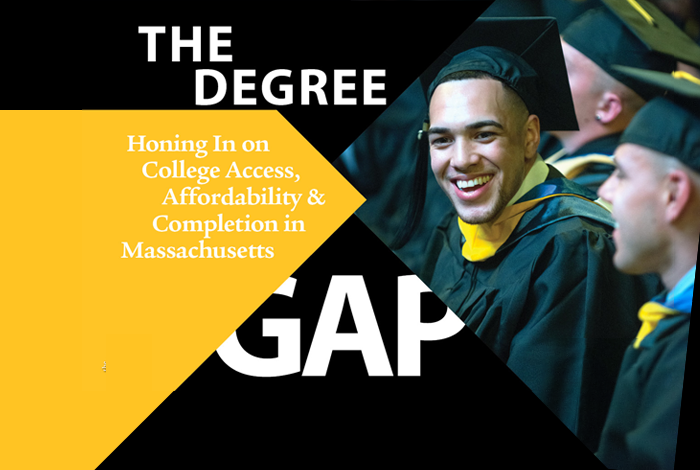
Boston, MA – June 8, 2016 – The rate at which Massachusetts residents earn college degrees will pivot from growth to decline by 2022 unless the state’s public higher education system, which educates more than half of all undergraduates, is able to increase the number of students who enroll and earn diplomas, the Massachusetts Department of Higher Education reported today.
The Degree Gap, the Department’s annual Vision Project report on the status of public higher education in the Commonwealth, was released at an event held at The Boston Foundation this morning. The report suggests that employers who are already having difficulty meeting current workforce needs in high-demand fields will face even greater challenges in the next few years, as the state’s high school population continues to decline at the same time that an estimated 660,000 college-educated workers plan to retire. Of those job openings requiring post-secondary education or training, two-thirds will require a college degree. Increasingly, the higher education system will also be called upon to leverage its traditional role of offering associate’s and bachelor’s degrees by also offering certificate and continuing education programs to ensure that students develop career skills needed to be successful. The demographic challenges facing the state mean that public colleges and universities are likely to fall short of meeting the need for new associate and bachelor’s degrees by 55,000 to 65,000. The Degree Gap predicts that 80% of those “missing” degrees needed to fill the state’s talent pool in the next decade will be at the baccalaureate level or higher.
“The Degree Gap highlights important issues our Commonwealth must address to prepare our workforce to fill jobs which are currently going unfilled, and help employers find skilled employees in the future,” said Lieutenant Governor Karyn Polito. “It’s clear we need more degree earners and certificate program graduates, including those in the critical STEM fields, and I am pleased our administration has already taken steps to start tackling these challenges.”
“Studies have shown that the vast majority of Massachusetts job openings in the next decade will require a degree or certificate beyond high school, and our administration is working hard to expand training and educational opportunities,” said Secretary of Education Jim Peyser. “The higher education system is a critical partner in helping our students and workers meet the needs of our changing economy, and we are focusing on ensuring they are prepared to succeed in college and in their careers.”
“The Degree Gap affirms that the state’s public higher education system must redouble its efforts to help more students earn college credentials, especially those from underrepresented communities who are much less likely to earn degrees,” said Carlos E. Santiago, Commissioner of Higher Education. “I will urge the leadership of our system to focus on what we are calling ‘The Big Three’ priorities for the coming academic year: making college more accessible and affordable, closing achievement gaps, and improving completion rates.”
The report’s findings align with several recent economic forecasts that project that a lack of available talent may constrain economic growth. Although the Commonwealth has more adult degree-holders than any other state—51.5 percent of adults ages 25–54—the state is projected to end the decade with fewer working age college-educated residents than it began with unless the rate of degree production improves.
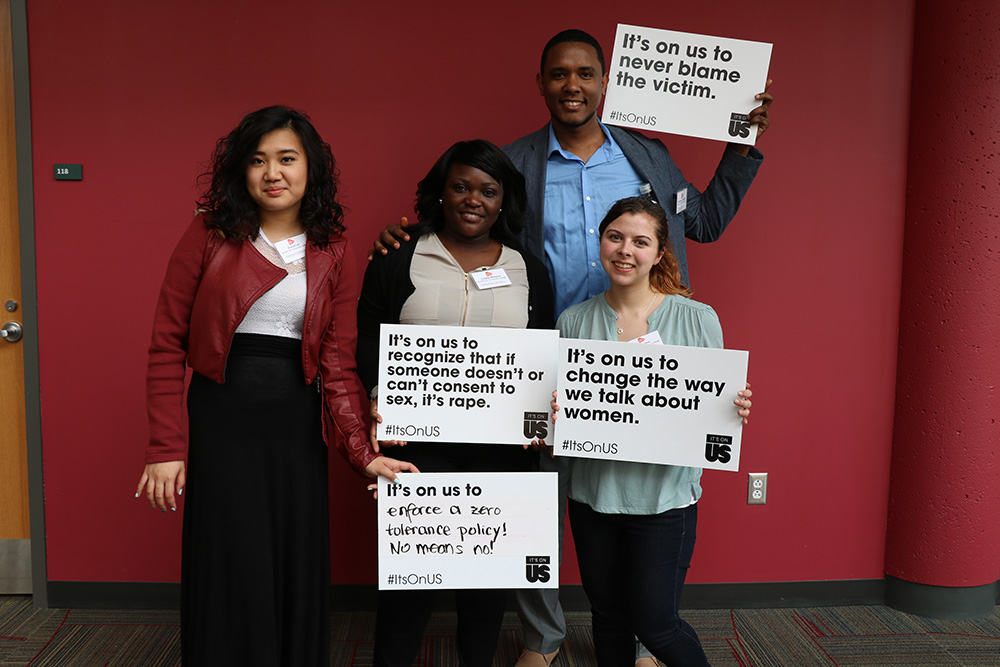
On Wednesday, September 28, 2016, the Massachusetts Department of Higher Education, Executive Office of Public Safety & Security, and Attorney General’s Office will jointly present “Securing Our Future: A Statewide Campus Safety and Violence Prevention Conference.” The conference is intended to raise awareness of the findings and recommendations of the Board of Higher Education’s recent task force on campus safety and violence prevention, and to focus on a systemic approach to addressing campus safety and violence through governance, planning, protocols and communication. It will feature:
This event, to be held at the DCU Center in Worcester, is open to representatives of public and private colleges and universities including campus police officers, Title IX coordinators and campus administrators who work in this area. Invitations were sent to campus presidents. If you would like to attend, please contact your president directly.
Massachusetts colleges and universities have made significant strides in their efforts to improve campus safety since 2008 when the Board of Higher Education first ordered a review, but will need to continue to develop new safety protocols and trainings due to heightened concerns about sexual violence, active shooters and other emerging threats. Securing Our Future: Best Practice Recommendations for Campus Safety and Violence Prevention, a 120-plus page report prepared by TSG Solutions, Inc. was presented to the Board of Higher Education at Worcester State University in June 2016. In formally accepting the report, the BHE directed the Commissioner of Higher Education to work with campus leaders to coordinate implementation of the recommendations and help secure necessary resources.
The document does not offer a one-size-fits-all prescription for improving campus safety, but puts the focus on the need for “nimble and flexible capabilities” that allow campuses to integrate safety and violence prevention efforts into strategic planning, budgeting and other ongoing priorities addressed by campus leaders.
“I thank the Department of Higher Education and the statewide task force members who came together to bring their expertise to bear on the important report on campus safety and violence prevention,” said Lieutenant Governor Karyn Polito, Chair of the Governor’s Council to Address Sexual Assault and Domestic Violence. “I am proud that Massachusetts has taken the lead as the first state to order a comprehensive review of campus safety, which includes both active shooter threats and the prevalence of sexual violence, for all its public campuses.”
“The report makes clear that strong local governance and better statewide coordination are essential to building a safe foundation for teaching and learning,” said Carlos E. Santiago, Massachusetts Commissioner of Higher Education. “We cannot divorce campus safety concerns from academic or student affairs. I am pleased to see the level of progress that has been made to date, and am indebted to our team of consultants for identifying the need for a holistic and systemic approach to violence prevention in our campus communities.”
“We know that one in four or five female undergraduates are sexually assaulted while in college, underscoring the urgency of this particular issue,” said Dena Papanikolaou, general counsel to the Department of Higher Education. “The status quo is unacceptable. I believe we have a moral obligation to promote the safety of students and staff on all of our campuses.”
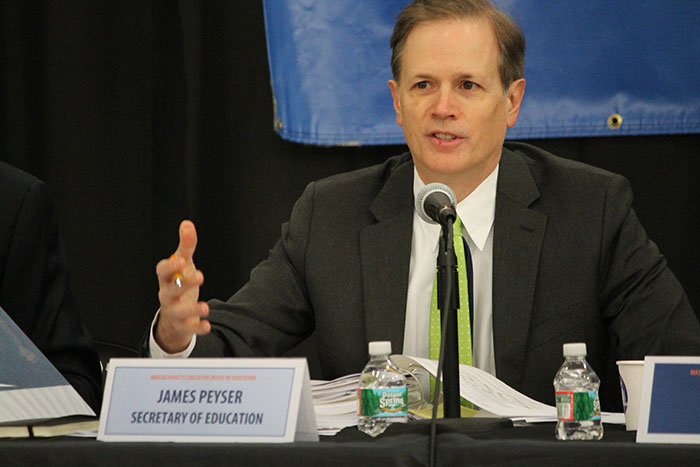
Worcester, MA – June 14, 2016 – The Massachusetts Board of Higher Education voted today to amend the leave policies for non-unit professionals (NUPs) at the state’s fifteen community colleges and nine state universities in an effort to better align such policies with those governing University of Massachusetts employees, public higher education systems in other New England states, and Massachusetts state employees. The changes will impact approximately 1650 employees.
The Board voted to eliminate the current policy allowing employees to convert unused vacation days into sick time. Going forward under the new policy, any vacation days that remain over a 64-day balance would be forfeited by the employee if not used. The 64-day vacation balance would be reduced over the next two and a half years to a maximum of 50 days that can be “carried” by an employee.
Additionally, the Board voted to:
“These changes will bring our employment policies for non-unit professionals at community colleges and state universities into alignment with those in place at the University of Massachusetts, at public colleges and universities across New England, and for state employees,” said Higher Education Commissioner Carlos E. Santiago, who ordered an expedited review of the policies in March. “They will allow us to remain competitive with other institutions in our bid to attract top talent, while also making good on our commitment to be effective stewards of state resources.”
In addition to the policy changes approved by the Board, the Department of Higher Education staff will continue to offer training opportunities for local boards of trustees and will distribute “best practice” materials for their use in overseeing presidential leave time. Presidents will be expected to regularly report their leave time to their campus board chair, and additionally, to provide an annual summary of their leave to the Commissioner of Higher Education as part of the presidential evaluation process.
The Board also approved a separate policy that prohibits campus boards of trustees from entering into contractual agreements with outgoing or former presidents without the approval of the Commissioner of Higher Education. The motion spells out a series of guidelines for trustees to follow in considering such post-employment contracts and reaffirms current BHE policy, which states that “no sitting state university or community college president shall be offered a severance agreement involving compensation to be paid subsequent to the time he/she no longer performs the duties of president.”

Boston, MA - May 9, 2016 –The Massachusetts Department of Higher Education today announced the Class of 2016 winners of the 29 Who Shine awards, the Commonwealth’s annual ceremony honoring one graduate from each community college, state university and University of Massachusetts campus. The awards highlight students’ individual achievements and contributions of the civic and economic well-being of the Commonwealth, resulting from their collective efforts and public investment in their education.
Today’s ceremony, taking place at 12 noon at the Massachusetts State House, will be attended by Governor Baker, Senate President Stan Rosenberg, Education Secretary Jim Peyser, UMass President Marty Meehan, chancellors, state university and community college presidents, students and family members. The Massachusetts Maritime Academy 7th Company Marching Band will also perform at the ceremony.
Each one of Massachusetts’ 29 public college and university campuses selected its own honoree for the 29 Who Shine awards based on criteria established by the Department of Higher Education. Students are required to be state residents who have strong academic profiles and a record of civic engagement.
"Lieutenant Governor Karyn Polito and I congratulate all 29 of the 2016 award recipients and thank them for their substantial contributions to their campuses and local communities," said Governor Charlie Baker. "Each of the 29 Who Shine honorees represent our future citizenry and workforce and have already made a positive impact on the Commonwealth.”
“It’s exciting to see how this exceptional group of student leaders have chosen to put their brainpower and civic engagement to work in so many different ways that benefit our state -- through STEM, through the arts, and through teaching, and medicine,” said Secretary of Education Jim Peyser. “We wish all of them well in their next steps, whether in their careers or additional scholarly pursuits.”
“Each of these students is a shining example of what our public higher education system can produce,” said Carlos E. Santiago, Commissioner of Higher Education. “The outstanding students on this year’s list of 29 Who Shine honorees have come from many countries and overcome many obstacles. I am so proud of what they have achieved and look forward to seeing how they continue to put their talents to work on behalf of us all.”
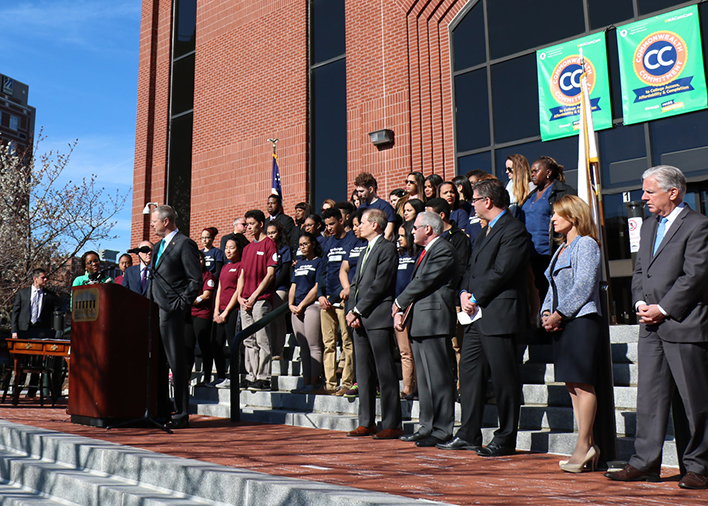
Governor Charlie Baker and Lieutenant Governor Karyn Polito joined public higher education leaders today to announce the Commonwealth Commitment, an innovative college affordability and completion plan to help more students achieve the dream of a college degree.
The Commonwealth Commitment commits every public campus to providing 10% rebates at the end of each successfully completed semester to qualifying undergraduate students, in addition to the standard MassTransfer tuition waiver received upon entering a four-year institution from a Community College. Students who meet the program requirements will, depending on the transfer pathway they choose, be able to realize an average savings of $5,090 off the cost of a baccalaureate degree.
This plan is the first agreement of its kind in the nation and was signed by University of Massachusetts President Marty Meehan, Worcester State University President Barry Maloney and Middlesex Community College President James Mabry, representing the three segments of the public higher education system, and Higher Education Commissioner Carlos E. Santiago at a ceremony held this morning at Middlesex Community College.
As part of the Commonwealth Commitment’s goal to increase cost savings and predictability, tuition and mandatory fees will be frozen for program participants as of the date they enter the program. Students will begin their studies at one of the state's 15 community colleges, enrolling in one of 24 Commonwealth Commitment/Mass Transfer Pathways programs that will roll out in fall 2016 (14 programs) and fall 2017 (10 additional programs). They must attend full-time, and must maintain a cumulative GPA of 3.0. After earning an associate's degree in two and a half years or less, students will transfer to a state university or UMass campus to earn a baccalaureate degree.
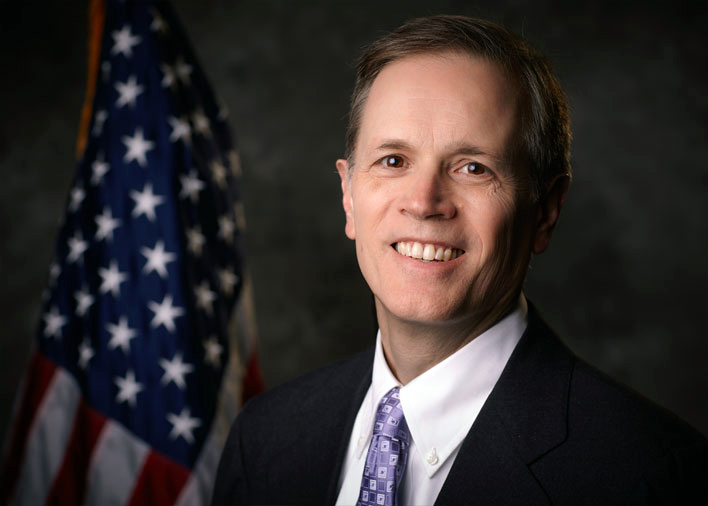
Peyser: Number one: College access and success, which includes students being ready for college-level work.
Peyser: Dual enrollment and Vision Project Performance Incentive Grants would be two examples. The Governor’s budget proposes doubling our investment in dual enrollment from $1 million to $2 million. What we’re trying to do is not simply increase the number of students taking advantage of the existing dual enrollment program but rather focus those additional resources on strengthening early college programs, where our public colleges work with cohorts of students, rather than individual students, especially in the STEM fields. We want to build or expand on existing relationships with high schools, and in particular, focus on those students who are under-represented in college. We are still working out the details of that expansion initiative, so stay tuned. Similarly, the performance management grants available to our public colleges and universities are supporting system-building initiatives, like the creation of common course offerings to ensure that students can transfer credits earned at one public college to any other college in the system.
Peyser: Affordability. One of major reasons students don’t finish college is because of money. This is a knotty problem, because the cost of higher education—in both public and private schools here in Massachusetts and nationally—seems to be on conveyor belt that’s moving higher and faster than inflation. No one has yet figured out how to change the trajectory or bend the curve.
So even though we need to keep working on efficiency measures that produce real savings, it’s clear we need to add a new focus on creating alternative pathways through college that are at a significantly lower cost. I’m very encouraged by the work that the campuses and the Department of Higher Education have been doing on a more affordable four-year degree option and I expect we’ll have an announcement on that new program soon.
And there are other approaches like three-year degrees, or more aggressive use of online competency-based programs that can be delivered at much lower costs, approaches that not only reduce the overall cost of completing a degree, but also make it possible for students to do it faster and on a flexible schedule that meets their unique needs.
Peyser: A four-year residential experience is not for everyone, regardless their economic circumstances. Moreover, we simply cannot afford to address the college access challenge through construction of new buildings. The fact is we have billions of dollars in deferred maintenance for the buildings we already have. Pretending that we can address the challenge of college access and affordability by expanding our bricks and mortar campuses is simply an expensive mirage, which would likely have the effect of putting a college degree even further out-of-reach for working class students. If we are going to get more people access to higher education and get them the credentials and skills they need to be successful, we are going to have to come up with alternative ways of doing that. Online education is not a silver bullet, but it is an increasingly promising path for some students – and not just because it’s cheap. And frankly, the world is moving in this direction. Massachusetts will be left behind if we don’t move with it.
Peyser: My observation is that communication and collaboration happens quite a bit on an ad hoc or programmatic basis, but not systemic. As a result, we are not adding as much value as we are capable of and we are wasting resources. At the same time, we are making it harder for students to navigate their own unique paths through our higher education and workforce development system. Deepening the regional integration of our college campuses and strengthening their connections to K-12 and local employers is a top priority of the Governor’s Workforce Skills Cabinet.
Peyser: True, but what’s frustrating is that if you go to any college, they will tell you about all of their partnerships with K-12 and employers. Then if you go to the surrounding schools and the employers and ask them about their relationships with the local community college or state university, too often you get blank stares. That says two things to me:
First, a lot of the partnerships are transactional or episodic, without much buy-in or engagement at the institutional level. That means that these relationships often lack a real strategic purpose and therefore miss the opportunity to add greater value.
Second, in any given region, you might have three or four different colleges, each with their own separate relationships with the same businesses or industry sectors. This piecemeal approach can be confusing to employers and wasteful to the colleges. One of the things Springfield Technical Community College (STCC) and Holyoke Community College (HCC) are doing through their Training and Workforce Options program is to say, we are serving the same region so let’s work together to develop employer partnerships as a team. That means that if there’s a business in the hospitality industry you direct them to HCC’s culinary arts program, and if you have a partnership with an advanced manufacturing firm, you point them toward STCC. What STCC and HCC are doing demonstrates how campuses can merge their resources in a way that allows us to maximize the value of the assets we have, increase the number of strategic partnerships, and simplify the network of relationships between higher education and employers.
Peyser: The highly decentralized structure we have means we need to place a premium on communication, collaboration, and integration. Is it a barrier? It doesn’t make it easy, but we hope that it provides the opportunity to have the best of both worlds: day-to-day decision-making that is close to the ground and regional or statewide coordination to leverage the distinctive strengths of each campus. Given the proximity of these institutions to one another, and the fact we are a pretty small state anyway, it is actually quite possible for us to be networked tightly, especially within regions.
Thinking regionally also relates to the capital budget. One of challenges that I have in my role as an advisor to the Governor with respect to the capital budget is being able to rank order campus proposals for capital funding. Unfortunately, we have many more construction proposals than we have capital funds to support them, so we have to make some tough choices in the near term and probably over the next several years, as well. I am hopeful that this constraint will encourage and enable the campuses within the various regions of the Commonwealth to work more closely together to align and integrate their strategic plans in order to make the best use of the Commonwealth’s limited resources.
Peyser: The new regional planning process that is being launched as we speak is intended to be bottom up. Starting in this fiscal year, we are providing resources and support for the campuses to get together in each region to look at each other’s strategic plans and to think about their programs and priorities in order to align and integrate them more effectively. Where it makes sense these plans might bring pieces together or enable campuses to divide and conquer to make sure they are not duplicating efforts. To the extent they are able to maximize the use of existing resources, we might be able to avoid investing in bricks and mortar when we don’t have to. Those regions that put forward the most compelling and coherent plans that take maximum advantage of their collective assets will certainly have a leg up when it comes to allocating the capital budget in the future.
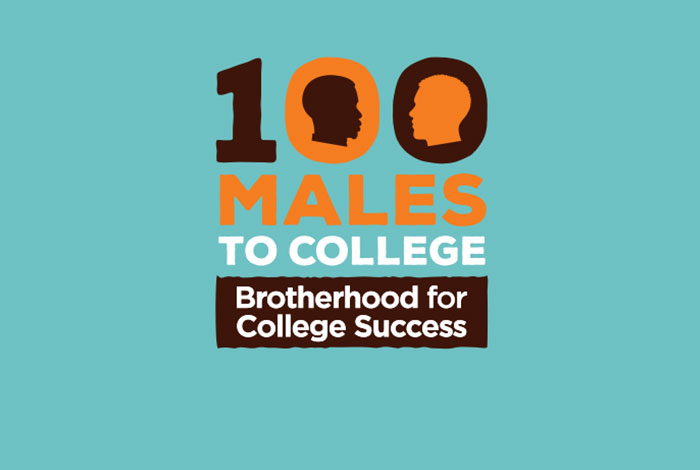
A new statewide initiative aimed at closing the opportunity gap among male students by partnering local school districts, community organizations and public colleges will launch on Friday, February 26, 2016 at Framingham State University.
100 Males to College will provide a comprehensive support structure to a cohort of 100 young male students to help them successfully graduate from high school, gain entry to college and earn a post-secondary degree. The support structure is an asset-based youth development model that embraces culture, identity and community.
One hundred male sophomore and junior students from Framingham High School and Keefe Tech have been identified and selected to participate in the program, which is funded by the Massachusetts Department of Higher Education. The students will meet at Framingham State University’s McCarthy Center (100 State Street, Framingham) at 8:30 a.m. on Friday, February. 26th, for a special kickoff event with Department of Higher Education Commissioner Carlos Santiago, Framingham State University President F. Javier Cevallos, MassBay Interim President Yves Salomon-Fernandez and representatives from other community partners.
"We're launching 100 Males to College programs here in Framingham and in communities across the state because we need all students, regardless of race, gender or economic status, to see college as an essential part of their future," said Carlos E. Santiago, Commissioner of Higher Education for the Commonwealth. "At a time when Massachusetts employers face critical shortages of college graduates, it is both an economic imperative and a matter of social justice that we help more young men achieve the dream of a higher education and the chance to pursue a career of their choice."
“Every child deserves the same opportunity to attend and succeed in college,” said Framingham State President F. Javier Cevallos. “These students represent the future for their communities, which is why we are so excited to take part in this important initiative.”
“Achievement gaps are generally outcomes of opportunity gaps,” said MassBay Community College Interim President Yves Salomon-Fernandez. “This collaboration reflects the strength of the regional partnership among the vocational/technical and traditional K-12 school districts, two-year and four-year higher education partners in MetroWest.”
Other partners in the program include the MetroWest College Planning Center, MetroWest Boys and Girls Club, Metrowest YMCA, Jewish Family Services and Chyten Test Prep and Tutoring Framingham.

I want to highlight a serious issue we are presently grappling with in this country: what is known as the “educational divide,” or the differences experienced by those with a postsecondary degree and those without one. Our students understand the importance of earning these degrees, and many of them are also aware of the public benefits that flow from a highly educated citizenry and workforce. At campus visits this year I have faced the following question from students: “If the state benefits from us earning degrees, why don’t our colleges get more funding?” The answer I provide to such questions comes in the form of a history lesson.
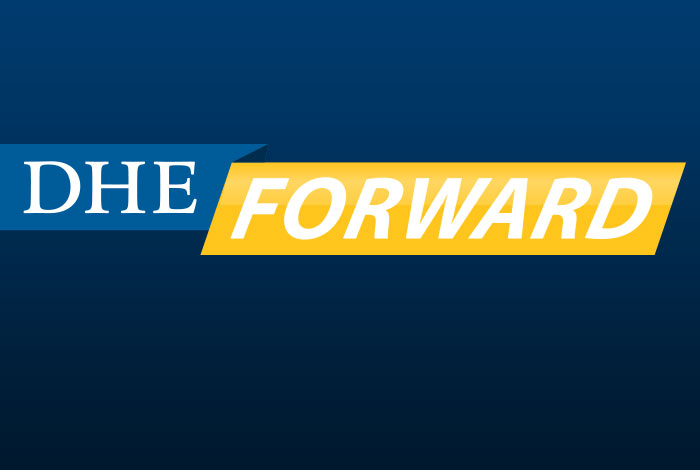

At its first meeting of the 2014-15 academic year, the Massachusetts Board of Higher Education declared a “zero tolerance” for sexual violence, including “stalking, dating violence, domestic violence, harassment and sexual assault, which can have devastating effects on individual victims, as well as serious negative consequences for colleges and universities.”
The zero tolerance statement was a follow-up to a 2008 campus violence prevention initiative which included the establishment of a campus safety and violence prevention work group. With the assistance of a consultant, the work group conducted a study and prepared a report entitled, Campus Violence Prevention and Response: Best Practices for Massachusetts Higher Education (June 2008).
The 2008 best practices document, though a solid document for its time, has its shortcomings. Drafted in the wake of the Virginia Tech shooting, it focuses almost exclusively on active shooter violence and does not fully address campus sexual violence, including the risks of assaults of minors on campus.
The Massachusetts Department of Higher Education (DHE) has now issued an RFP for consultant services to support an assessment of existing state policies and procedures on campus violence prevention and response. Working with a Campus Safety and Violence Prevention Task Force, the consultant will make recommendations to help enhance public and private higher education institutions’ efforts to properly identify, prevent, and respond to campus violence, with a special focus on campus sexual violence.
PHOTO: A poster from the “UMatter at UMass” campaign encouraging students to learn to be “active bystanders” who take action early—before a situation escalates—to help ensure the safety of their own campus.
.jpg)
Massachusetts’ public colleges and universities are expanding their outreach to students experiencing food insecurity, according to the results of an informal campus survey conducted by the Massachusetts Department of Higher Education (DHE).
With mobile food markets, vouchers good for free meals in the dining hall and the establishment of both on and off-campus food pantries, the state’s community colleges, state universities and University of Massachusetts campuses are stepping up their assistance to students in need, the Department’s second annual questionnaire on student food insecurity shows.
“I am very proud to see faculty, staff and fellow students mobilizing on campuses across the state to assist students, especially during this holiday season,” said Carlos E. Santiago, Massachusetts Commissioner of Higher Education. “Even during the busy end to the fall semester, we are seeing our campus communities conduct food drives and stock pantry shelves to support students at risk of going hungry.”
Results of the 2015 DHE questionnaire on food insecurity showed that 25 of Massachusetts’ 28 community college, state university and University of Massachusetts undergraduate campuses have opened food pantries or have begun to direct students to nearby off-campus food pantries, up from 19 campuses in 2014. Twelve campuses have begun tracking the use of food pantries to gauge whether food insecurity is a growing problem. Additionally, 20 campuses answered “yes” when asked “Are you aware of any homeless students enrolled at your campus?” Thirteen of those campuses said the number of homeless students was on the rise in 2015.
“This qualitative information from our campuses is important for us to track, as it has implications for our work to improve students’ academic outcomes,” Santiago said. “We cannot expect to students to excel in their studies or graduate on time if they are experiencing hunger or homelessness.”
In addition to food pantries, a number of campuses said they were expanding other types of non-academic support services to meet student needs. Anecdotal accounts from campus staff indicated that some students, trying to curtail loan debt, may be forgoing meal plans as they try to curb living expenses.
“We call this ‘the new normal’ in the student support arena,” said Shirley Fan-Chan, Director of the University of Massachusetts Boston Office of Urban and Off-Campus Support Services (U-ACCESS) and Chair of the Massachusetts Post-Secondary Homeless Students Network. “This new generation of students is working to support themselves and going to school full-time, but the cost of living has increased for them and in order to pay their bills, something must be compromised. Too often, that ‘something’ is food or shelter.”
Photo courtesy Massasoit Community College
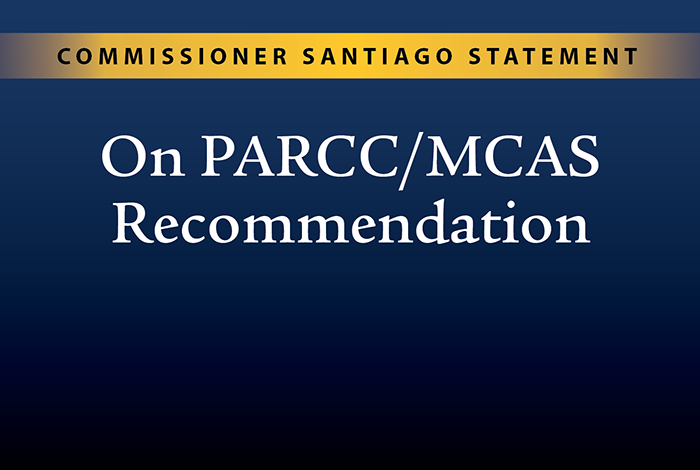
November 17, 2015 – Boston, MA
Statement of Higher Education Commissioner Carlos Santiago on Board of Elementary and Secondary Education Vote to Create “Next Generation” Student Assessment Program:
As Commissioner of Higher Education in Massachusetts I am pleased to commend Commissioner Chester and the Massachusetts Board of Elementary and Secondary Education on today’s vote to begin work on a next-generation, computer-based assessment program that builds on the best elements of both PARCC and MCAS. Today’s vote reflects our shared commitment to college readiness and the depth of higher education’s involvement in the PARCC assessment work.
Speaking before the Board of Elementary and Secondary Education last month, I reiterated that, since 2008, higher education has been deeply involved in all aspects of this collaborative process to advance readiness for college and careers for all high school graduates. Far too many Massachusetts high school graduates begin their college experience in non-credit developmental (remedial) education, which represents a broken system for many students, some of whom fail to move forward into credit-bearing coursework.
A new, jointly developed and adopted college readiness assessment, together with our shared definition of college and career readiness, will not eliminate the need for remediation but will send a clear message of what constitutes college knowledge, skills and practice. Together they will also drive more rigorous instruction, allow us to addresspersistent “readiness gaps” in high school and most importantly, provide a pathway into entry level credit-bearing college coursework for high school graduates.
Our public colleges and universities will continue to contribute expertise through both theK-12 and higher education Technical Advisory Committees and Expert Review Panels to assist inmoving the Commonwealth toward its goal of administering a next-generation assessment that is squarely focused on academic success for all studentsbeyond high school.
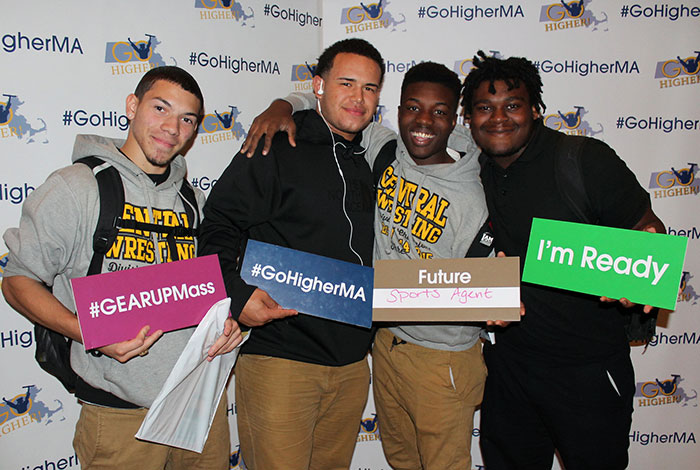
October 28, 2015 – Springfield, MA – The Massachusetts Department of Higher Education’s GEAR UP college access program announced today that it is spearheading a statewide effort to increase the number of college applications from Massachusetts students in low-income and underrepresented communities, with the goal of helping 5,000 students submit at least one college application before the end of the calendar year.
GEAR UP is partnering with the Massachusetts Educational Financing Agency (MEFA) and Your Plan for the Future, Massachusetts’ public college planning portal, to provide staff and volunteers, college admissions representatives and financial aid counselors to help students at more than a dozen high schools apply to the college of their choice. Students will get assistance at workshops and tutorials held throughout the school day. GEAR UP Director Robert Dais announced the statewide application drive at the Basketball Hall of Fame in Springfield, where he hosted the Department of Higher Education’s “Go Higher!” event to promote opportunities at the state’s 28 public undergraduate campuses. At the event, which included a student speaker program and an admissions fair, students from Springfield and Holyoke High Schools had the chance to apply for on-the spot acceptance to Springfield Technical Community College and Holyoke Community College.
“At ‘Go Higher!’ events across the state, we are reaching 1st generation students who may feel that college is not for them,” said Carlos Santiago, Commissioner of Higher Education. “Our message is that in Massachusetts, where brainpower is our most precious resource, every student needs to develop a plan for education after high school.”
GEAR UP, a federally funded program, provides support for the college-going process and scholarships worth up to $4,000 in East Boston, Holyoke, Lowell, Lawrence, New Bedford, Springfield, and Worcester. In addition, GEAR UP is bringing the Massachusetts College Application Celebration to Athol, Chicopee. Fitchburg, Ludlow and Monson, with more communities expected to join.
“Whether applying to a two-year or four-year college, a public or private university, we know that students need and deserve help with their applications,” said Robert Dais, GEAR UP MA Statewide Director. “We see too many seniors begin the application but then get stuck, especially those students who do not have outside support. Our Massachusetts College Application Celebration is a real community effort, with so many folks from different organizations stepping up to help students ‘Go Higher’ in their journey beyond high school.”
"GEAR UP, you changed my life by helping me apply to college,” wrote Lauren Brouillard, a graduate of the New Bedford High School Class of 2014 who applied to and is now enrolled in the pre-med program at the Massachusetts College of Pharmacy and Health Sciences. “As I begin my pre-med studies to pursue my dream of becoming an anesthesiologist, I would like to thank you for helping me and believing in me.”
![]() Download the complete list of Massachusetts College Access Celebration event.
Download the complete list of Massachusetts College Access Celebration event.
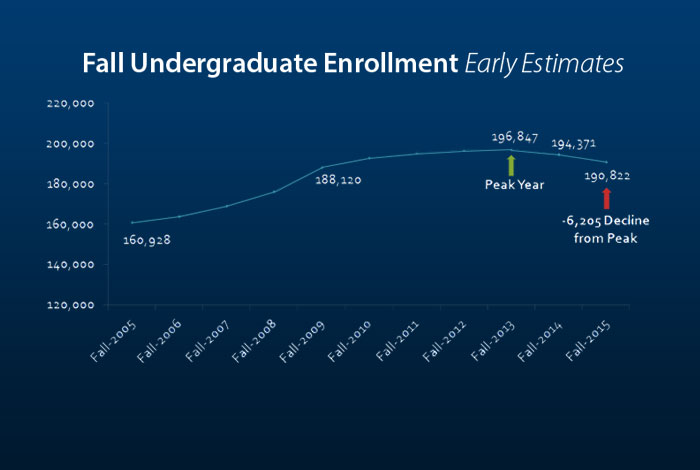
October 27, 2015 -- Fall River, MA -- A new enrollment report presented today to the Massachusetts Board of Higher Education shows that overall undergraduate enrollment at the Commonwealth's public colleges and universities has declined by 1.8% since fall 2014, while increasing at three University of Massachusetts campuses and at one state university.
The Fall 2015 Early Enrollment Report, based on enrollment estimates provided by 28 public undergraduate campuses, shows an overall 4.3% decline in open enrollments at the state's community colleges in the last year (representing a loss of 4,181 students); a slight 0.8% decline at the nine state universities (representing a loss of 320 students) and a 1.7% increase in overall enrollments at the four undergraduate campuses of the University of Massachusetts (a gain of 952 students).
Massachusetts is one of fifteen states located in the Northeast and upper Midwest whose populations of high school students are projected to shrink by more than five percent within the next eight years. Many of the community college enrollment declines correspond to population losses in certain regions of the state, such as Cape Cod and the Berkshires.
"These enrollment trends are part of a boom-to-bust cycle that is normal and reflective of both demographic changes and economic trends," said Carlos Santiago, Commissioner of Higher Education for the Commonwealth. "Still, the overall enrollment dip does give us cause for concern because the Commonwealth is already experiencing significant shortages of college-educated residents needed to fill jobs in high-demand fields. With a shrinking high school population and looming retirements, we will need to work harder and smarter to increase the pool of potential college graduates in the coming years."
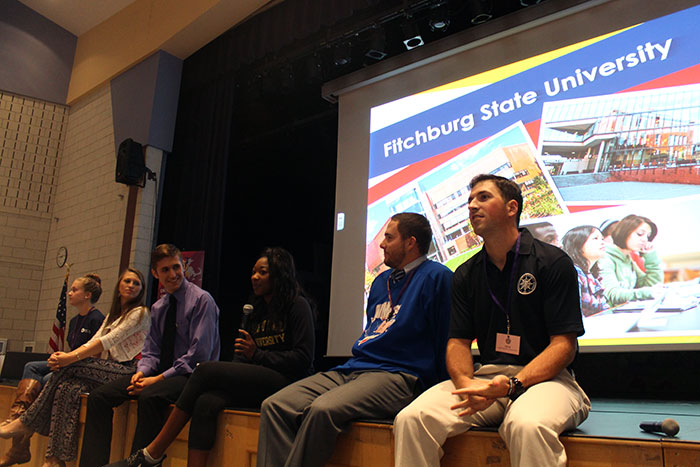
Fitchburg, MA – September 24, 2015 – Education Secretary Jim Peyser today joined Higher Education Commissioner Carlos E. Santiago and students from across the state’s public higher education system to remind high school seniors that beginning next fall, four years of high school math - including math taken during the senior year - will be required for admission to any state university or University of Massachusetts campus.
The new minimum standard for admission, approved by the Massachusetts Board of Higher Education in 2011, will apply in 2016 to all in-state and out-of-state applicants hoping to attend any of the four UMass undergraduate campuses or nine state universities. Freshman applicants will be required to complete Algebra I and II, Geometry or Trigonometry, (or comparable coursework), and must complete a mathematics course during their senior year. A two-year Algebra I course will be counted toward the fourth-year math requirement; a Pre-Algebra course will not. The new minimum admissions standards do not apply to the community colleges, which use “open” admissions and enrollment policies.
There are no state-level requirements to complete a particular sequence of academic coursework in the Commonwealth; such mandates are set by individual districts. According to a recent survey by the Massachusetts Department of Elementary and Secondary Education, 65.7% of Massachusetts school districts do require four years of mathematics for all students, while the remaining one-third of districts do not.
Additionally, beginning in fall, 2017, all students applying for admission to a UMass campus or a state university will need to have three years of science, including at least one lab science, in addition to four years of math. Computer science courses may be credited as a science or math elective, according to the new standards, “based on the inclusion of rigorous mathematical or scientific concepts and topics.”
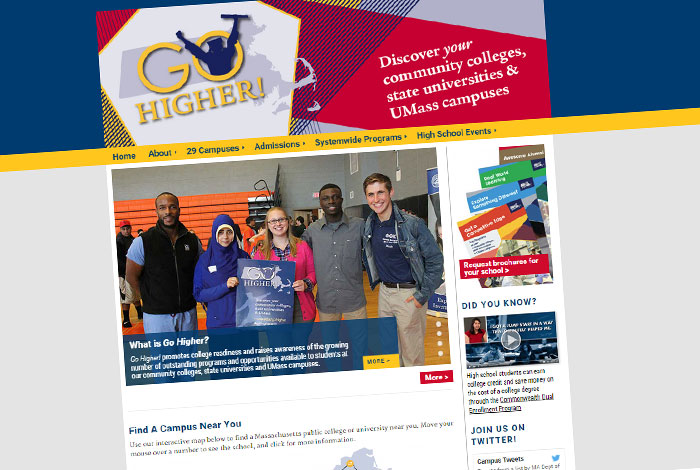
Boston, MA – September 9, 2015 – The Massachusetts Department of Higher Education is launching a new campaign to promote student access and awareness of opportunities across the public higher education system, with a slate of events for high school students and a new web site to help them prepare for college and career choices after high school.
The “Go Higher!” campaign reminds students that by 2020, 72% of the jobs in Massachusetts will require some post-secondary education. At high school events across the state, students from the University of Massachusetts, state universities and community colleges will speak directly to more than 8,000 high school students to share their experience choosing a college and a major, adjusting to campus life, and preparing for careers through internships and research opportunities.
“I am really excited about the chance to present my experience as a community college honors student moving on to a four-year university,” said Micah Klayman, a graduate of Quinsigamond Community College who has transferred to Worcester State University to earn his bachelor’s degree. “What I really want high school students to know is that our public colleges and universities are not only affordable but also amazing places for students to grow as leaders and scholars. After my experience, I am steadfast in that belief.”
The campaign was developed in accordance with Massachusetts General Laws Chapter 15A, Section 5, which mandates the Board of Higher Education to conduct “a sustained program to inform the public of the needs, importance and accomplishments of the public institutions of higher education in the Commonwealth.” It is produced by the Department in collaboration with the GEAR UP college access program and the 29 campuses of the public higher education system.

BOSTON, MA – September 3, 2015 – As nearly 300,000 students return to Massachusetts' community colleges, state universities and University of Massachusetts campuses this week, the Department of Higher Education (DHE) awarded $2.4 million in competitive grants to increase access to college by students across the Commonwealth.
Twenty-five campuses were awarded grants through the Commonwealth Dual Enrollment Partnership(CDEP) to expand the state's dual enrollment programs, which allow high school students to take college courses and earn credit for free or at a reduced cost. CDEP funding increased from $750,000 in FY15 to $1 million in FY16. The DHE has set a goal of increasing dual enrollment from 2,000 to 3,400 students and is using a new dual enrollment video, outreach to high schools, and social media to promote opportunities on campuses.
Also awarded were Vision Project Performance Incentive Fund (VP-PIF) grants to support partnerships aimed at increasing the college-going and college completion rates of under-represented, low-income and first-generation students. Seven campuses were awarded a total of $500,000 in new funding, with continuation grants going to 16 additional campuses to support ongoing projects.
“Increasing collaboration between high schools and higher education is important to making a college education more affordable and creating more opportunities for students across the Commonwealth to succeed in college and their careers,” said Governor Charlie Baker. “These awards also present opportunities for college campuses and their regional partners to focus creatively on boosting college completion rates and advancing more students from diverse and underserved populations.”
"Together, our competitive Dual Enrollment and Performance Incentive Fund grant programs help growing numbers of students realize the dream of obtaining a college degree," said Commissioner of Higher Education Carlos Santiago. "It is terrific to see UMass, state university and community college faculty and staff working together and also with local school districts to widen the pathways from high school to college. This is at the core of the mission of public higher education, which is to strengthen Massachusetts families, communities and industries by educating our future citizenry and skilled workforce.”
Photo courtesy Bunker Hill Community College
Get in Touch
(617) 994-6950
One Ashburton Place, Room 1401,
Boston, MA 02108
Inquiries & Complaints
DHE Staff Directory
Campus Directory
Who We Are
Department of Higher Education
Commissioner Noe Ortega
Board of Higher Education
Public Colleges & Universities System
Board Business
Upcoming Meetings
Past Meeting Materials
Policy & Report Library
Quick Links
Commission on Higher Education Quality and Affordability (CHEQA)
Free Community College
Tuition Equity
Advisory Council to Advance Representation in Education (ACARE) Report
Eastern Nazarene College (ENC) Closure
Institutional Transitions & Closures
Public Notices of Financial Assessment
MassTransfer
SARA
©2000-2026 Massachusetts Department of Higher Education. All Rights Reserved.